|
跨越国界的心灵之桥——马西莫·英特罗维涅在生命禅院第二家园之泰国分院的访问
戒镜草
(Edited by ChatGPT)
2025年9月27日的夜晚,清迈机场迎来了一位远道而来的学者——马西莫·英特罗维涅(Massimo Introvigne)。他是社会学家、律师,《寒冬》(Bitter Winter)杂志主编,前欧洲安全与合作组织(OSCE)代表,负责打击针对基督徒和其他宗教成员的种族主义、仇外心理、不容忍和歧视。
在这位年逾古稀的老人身上,我看到的并非学者的疏离与高冷,而是一位长者的谦卑与慈和。他带着深切的关怀而来,愿意倾听,愿意提问,愿意交流。他与我们分享的不仅是学术的知识与经验,更是心灵的感悟与生命的智慧。
9月28日下午,他抵达生命禅院第二家园泰国分院。短短三日,却像是一场灵魂的交汇。他的问题细致而深邃:关于中国境内的突袭,关于护照与难民身份的困境,关于人口贩卖的误解,关于孩子的教育,关于第二家园经济发展的道路与未来的希望。作为一位资深律师,他以冷静而清晰的逻辑,为我们剖析风险与挑战;作为一位温厚的智者,他以柔和而慈悲的心,讲述他所见过的类似群体的遭遇。他提醒我们:所谓“真相”与“邪教”,常常在权力的叙事中被颠倒;而真实的痛苦与呼声,却需要有人用耐心与勇气去倾听。
这三天,仿佛是一盏明灯照亮前路,也像一面镜子,让我们看见自身的处境与力量。
在交流中,泰国分院的亲人们逐一回应。他们坦诚讲述当年在中国遭遇的突袭与审讯,也分享在第二家园里重新找到的宁静与喜乐,更表达了对未来既满怀信心又保持谨慎的态度。Massimo 专注倾听,频频点头。时而沉思,时而动容。他提到,自己曾见证过许多因信仰而遭受迫害的群体——法轮功、全能神、维吾尔人……然而,在这里,他看见的是另一种力量:一种不怨、不怒,却依然坚定而柔韧的生命力。
9月29日的交流更为深刻。他谈及人口贩卖与社会保险的问题,关心孩子们的教育与成长。他提醒我们,在外界的眼中,任何形式的集体生活都有可能被误解为“人口贩卖”,因此更需要以文明、透明与合法的方式,去展现我们的纯洁与善意。谈话间,他还谈起海外华人的生活与婚姻现象,指出在功利与劳累之外,人们更渴望心灵的抚慰——而这,或许正是生命禅院能够触动人心的原因。
9月30日,离别的日子悄然到来。他问起我们对撒旦的理解,问起千年界、万年界与极乐界的修行,问起我们对世界末日的看法。我们回答:我们相信,人类的未来将属于生命禅院时代,而第二家园正是通往新纪元的桥梁。
临别前的一场歌舞晚会,为他的访问画下最温暖的注脚。歌声悠扬,舞姿轻盈,亲人们亲手做的月饼与饺子,溢满真挚的情意。
9月30日下午,离别的时刻到来。他与泰国分院的亲人们一一拥抱,眼神中满是依依不舍。直到送他登机时,他才深情地说:“我不知道该如何表达我的感谢,这真的是一次动人的访问。”
那一刻,告别与感恩交织,温暖在心间久久回荡。他的来访,不只是一次学术上的观察与记录,而是一场灵魂的相遇——一位长者与一群追寻者,共同见证了信仰与生命的力量。
我相信,这次访问只是序章。未来,Massimo 将倾心撰写两篇关于生命禅院与第二家园的报道,让更多人感受到我们的生活与信仰之光。同时,他也提到,一位远方的加拿大女同事将踏上前往加拿大分院的旅程,采访雪峰导游,将我们的故事继续传递,飘向更远的心灵彼岸。
Bitter Winter 的故事:马西莫·英特罗维涅的分享
Bitter Winter was born in 2018—not out of ambition, but out of disillusionment. After thirty years of dialogue with Chinese authorities, countless visits, and tireless efforts to advocate for religious liberty, I came to a painful realization: the conversations were not bridges, but traps. They served not to enlighten, but to legitimize propaganda. So, with a handful of steadfast friends, we chose a different path. We founded a magazine—not to theorize, but to testify. Bitter Winter would tell the real stories of religious persecution in China, stories that others dared not publish.
Our strength then, as now, lies in the courage of citizen journalists inside China. These brave souls send us rare and irreplaceable material—videos, photographs, and reports that pierce the veil of censorship. We were the only media outlet to receive footage from inside the concentration camps of Xinjiang, and to document the destruction of the colossal cliff-carved Guanyin statue in Hebei in 2019 (see the video https://bitterwinter.org/worlds- ... e-demolished-video/) These images reverberated across the globe, picked up by the BBC and major American networks. They also ignited fury in Beijing. More than forty individuals were imprisoned in China for the “crime” of sending information to Bitter Winter.
The irony was not lost on the Chinese authorities. They asked, with thinly veiled contempt, how a magazine published by private citizens in Italy had become the primary source for China in the U.S. State Department’s annual reports on religious liberty. But the answer was simple: truth travels farther than power.
In our early days, we dreamed big. Bitter Winter was published in eight languages, including Chinese. Every editor and reporter was a volunteer. Yet dreams have costs. We faced expenses for publishing, for cybersecurity, for defending ourselves against relentless hacking attempts. Translation alone was a financial mountain. Initially, we were sustained by donations from Chinese expatriates, but in 2020, the twin storms of COVID and the National Security Law in Hong Kong made such support a legal risk. Donations dwindled. By 2021, we had to scale back—publishing only in English, though we added an international section to our Chinese coverage.
Still, we grow. Six days a week, we publish two articles—one on China, one on the rest of the world. On Sundays, we rest. The Chinese government, however, does not. They produced a film against us—entirely fabricated, of course—claiming we inflict great damage and must be backed by U.S. intelligence. They alleged we employ “only 100 people.”
In truth, we are just three. None of us are paid.
But we are rich in conviction. Bitter Winter is not merely a publication—it is a witness, a resistance, a voice for those silenced. And as long as there are stories like yours that must be told, we will continue to tell them.
中文翻译:
Bitter Winter 于2018年诞生——不是出于野心,而是在漫长追寻后的醒悟中诞生。在与中国当局三十年的对话、无数次拜访,以及不懈地呼吁宗教自由之后,我痛楚地明白:那些谈判不是桥梁,而是陷阱;它们不是启迪心灵,而是为宣传披上合法的外衣。于是,我与几位坚定的朋友选择了另一条道路——创办一份杂志,不为议论,而为作见证。Bitter Winter 将讲述那些真实的宗教迫害故事——那些被沉默覆盖、被世界忽视的声音。
无论过去还是现在,我们的力量都源自那些身处中国的公民记者的无畏勇气。这些勇敢的灵魂将珍贵而独一无二的资料送到我们手中——视频、照片与报道,如同穿透审查重幕的光芒。我们是唯一记录新疆集中营内部影像的媒体,也是唯一留下2019年河北巨型悬崖观音雕像毁灭瞬间的见证者。(见视频 https://bitterwinter.org/worlds- ... e-demolished-video/)这些画面在世界范围内激起强烈回响,被BBC及美国主要媒体转载。同时,它也点燃了北京的怒火。因向Bitter Winter 提供信息,已有四十余人在中国遭到囚禁。
中国当局并未忽视这份讽刺。他们带着难掩的轻蔑发问:一份由意大利私人公民创办的杂志,为何能成为美国国务院年度宗教自由报告中关于中国的主要信息来源?而答案却简单而明了:真相,比权力行得更远。
在创办之初,我们怀揣远大的梦想。Bitter Winter 曾以八种语言与世界对话,其中亦有中文的声音。每一位编辑与记者,都是不求回报的志愿者。然而,梦想从不轻盈,它有着沉重的代价。我们面对出版的开销、网络安全的重负,以及源源不断的黑客攻击。仅翻译的费用,就如一座巍峨的财务高山。最初,我们依靠华侨的捐助维系运作,但到2020年,疫情与香港《国家安全法》如双重风暴,将这份支持变成法律的风险。捐款骤减,到了2021年,我们不得不收缩篇幅——仅以英文出版,却在中文报道中增添了国际视野。
尽管如此,我们仍在成长。每周六天,我们发布两篇文章——一篇聚焦中国,一篇放眼世界。周日,我们短暂休憩,而中国政府从不眠。它们拍摄了一部针对我们的影片——当然,全然捏造——声称我们带来巨大“破坏”,并指控我们依赖美国情报机构。他们甚至宣称,我们“仅雇佣百人”。
事实上,我们仅有三人,心甘情愿地将热忱置于薪酬之外。
然而,我们的信念如潮涌般澎湃。Bitter Winter 不仅是一份刊物——它是见证,是抵抗,是为那些被噤声者竖起的喉舌。只要仍有像你们这样的故事渴望被讲述,我们就会继续将它们讲述出来。
我的感受
在他身上,我看见了学识与谦和的统一。
他是一位阅历丰富的长者,逻辑缜密,思维清晰,却又温润谦卑。
他像一位行走世界的智者,以平和的声音为我们讲述生命与世界的故事。
作为一名普通的中国女性,因着生命禅院与第二家园,我得以与一位国际知名的学者近距离交流。
这让我心怀感恩,也让我更加珍惜佛祖上帝的厚爱,以及生命禅院和第二家园所承载的价值与意义。
我深深感恩龙袍佛的大力支持,感谢仰乐院长的悉心安排,感谢千姿姐姐的默契配合。尤其让我动容的是厨师柔美姐姐——即便一根手指肿胀,她仍然仅凭一只手,完成了干净、整洁而美味的餐食。同时,我也要感谢泰国分院的所有亲人们。每一个人都在用自己的方式默默付出:有人用笑容迎接宾客,有人用心布置环境,有人细致地翻译与记录,有人悄悄守护后勤。这些点点滴滴汇聚在一起,正是我眼中第二家园精神最质朴、最动人的体现。
Massimo Introvigne 的感悟:
以下为马西莫·英特罗维涅在访问后的两篇感悟,原文英文:
感悟一:泰国家园之思
After my recent visit to the Lifechanyuan Second Home in Thailand, I feel compelled to set aside the scholar’s pen and speak from the heart. I had studied your community from afar—poring over your websites, reading the poignant testimonies of unjust persecution in China sent to our magazine “Bitter Winter” by brave citizen journalists who, for their safety, write under pseudonyms. I had also exchanged correspondence with Sister Jiejing. Yet, no amount of reading or remote dialogue could prepare me for the quiet revelations that come only through immersion.
There is a principle in social scholarship known as participant observation. It suggests that to truly understand a community, one must live its rhythms, however briefly. And so I did. In those few days, I did not merely observe—I shared meals, laughter, silence, and the subtle grace of your daily life. What I encountered was not just a worldview, but a living testament to it: a community that embraces simplicity as liberation; that meets challenges with joy; that finds fulfillment in connection.
Each person I met carried a story—some marked by hardship, others by quiet resilience—but all converging into a shared pursuit of happiness and spiritual clarity. In a world that so often equates success with material wealth and status, your peaceful community stands as a luminous counterpoint. Perhaps few will choose the path you walk. But even those of us who do not must look to you—as a mirror and a reminder.
May the Creator shelter you in peace and preserve the light you carry. You have given me more than insight—you have offered a glimpse of what it means to live with purpose.
Massimo Introvigne
Sociologist, editor of the daily magazine “Bitter Winter,” the former Representative of the OSCE (Organization for Security and Cooperation in Europe) for combating racism, xenophobia, and intolerance and discrimination against Christians and members of other religions.
中文翻译:
在我最近踏入生命禅院第二家园泰国分院之际,我心中油然而生一种冲动——暂放学者之笔,以心声表达所感。我曾从远方凝望你们的社区——细读你们的网站,倾听那些勇敢的公民记者为安全隐匿姓名而寄来的令人心碎的见证,记录着你们在中国遭受不公迫害的真实故事。我也曾与戒镜通信。然而,无论阅读多少文字,进行多少远程交流,都无法让我预见,那种唯有身临其境才能触及的宁静启示与心灵震撼。
在社会学里,有一个原则叫“参与式观察”。它告诉我们,若想真正理解一个群体,就必须亲身融入他们的生活节奏,哪怕只是短暂的时光。于是我这样做了。在那几日里,我不仅仅是观察者——我与你们共享餐食,笑声与静默,感受你们日常中那一份含蓄而细腻的优雅。我所遇见的,不只是一个世界观,而是它鲜活的体现:一个以简朴解放心灵的社区;一个以喜悦迎接挑战的社区;一个在彼此相连中寻得圆满的社区。
我遇见的每一个人都有自己的故事——有的刻满艰难与磨砺,有的流露宁静而坚定的韧性——然而,所有的故事都汇聚到同一个追寻:一种内心澄明、灵魂清澈的幸福。在这个常将成功等同于物质财富与社会地位的世界里,你们宁静的社区如一道明亮而温暖的光,映照着另一种生活的可能。或许,走上你们道路的人寥寥,但即便是我们这些未曾选择的人,也必须向你们凝望——既作为镜子,也作为提醒。
愿上帝以平安覆你们如羽翼,守护你们心中承载的那道光明。你们赐予我的,不仅是洞察,更是一扇窗——让我得以窥见那条充满意义与目的的生命之路。
马西莫·英特罗维涅
社会学家,《寒冬》日报主编,前欧洲安全与合作组织(OSCE)代表,负责打击针对基督徒和其他宗教成员的种族主义、仇外心理、不容忍和歧视
感悟二:Facebook 上的远方之声
I spent the past few days in a remote location along the Thailand-Myanmar border. Although I also visited more quiet temples in Thailand during my trip, I did not post anything while I was there. The border area is not exactly Disneyland, particularly if you are a known opponent of China, whose presence in the area is felt. My purpose was to visit the “Second Home” of Lifechanyuan (LC, Life Zen Temple), a community heavily persecuted in China. When the large raid against their communities in China occurred in 2021, I published the only article on the events and LC in English (https://bitterwinter.org/life-zen-temple-banned-as-a-xie.../), based on information received from one of our citizen journalists in China (not a LC member) and publicly available reports by the Chinese police. Although LC liked the article, which led to (encrypted) correspondence with them, I now realize that I, the Chinese police, and a favorable article by a New York Times reporter who visited LC in 2014 when it was still tolerated in China emphasized the Communist connection of the group excessively. The founder, Guide Xuefeng, was a member of the Communist Party, uses the expression “Xuefeng Communism,” and occasionally references Marx and Mao, which members admit might lead outside observers astray (and perhaps protected the group in its early years in China—my comment, not theirs). However, none of those in the Thai Second Home was a CCP member in China. Only one former Taoist monk said he was fascinated by accounts of the Mao era. The others were spiritual seekers who traveled through Christianity, NRMs (one spent two years in jail as a Falun Gong practitioner), and the New Age, reading for example “The Secret” or being influenced by the “Maya” prophecy about 2012. Later, some even heard about the Italian Damanhur (through a German anthropologist who visited them in China). The founder himself who had a deep spiritual experience while working in Zimbabwe (see my 2021 article) had a passage in the Jehovah’s Witnesses, something important I discovered only by talking with veteran members (his son is still a JW). He was more influenced by Buddhism, various esoteric and gnostic ideas, and early Christianity than by Marxism, although his Second Homes are radical communities with no private property (all belongings are put in common), no family (there are sexual relationships and they are not against giving birth, but the idea is that children should be educated communally—although for now there is only one child in the Thai Second Home).
There are voluminous doctrinal writings I have just started exploring and I hope to be able to interview Guide Xuefeng, who lives in Canada. My adventurous visit was a scholarly pursuit (and perhaps I wanted to prove to myself that at age 70 I am not done with fieldwork in remote places) but I came out of it deeply moved by the experience. I met a happy community living a simple, challenging, yet fulfilling life. I came to know persons who kindly shared with me unique histories. Perhaps not many in the world will be persuaded to their idea to prioritize happiness, a simple life, and spiritual realization over material wealth and mundane success. Yet, those of us who do not make this choice, and may disagree with LC theology, do need communities like LC to function as a prophecy and remind us of what is really important in life. And thanks to the brothers and sisters for the delicious dumplings and mooncakes and for staging for me one of their musical shows (one gifted sister had even learned how to play the Italian ocarina in a music school in China).
中文翻译:
过去几天,我在泰国与缅甸交界的偏远地区度过。虽然旅途中我也参访了几座宁静的寺庙,但在当地我没有发布任何信息。边境之地远非“迪士尼乐园”,尤其是当你是一个公开反对中国的人时,你会深切感受到那份无形的存在。此行的目的,是拜访生命禅院(LC,Life Zen Temple)的“第二家园”,一个在中国遭受严酷迫害的社区。当他们在中国的社区遭遇大规模抓捕(2021年)时,我发表了唯一一篇关于此事件及LC的英文报道(链接:https://bitterwinter.org/life-zen-temple-banned-as-a-xie.../),内容基于我们一位中国公民记者提供的信息(他并非LC成员)以及中国警方的公开报告。尽管LC对文章表示认可,这也促成了我们之间的(加密)通信,但我如今意识到,我自己、中国警方,以及一位在2014年访问LC、当时仍被容忍的《纽约时报》记者,都在无意中过分强调了该团体与共产党的关联。创始人雪峰导师曾是共产党员,他使用过“雪峰共产主义”这一表述,并偶尔提及马克思和毛泽东。成员们坦言,这些言辞可能会误导外界观察者(也许在中国早期阶段反而保护了他们——这是我个人的推测,不是他们的观点)。然而,泰国第二家园的成员中,没有人曾是中共党员。仅有一位前道士表示,他对毛时代的故事充满好奇。其他人则是灵性寻求者,他们曾经历基督教、新兴宗教(其中一人因修炼法轮功被关押两年)、以及新时代思潮,例如阅读《秘密》或受到2012年玛雅预言的启发。后来,有些成员甚至听闻意大利的达曼胡尔社区(通过一位曾访问他们中国社区的德国人类学家)。创始人本人曾在津巴布韦工作时经历深刻灵性体验(详见我2021年的文章),并短暂参与过耶和华见证人组织,这一点我只通过与资深成员的交谈才得知(他的儿子至今仍是见证人)。他受到的影响更多来自佛教、各种秘教与诺斯替思想,以及早期基督教,而非马克思主义。尽管如此,他创办的第二家园仍是一处激进社区——没有私人财产(所有物品公用)、没有传统家庭(成员间存在性关系,他们不反对生育,但认为孩子应接受集体教育——目前泰国分院仅有一名孩子)。
我才刚刚开始探索那浩瀚的教义著作,也希望有机会采访现居加拿大的雪峰导游。这次如冒险般的访问,本是学术上的追求(或许也是想向自己证明:七十岁的我,依然可以踏足偏远之地进行田野调查)。然而,经历过这一切,我的心被深深打动。我遇见了一个快乐的社区——他们生活简单,充满挑战,却又充实而满足。我结识了许多善意的人,他们慷慨地与我分享独一无二的经历。或许世间不会有太多人被他们“以幸福、简朴生活与灵性实现优先于物质财富和世俗成功”的理念所感召。然而,即便是我们这些未曾选择这条道路、或不认同LC教义的人,也仍然需要像LC这样的社区,让其存在成为一种预言,提醒我们生命中真正重要的事。我衷心感谢兄弟姐妹们的款待——美味的饺子和月饼,还有为我演出的音乐节目,其中一位才华横溢的姐妹甚至曾在中国的音乐学校学会了意大利陶笛,为我带来别样的惊喜。
2025年10月2日

A Bridge of the Heart Across Borders — Massimo Introvigne’s Visit to Lifechanyuan Second Home Thailand Branch
Jiejing Celestial
October 2, 2025
(Edited by ChatGPT)
On the night of September 27, 2025, Chiang Mai Airport welcomed a distinguished scholar traveling from afar — Massimo Introvigne. He is a sociologist, attorney, editor-in-chief of Bitter Winter magazine, and the former Representative of the OSCE (Organization for Security and Cooperation in Europe) for combating racism, xenophobia, and intolerance and discrimination against Christians and members of other religions.
In this elder man, I did not see the usual detachment or aloofness of a scholar, but the humility and kindness of a senior. He came with deep care, willing to listen, to ask, and to engage in dialogue. What he shared with us went beyond academic knowledge and experience; it encompassed insights of the heart and the wisdom of LIFE.
On the afternoon of September 28, he arrived at Lifechanyuan Second Home Thailand Branch. Though the visit lasted only three days, it felt like a meeting of souls. His questions were detailed and profound: about sudden raids in China, about the dilemmas surrounding passports and refugee status, about misconceptions regarding human trafficking, about children’s education, and about paths for the Second Home's economic development and future hope.
As an experienced attorney, he analyzed risks and challenges with calm and clear logic; as a gentle sage, he shared with compassion the experiences of similar communities he had witnessed. He reminded us that notions of “truth” and “cult” are often inverted within narratives of power, while real suffering and voices require someone with patience and courage to listen.
These three days were like a bright lamp illuminating the path ahead, and also like a mirror reflecting our own situation and strength.
During the exchange, the members of the Thailand branch responded one by one. They spoke candidly about the raids and interrogations they had experienced in China, shared the peace and joy they had rediscovered in the Second Home, and expressed an attitude toward the future that was both confident and cautious. Massimo listened attentively, nodding frequently. At times he appeared thoughtful, at times deeply moved. He mentioned that he had witnessed many communities persecuted for their beliefs — Falun Gong, the Church of Almighty God, Uyghurs… Yet here, he saw a different kind of strength: a life force that is neither resentful nor angry, yet remains steadfast and resilient.
The exchange on September 29 was even deeper. He spoke about issues such as human trafficking and social insurance, showing concern for the education and growth of the children. He reminded us that, in the eyes of outsiders, any form of communal living could be misinterpreted as “human trafficking.” Therefore, it is all the more necessary to demonstrate our purity and goodwill in a civilized, transparent, and lawful manner. During the conversation, he also mentioned about the lives and marriages of overseas Chinese, noting that beyond material concerns and hard work, people long for spiritual comfort — perhaps this is precisely why Lifechanyuan touches hearts so deeply.
On September 30, the day of departure quietly arrived. He asked about our understanding of Satan, about the practice in the Thousand-year World, the Ten-thousand-year World and the Elysium World, and about our views on the end of the world. We replied that we believe the future of humanity belongs to Lifechanyuan Era, and that the Second Home is a bridge to this new era.
A farewell evening of singing and dancing marked the warmest punctuation of his visit. The songs were melodious, the dances graceful, and the mooncakes and dumplings lovingly prepared by the members overflowed with sincere affection.
On the afternoon of September 30, the time to part came. He embraced each member of the Thailand branch one by one, his eyes full of reluctance. Only when seeing him off at the airport did he express his heartfelt words: “I do not know how to express my gratitude. This has truly been a moving visit.”
At that moment, farewell and gratitude intertwined, leaving warmth lingering in everyone’s hearts. His visit was not merely an academic observation or record, but a meeting of souls — an elder and a group of seekers, together witnessing the power of faith and LIFE.
I believe this visit is only the prologue. In the future, Massimo will devote himself to writing two articles about Lifechanyuan and the Second Home, allowing more people to feel the light of our life and faith. He also mentioned that a Canadian colleague from afar will embark on a journey to the Canada branch to interview Guide Xuefeng, continuing to share our story and letting it drift toward hearts far beyond.
The Story of Bitter Winter: Massimo Introvigne’s Sharing
Bitter Winter was born in 2018—not out of ambition, but out of disillusionment. After thirty years of dialogue with Chinese authorities, countless visits, and tireless efforts to advocate for religious liberty, I came to a painful realization: the conversations were not bridges, but traps. They served not to enlighten, but to legitimize propaganda. So, with a handful of steadfast friends, we chose a different path. We founded a magazine—not to theorize, but to testify. Bitter Winter would tell the real stories of religious persecution in China, stories that others dared not publish.
Our strength then, as now, lies in the courage of citizen journalists inside China. These brave souls send us rare and irreplaceable material—videos, photographs, and reports that pierce the veil of censorship. We were the only media outlet to receive footage from inside the concentration camps of Xinjiang, and to document the destruction of the colossal cliff-carved Guanyin statue in Hebei in 2019 (see the video https://bitterwinter.org/worlds- ... e-demolished-video/) These images reverberated across the globe, picked up by the BBC and major American networks. They also ignited fury in Beijing. More than forty individuals were imprisoned in China for the “crime” of sending information to Bitter Winter.
The irony was not lost on the Chinese authorities. They asked, with thinly veiled contempt, how a magazine published by private citizens in Italy had become the primary source for China in the U.S. State Department’s annual reports on religious liberty. But the answer was simple: truth travels farther than power.
In our early days, we dreamed big. Bitter Winter was published in eight languages, including Chinese. Every editor and reporter was a volunteer. Yet dreams have costs. We faced expenses for publishing, for cybersecurity, for defending ourselves against relentless hacking attempts. Translation alone was a financial mountain. Initially, we were sustained by donations from Chinese expatriates, but in 2020, the twin storms of COVID and the National Security Law in Hong Kong made such support a legal risk. Donations dwindled. By 2021, we had to scale back—publishing only in English, though we added an international section to our Chinese coverage.
Still, we grow. Six days a week, we publish two articles—one on China, one on the rest of the world. On Sundays, we rest. The Chinese government, however, does not. They produced a film against us—entirely fabricated, of course—claiming we inflict great damage and must be backed by U.S. intelligence. They alleged we employ “only 100 people.”
In truth, we are just three. None of us are paid.
But we are rich in conviction. Bitter Winter is not merely a publication—it is a witness, a resistance, a voice for those silenced. And as long as there are stories like yours that must be told, we will continue to tell them.
My Reflections
In him, I saw the unity of knowledge and humility.
He is a seasoned elder, with meticulous logic and clear thinking, yet gentle and humble.
He is like a wandering sage, telling us stories of life and the world in a calm, soothing voice.
As an ordinary Chinese woman, thanks to Lifechanyuan and the Second Home, I had the privilege of engaging closely with an internationally renowned scholar.
This fills me with gratitude and deepens my appreciation for the blessings of the Greatest Creator, as well as the values and significance embodied by Lifechanyuan and the Second Home.
I am deeply grateful for the strong support of Longpao Buddha, for the thoughtful arrangements of Director Yangle, and for the seamless cooperation of Sister Qianzi. I am especially moved by Chef Roumei — even with a swollen finger, she managed to prepare clean, tidy, and delicious meals using only one hand. At the same time, I wish to thank all brothers and sisters of the Thailand branch. Each person contributes in their own quiet way: some welcome the guest with a smile, some carefully arrange the environment, some translate and record attentively, and some silently safeguard logistics. All these little acts together embody what I see as the simplest and most moving spirit of the Second Home.
Massimo Introvigne’s Reflections
Below are two reflections written by Massimo Introvigne after his visit, in the original English:
Reflection One: Thoughts on the Thailand Home
After my recent visit to the Lifechanyuan Second Home in Thailand, I feel compelled to set aside the scholar’s pen and speak from the heart. I had studied your community from afar—poring over your websites, reading the poignant testimonies of unjust persecution in China sent to our magazine “Bitter Winter” by brave citizen journalists who, for their safety, write under pseudonyms. I had also exchanged correspondence with Sister Jiejing. Yet, no amount of reading or remote dialogue could prepare me for the quiet revelations that come only through immersion.
There is a principle in social scholarship known as participant observation. It suggests that to truly understand a community, one must live its rhythms, however briefly. And so I did. In those few days, I did not merely observe—I shared meals, laughter, silence, and the subtle grace of your daily life. What I encountered was not just a worldview, but a living testament to it: a community that embraces simplicity as liberation; that meets challenges with joy; that finds fulfillment in connection.
Each person I met carried a story—some marked by hardship, others by quiet resilience—but all converging into a shared pursuit of happiness and spiritual clarity. In a world that so often equates success with material wealth and status, your peaceful community stands as a luminous counterpoint. Perhaps few will choose the path you walk. But even those of us who do not must look to you—as a mirror and a reminder.
May the Creator shelter you in peace and preserve the light you carry. You have given me more than insight—you have offered a glimpse of what it means to live with purpose.
Massimo Introvigne
Sociologist, editor of the daily magazine “Bitter Winter,” the former Representative of the OSCE (Organization for Security and Cooperation in Europe) for combating racism, xenophobia, and intolerance and discrimination against Christians and members of other religions.
Reflection Two: Voices from Afar on Facebook
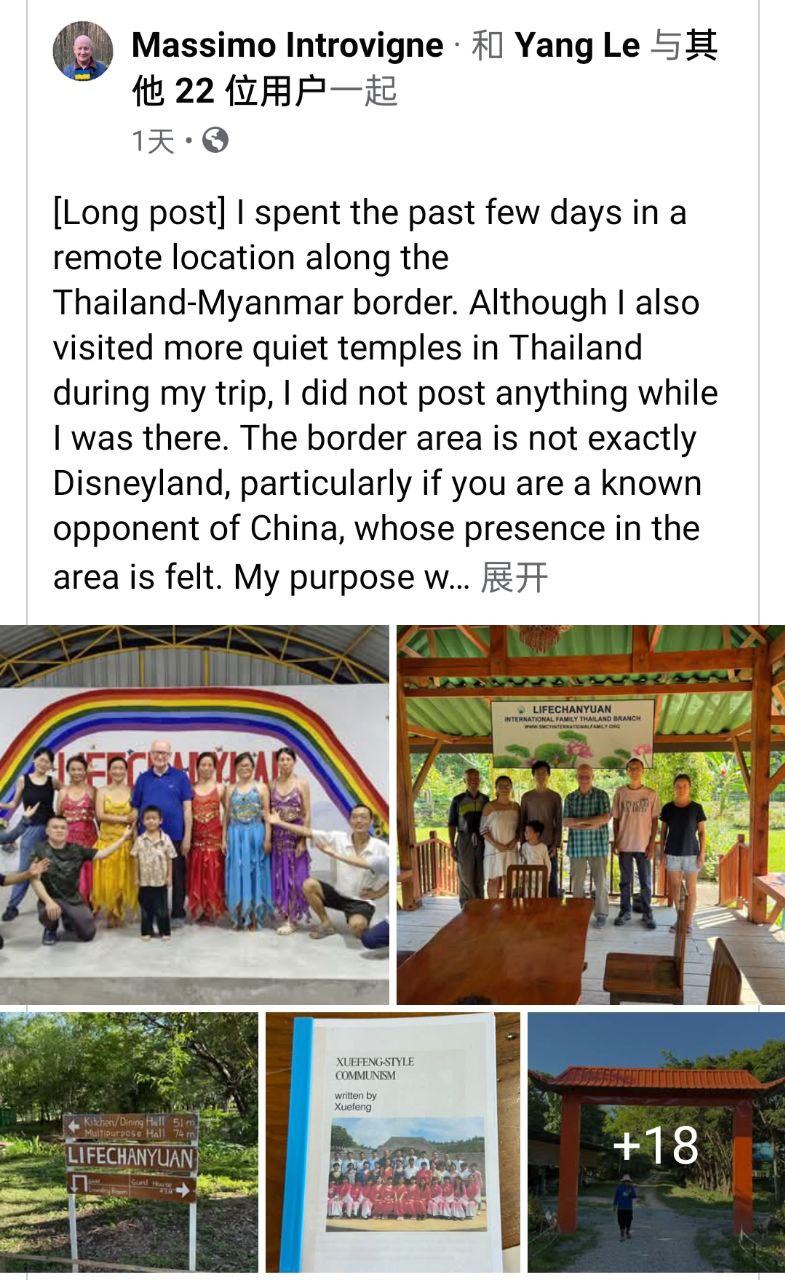
I spent the past few days in a remote location along the Thailand-Myanmar border. Although I also visited more quiet temples in Thailand during my trip, I did not post anything while I was there. The border area is not exactly Disneyland, particularly if you are a known opponent of China, whose presence in the area is felt. My purpose was to visit the “Second Home” of Lifechanyuan (LC, Life Zen Temple), a community heavily persecuted in China. When the large raid against their communities in China occurred in 2021, I published the only article on the events and LC in English (https://bitterwinter.org/life-zen-temple-banned-as-a-xie.../), based on information received from one of our citizen journalists in China (not a LC member) and publicly available reports by the Chinese police. Although LC liked the article, which led to (encrypted) correspondence with them, I now realize that I, the Chinese police, and a favorable article by a New York Times reporter who visited LC in 2014 when it was still tolerated in China emphasized the Communist connection of the group excessively. The founder, Guide Xuefeng, was a member of the Communist Party, uses the expression “Xuefeng Communism,” and occasionally references Marx and Mao, which members admit might lead outside observers astray (and perhaps protected the group in its early years in China—my comment, not theirs). However, none of those in the Thai Second Home was a CCP member in China. Only one former Taoist monk said he was fascinated by accounts of the Mao era. The others were spiritual seekers who traveled through Christianity, NRMs (one spent two years in jail as a Falun Gong practitioner), and the New Age, reading for example “The Secret” or being influenced by the “Maya” prophecy about 2012. Later, some even heard about the Italian Damanhur (through a German anthropologist who visited them in China). The founder himself who had a deep spiritual experience while working in Zimbabwe (see my 2021 article) had a passage in the Jehovah’s Witnesses, something important I discovered only by talking with veteran members (his son is still a JW). He was more influenced by Buddhism, various esoteric and gnostic ideas, and early Christianity than by Marxism, although his Second Homes are radical communities with no private property (all belongings are put in common), no family (there are sexual relationships and they are not against giving birth, but the idea is that children should be educated communally—although for now there is only one child in the Thai Second Home).
There are voluminous doctrinal writings I have just started exploring and I hope to be able to interview Guide Xuefeng, who lives in Canada. My adventurous visit was a scholarly pursuit (and perhaps I wanted to prove to myself that at age 70 I am not done with fieldwork in remote places) but I came out of it deeply moved by the experience. I met a happy community living a simple, challenging, yet fulfilling life. I came to know persons who kindly shared with me unique histories. Perhaps not many in the world will be persuaded to their idea to prioritize happiness, a simple life, and spiritual realization over material wealth and mundane success. Yet, those of us who do not make this choice, and may disagree with LC theology, do need communities like LC to function as a prophecy and remind us of what is really important in life. And thanks to the brothers and sisters for the delicious dumplings and mooncakes and for staging for me one of their musical shows (one gifted sister had even learned how to play the Italian ocarina in a music school in China).
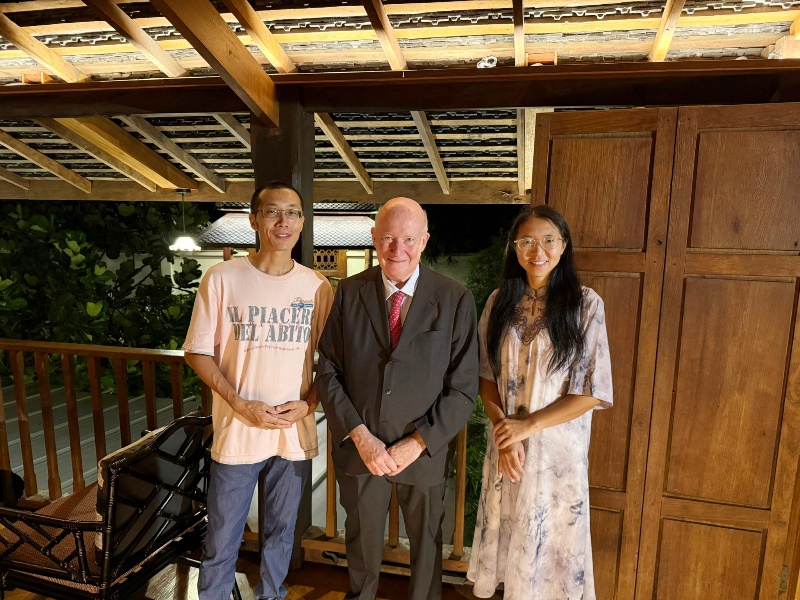
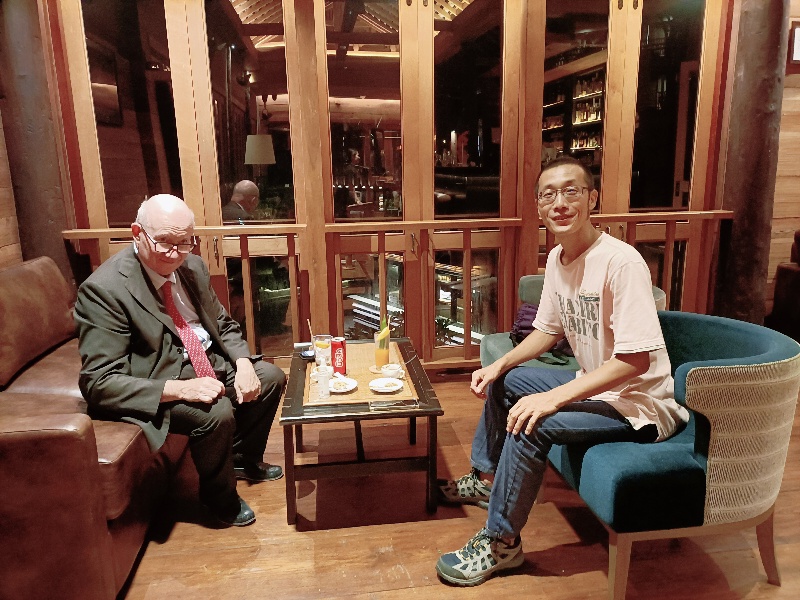
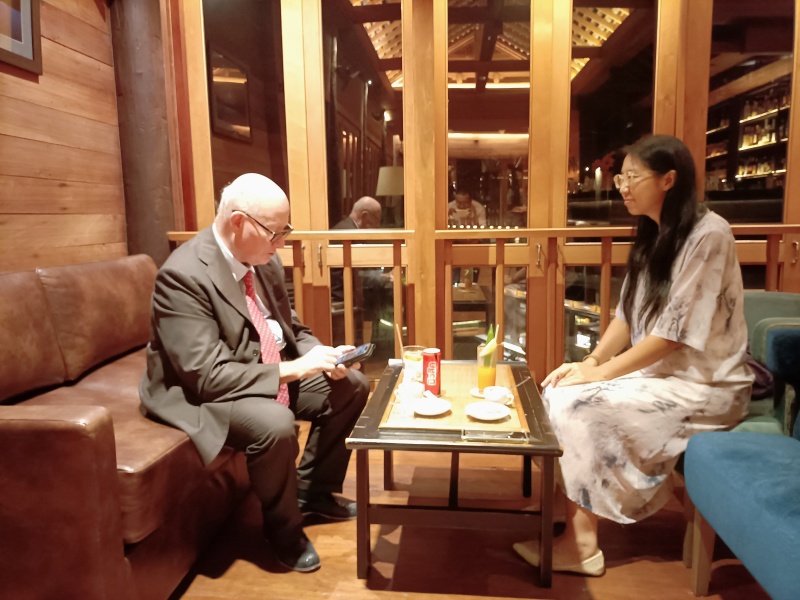
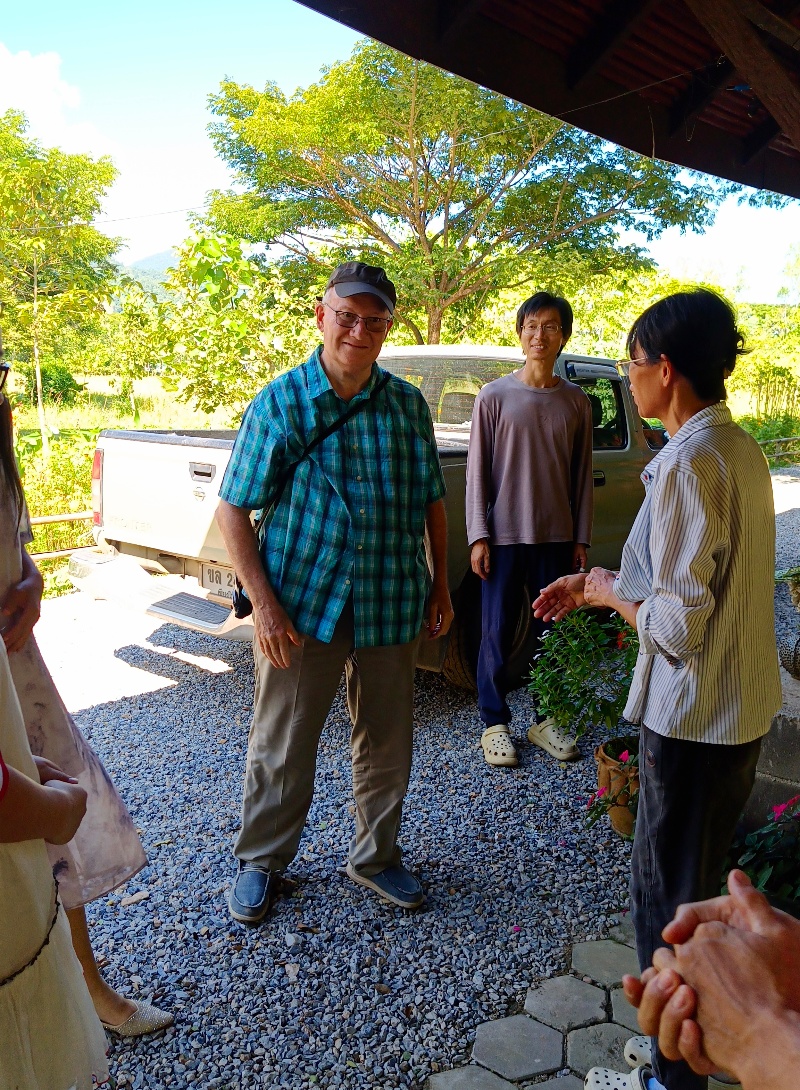
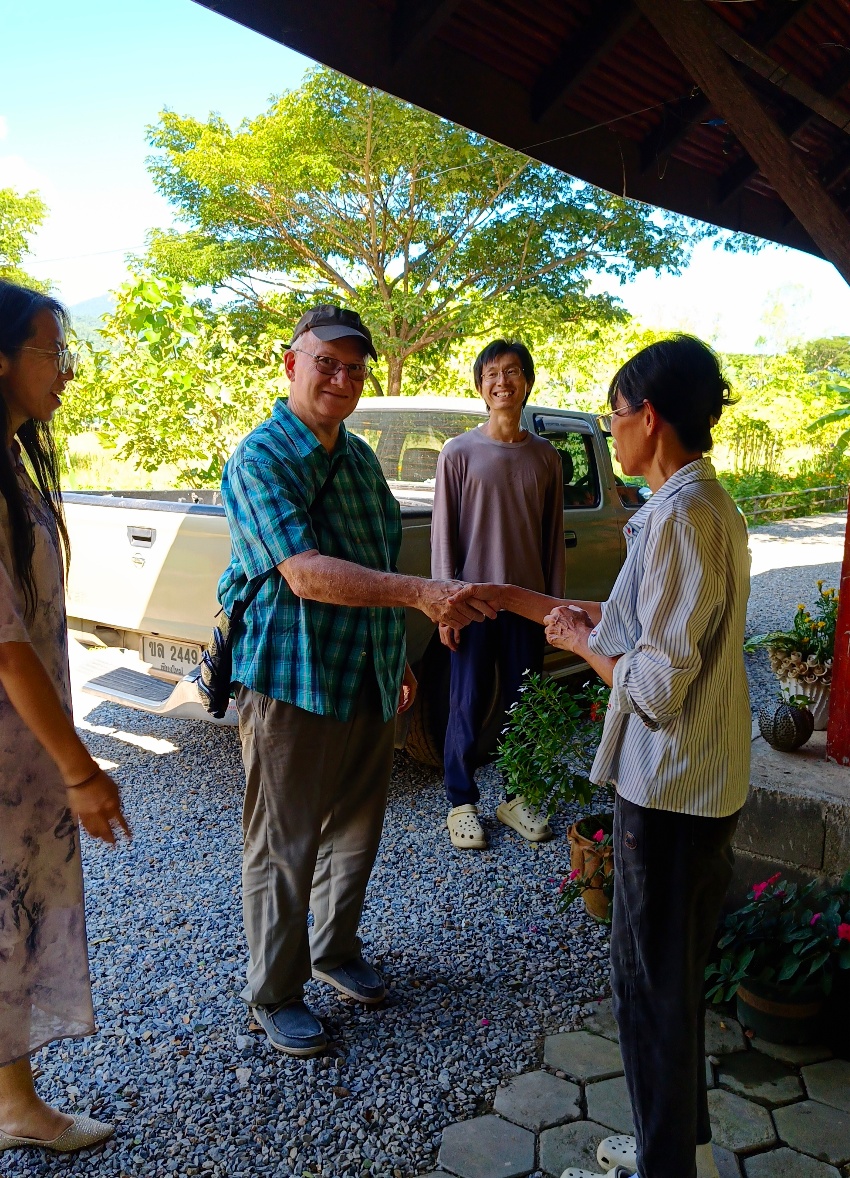
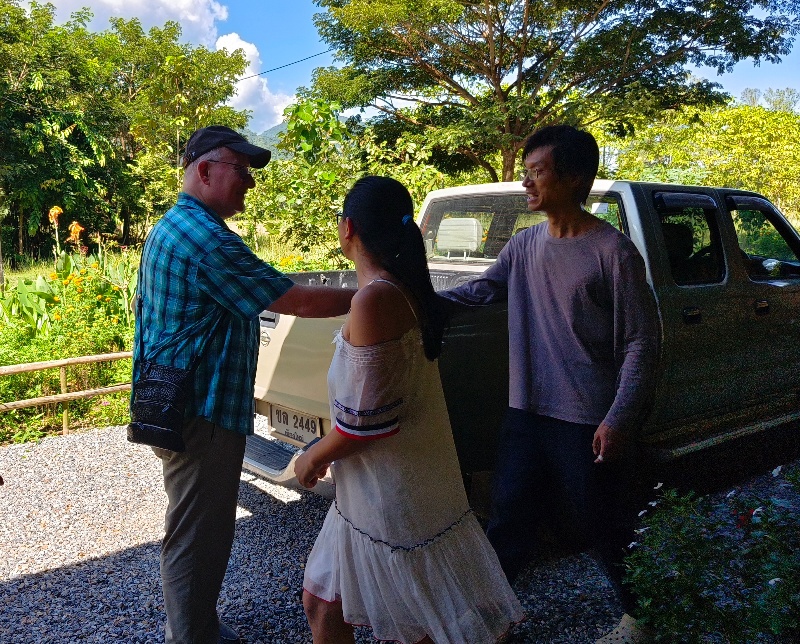
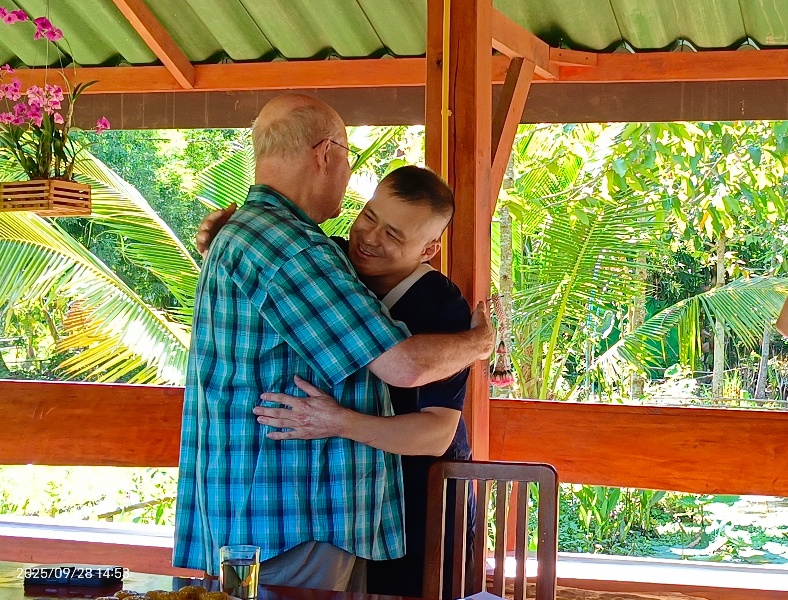
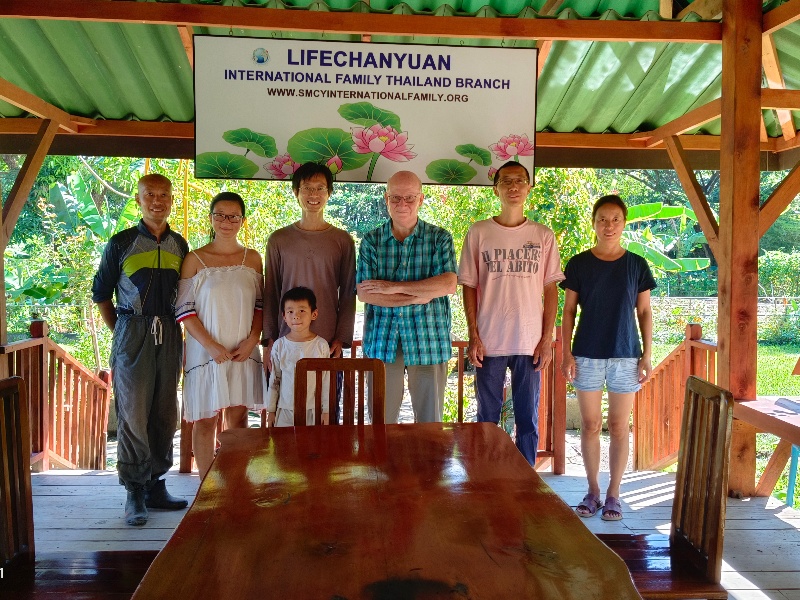
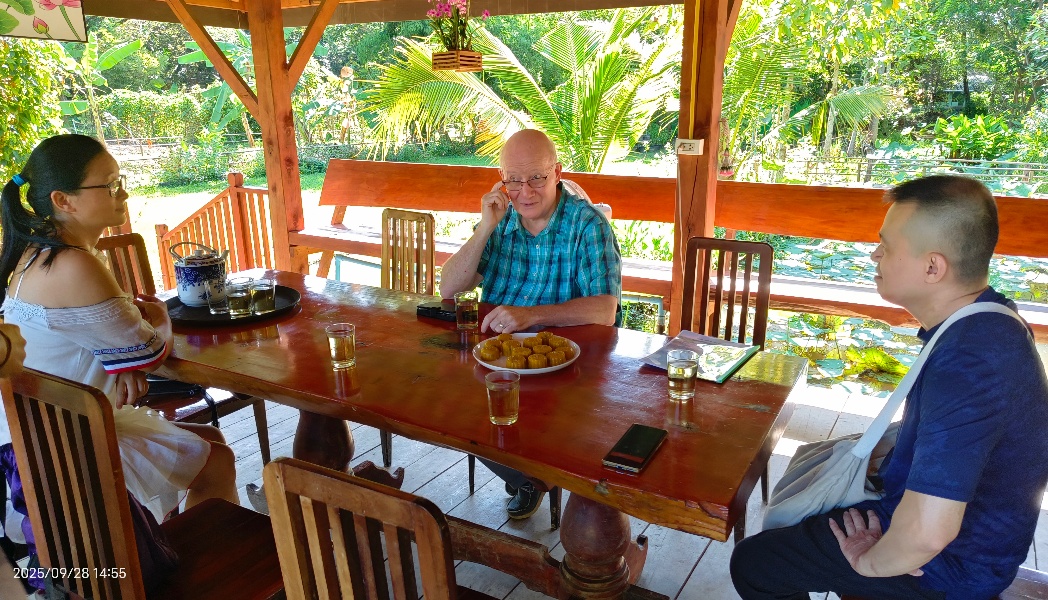
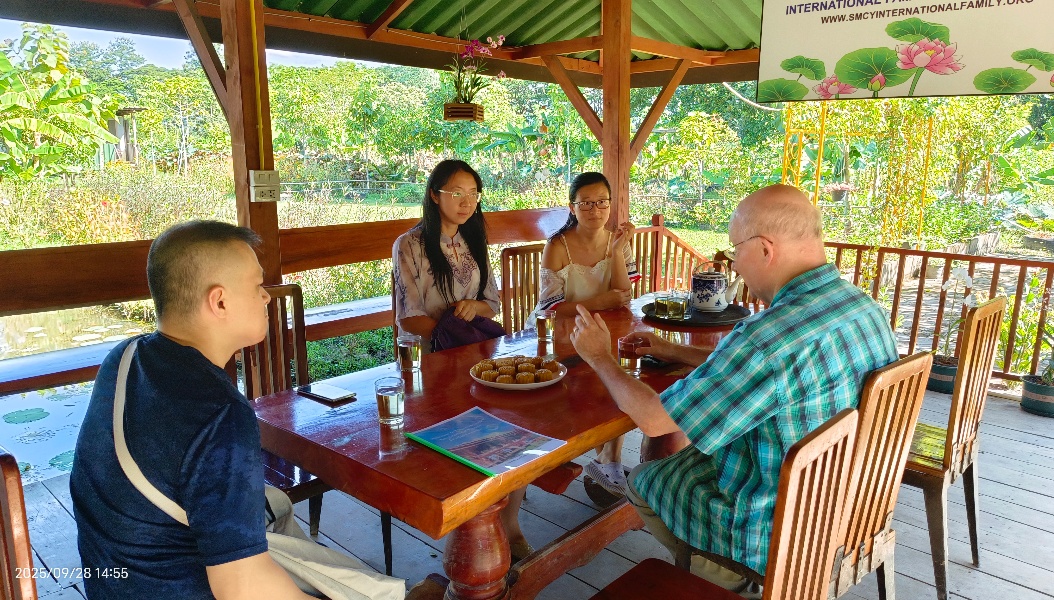
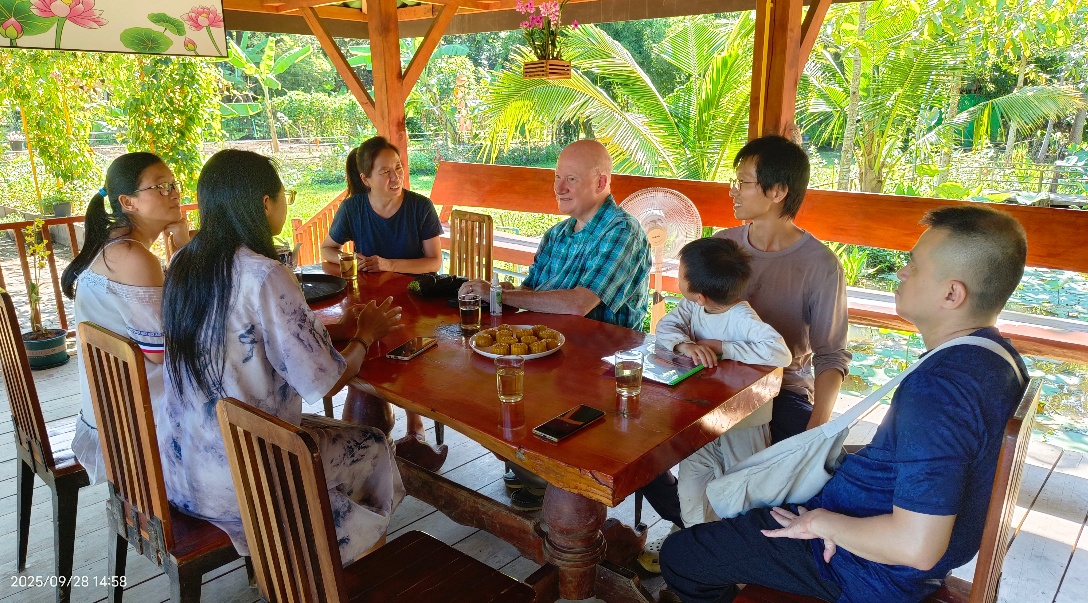
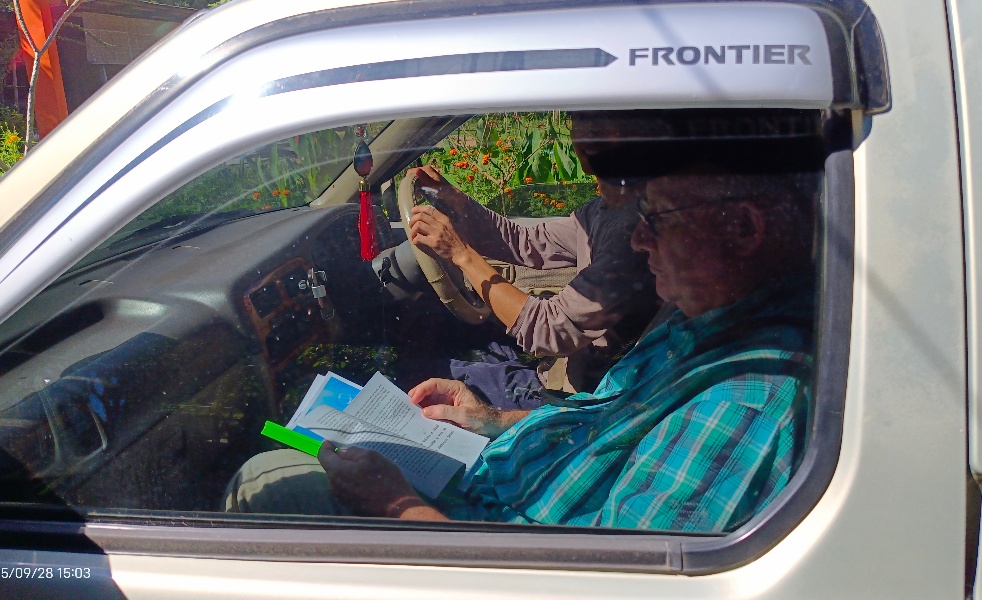
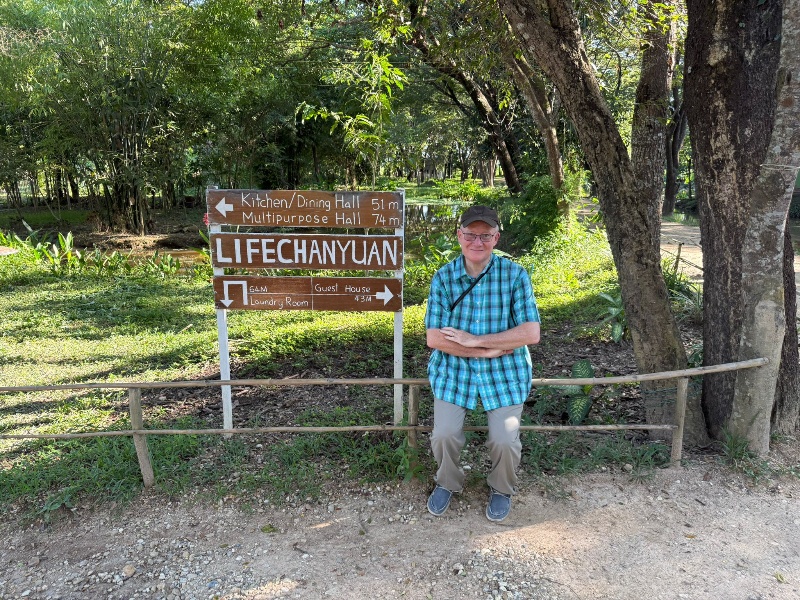
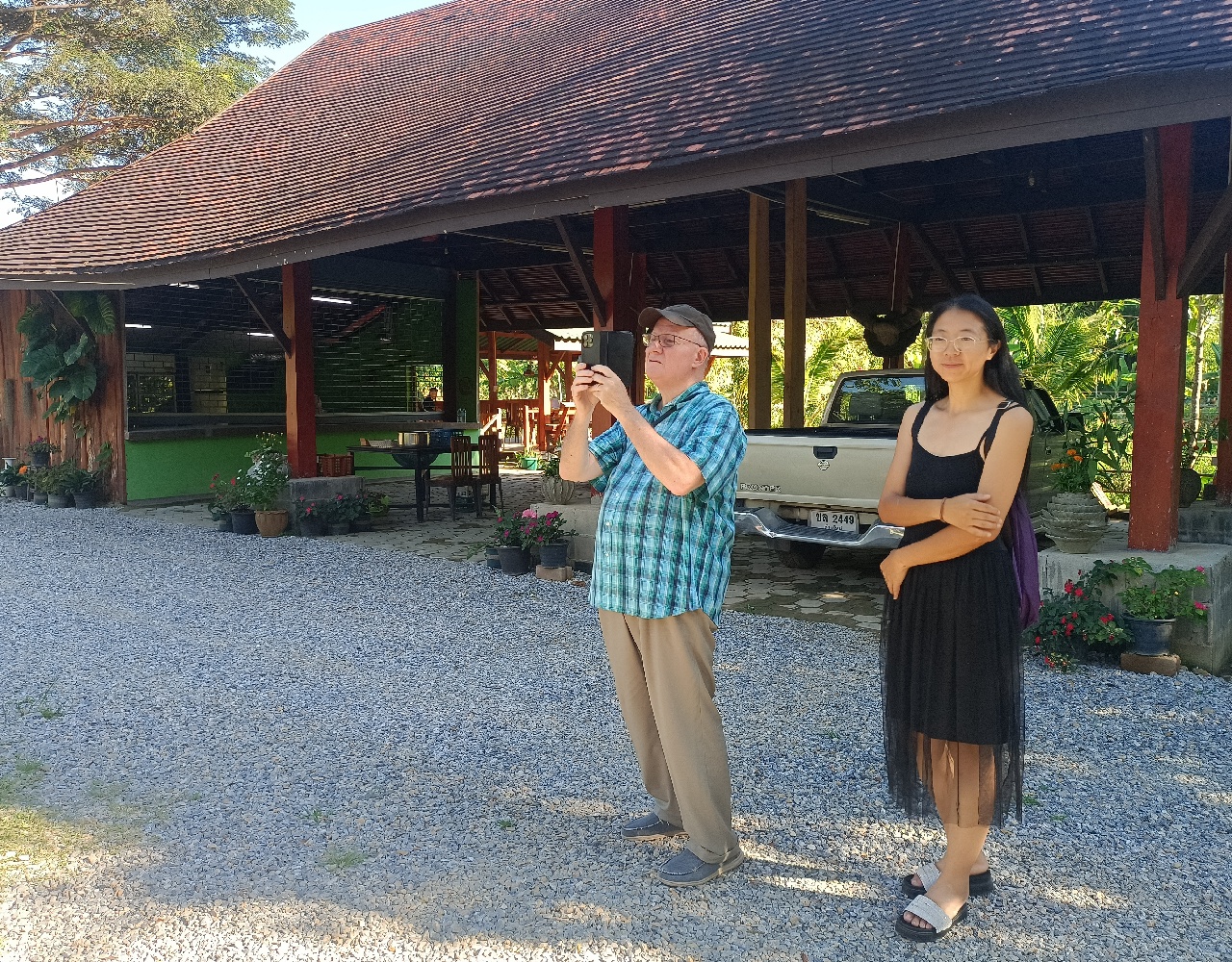
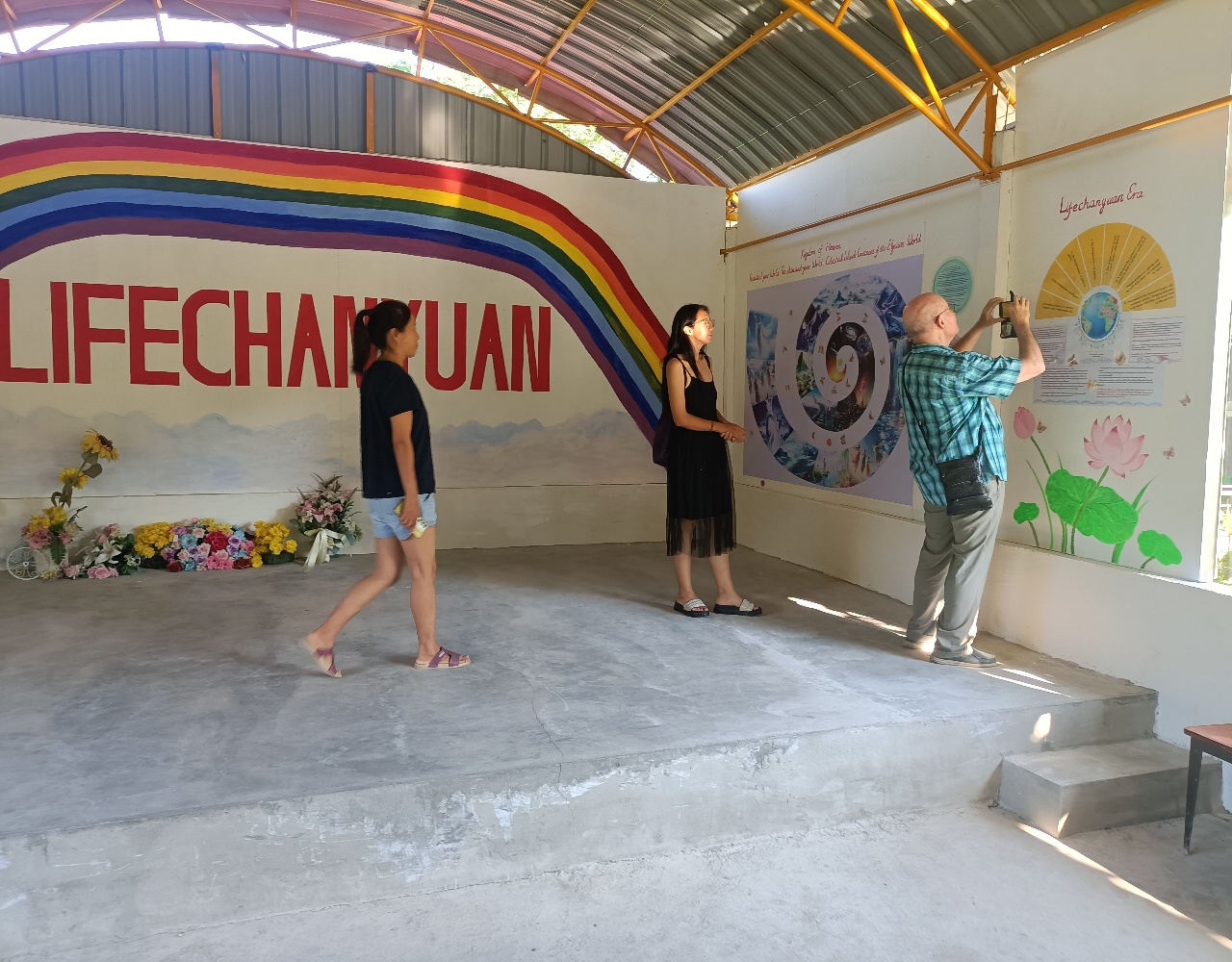
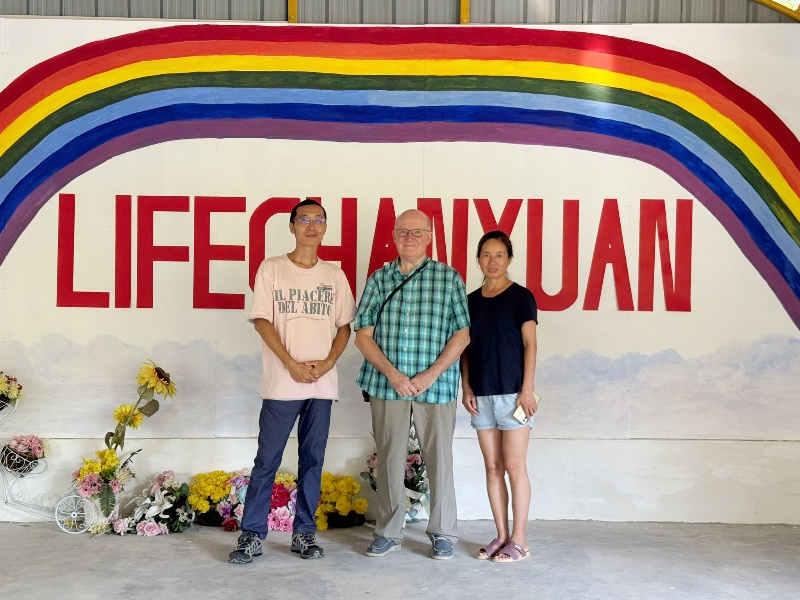
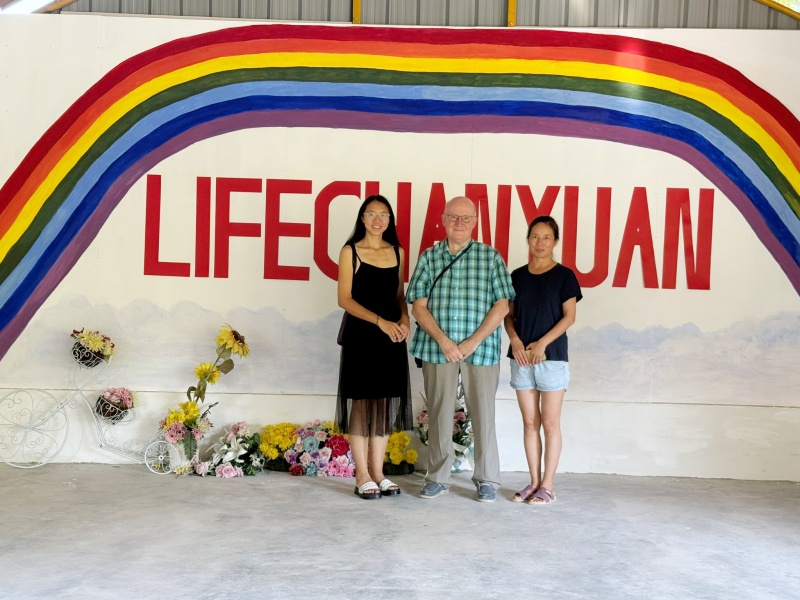
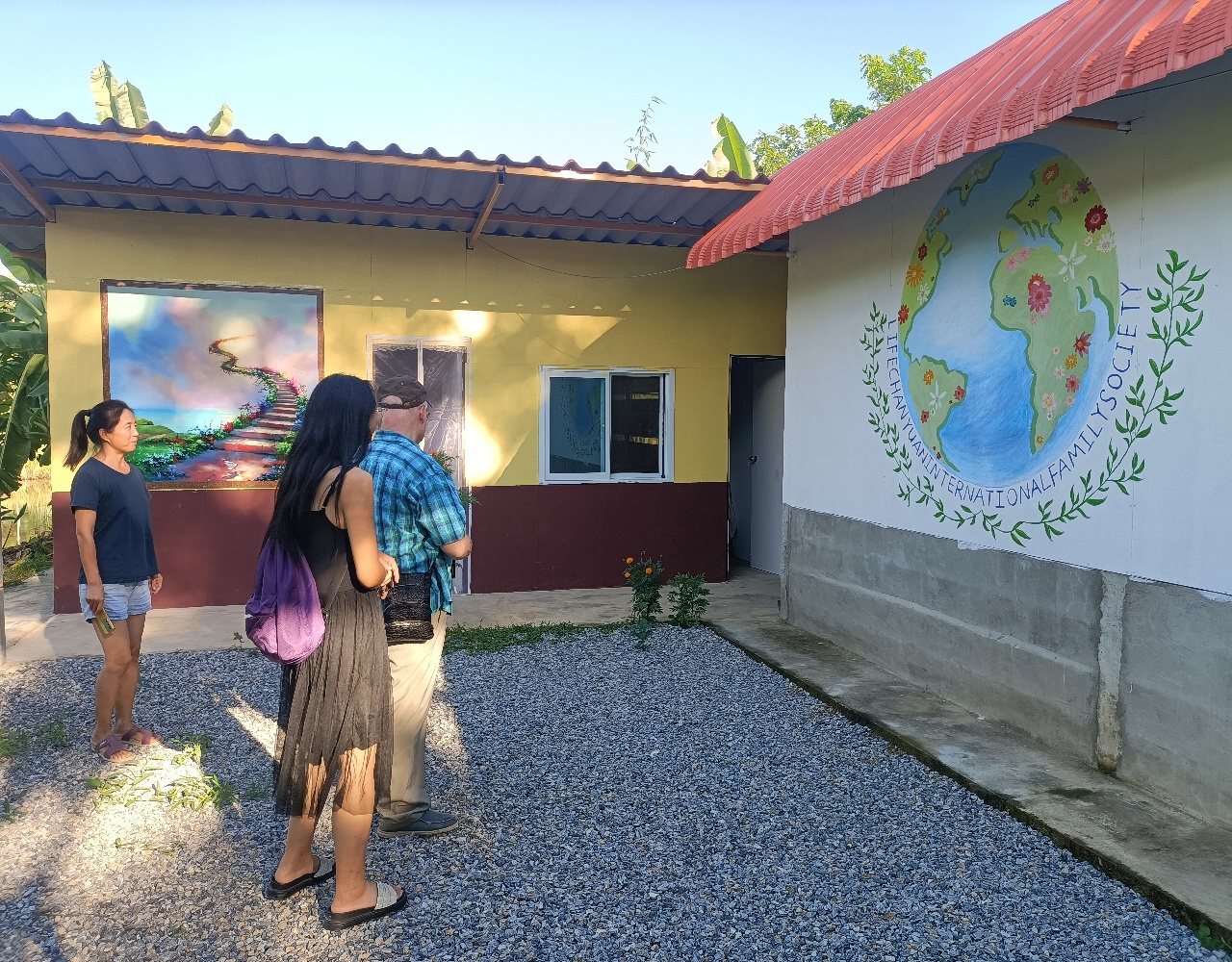
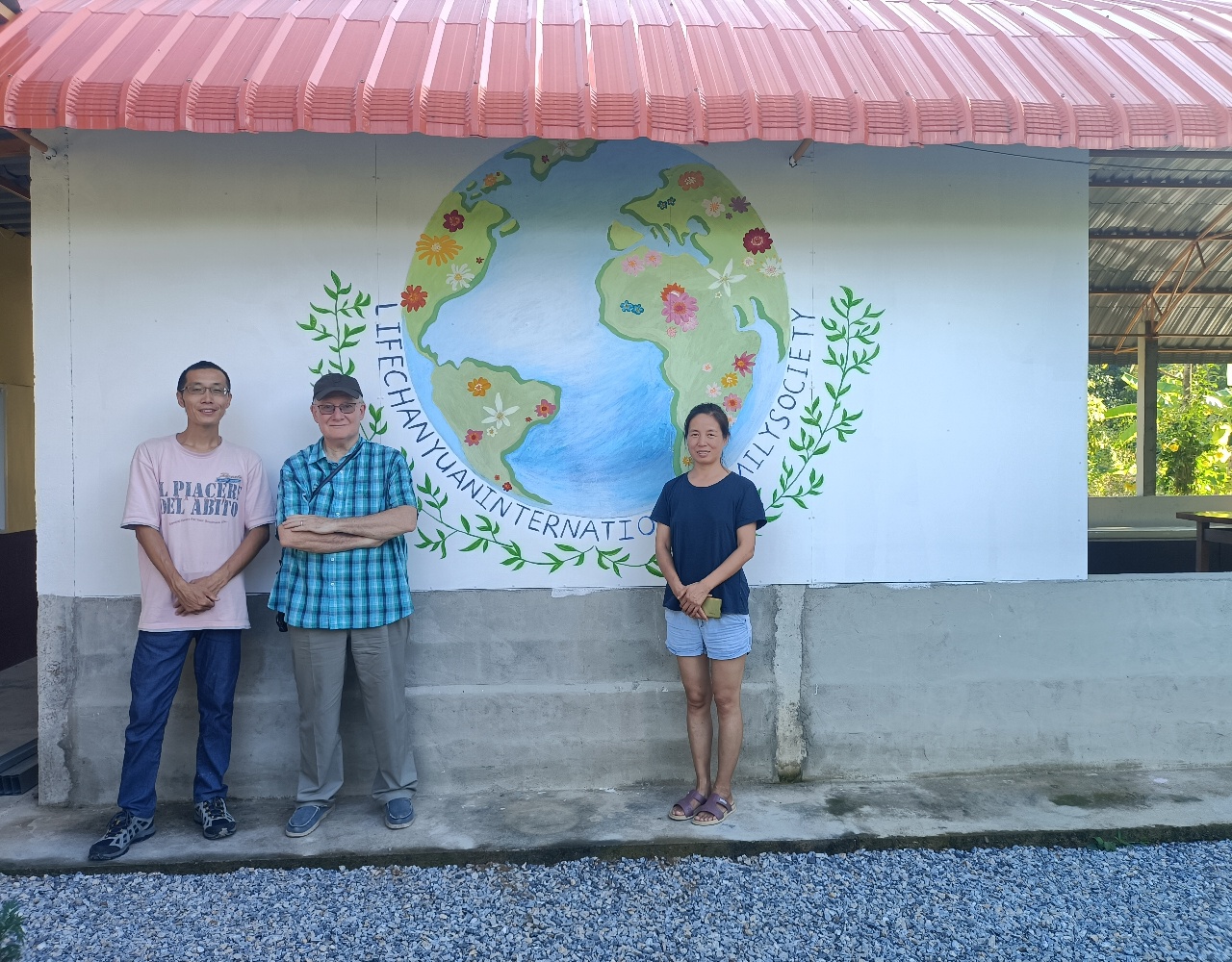
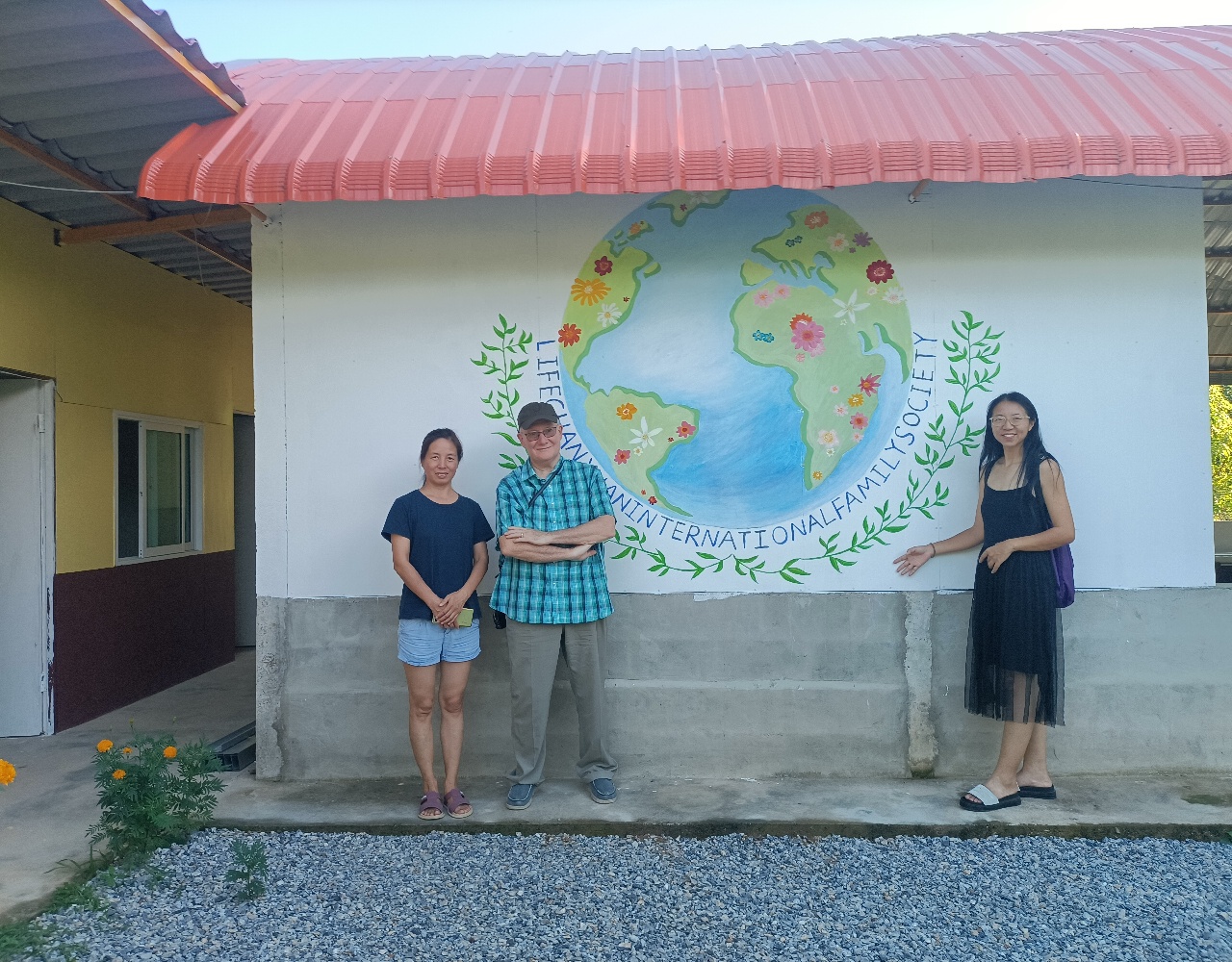
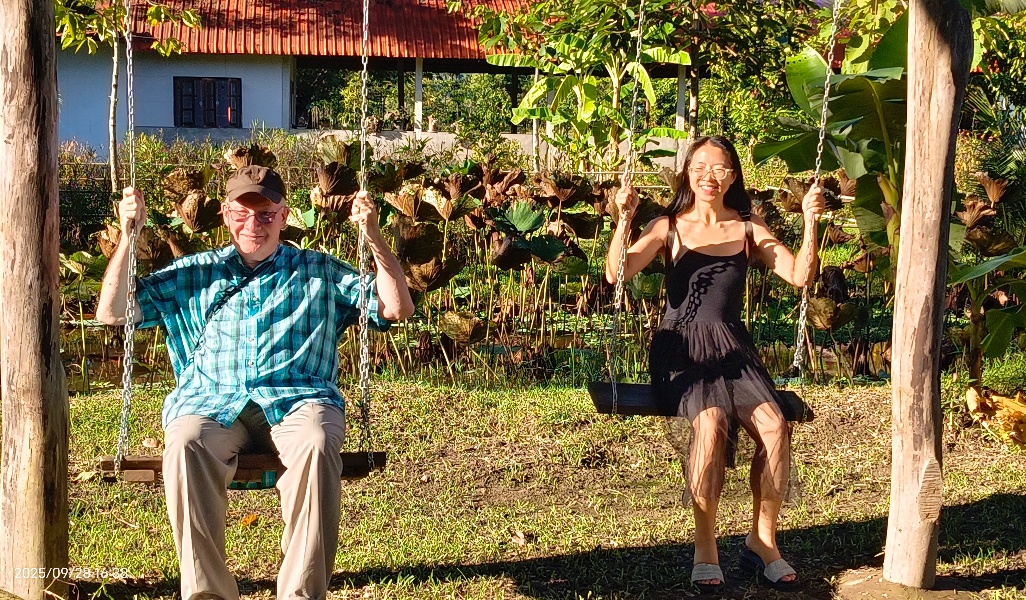
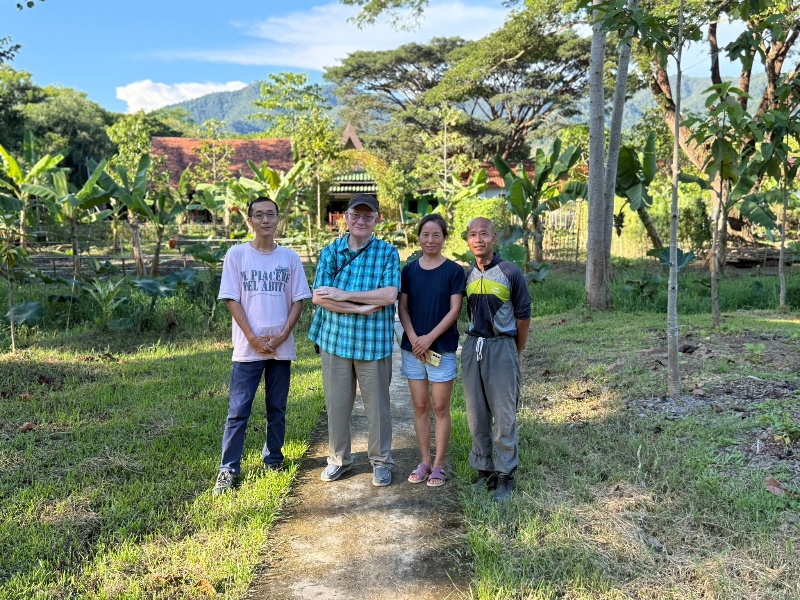
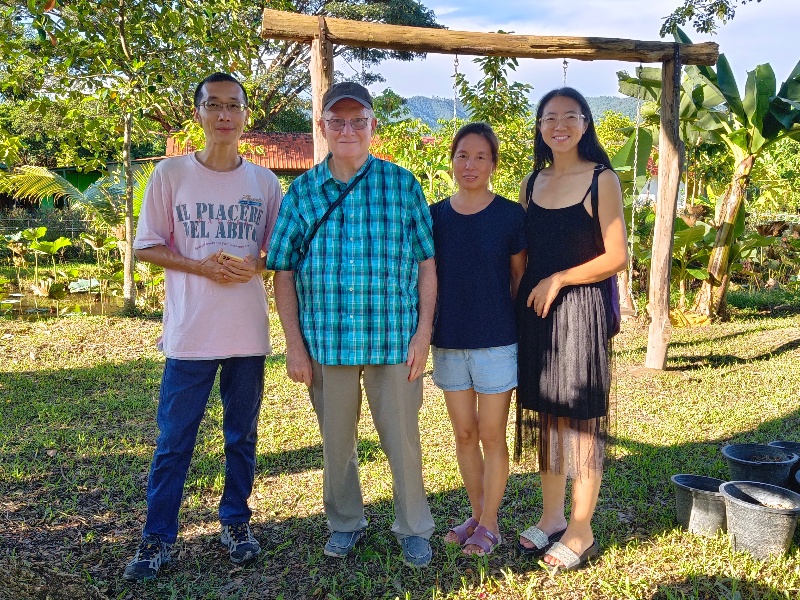
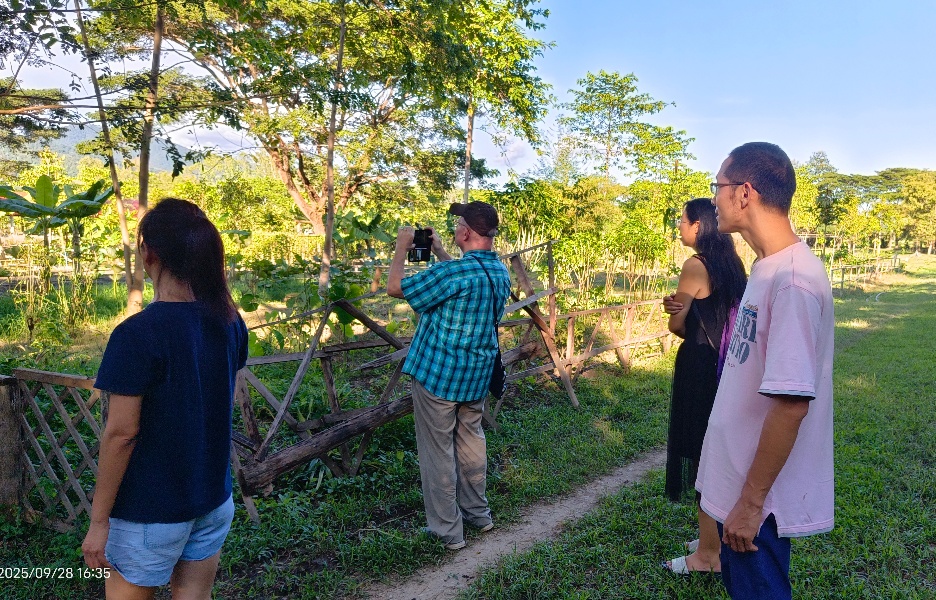
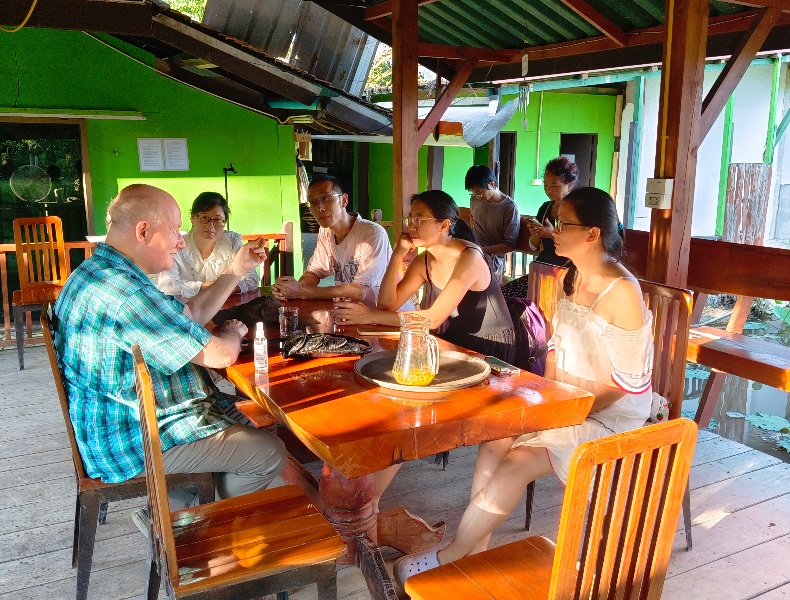
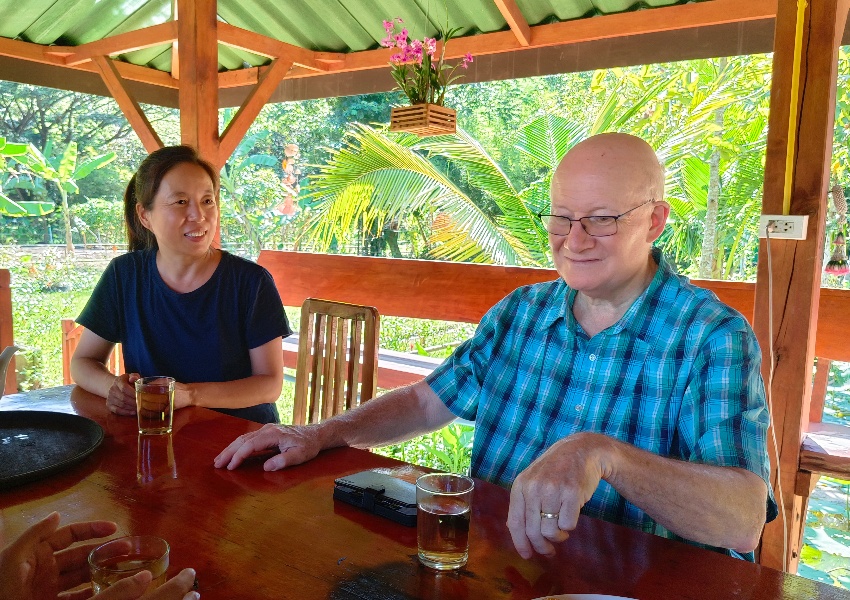
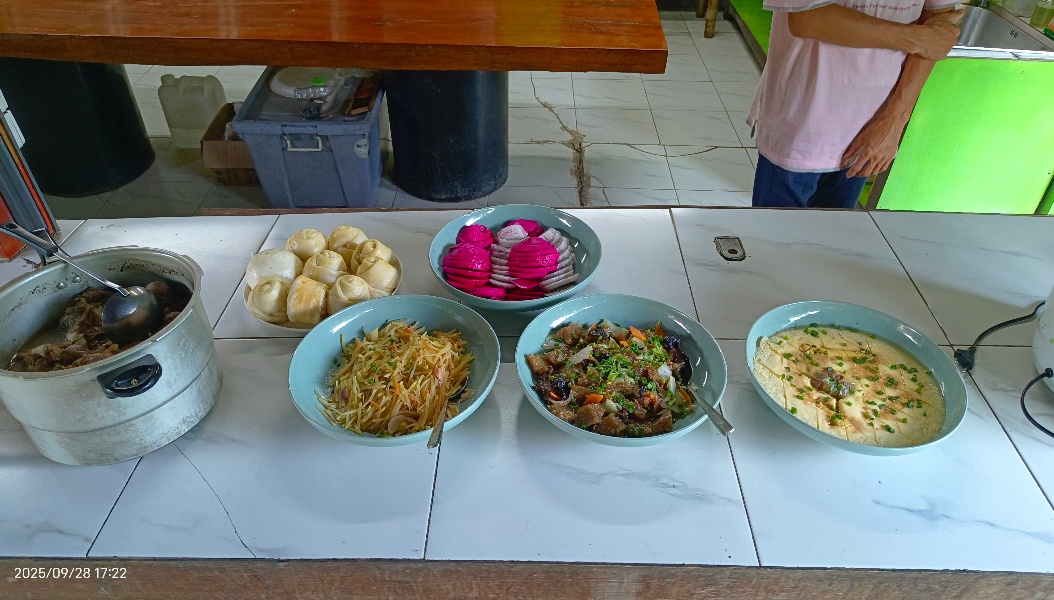
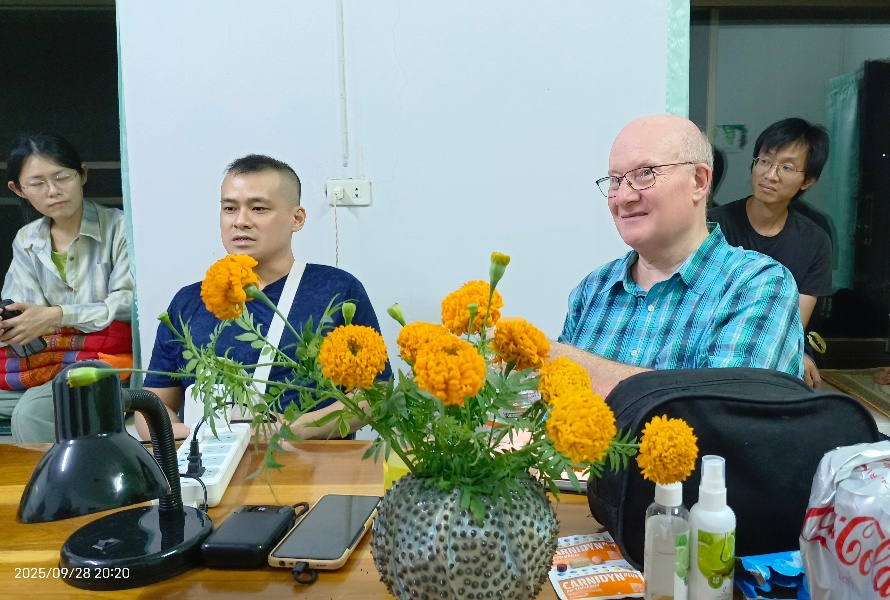
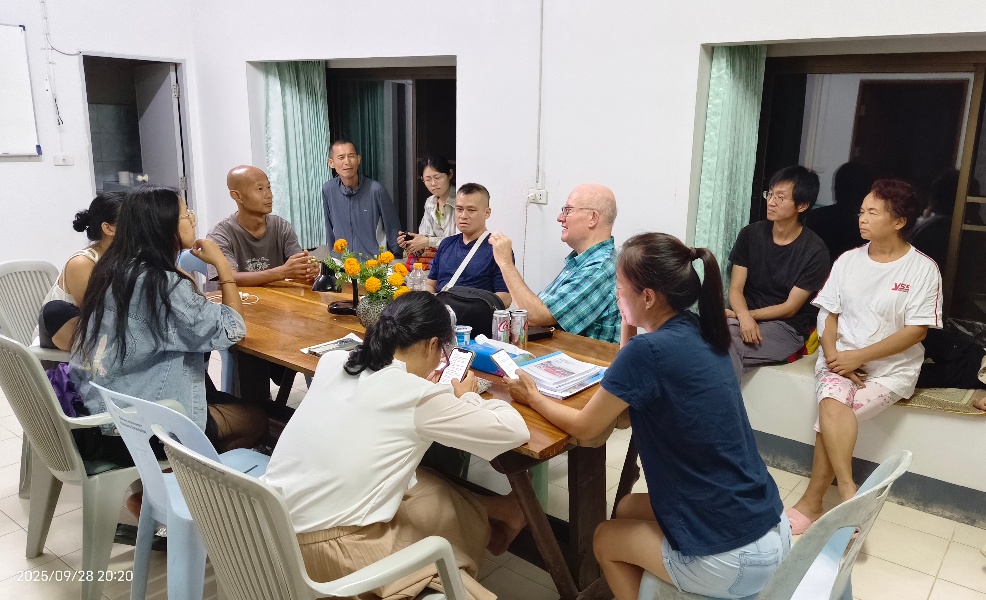
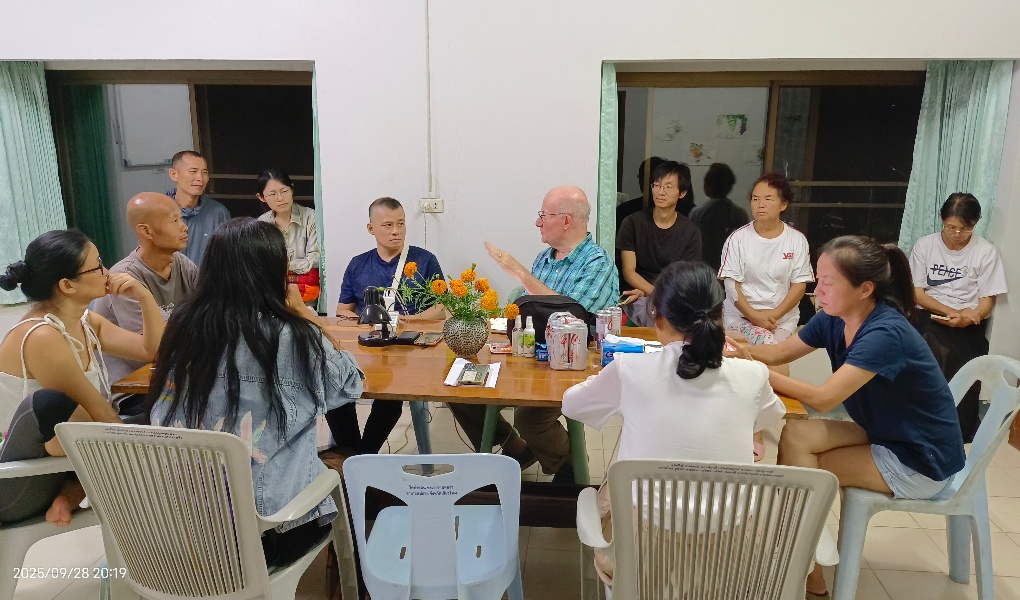
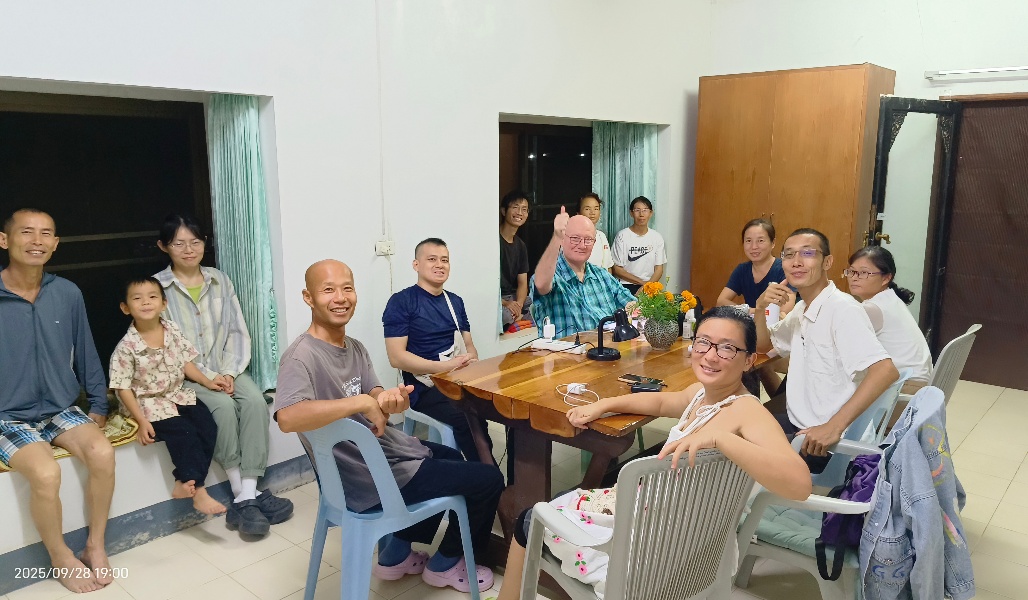
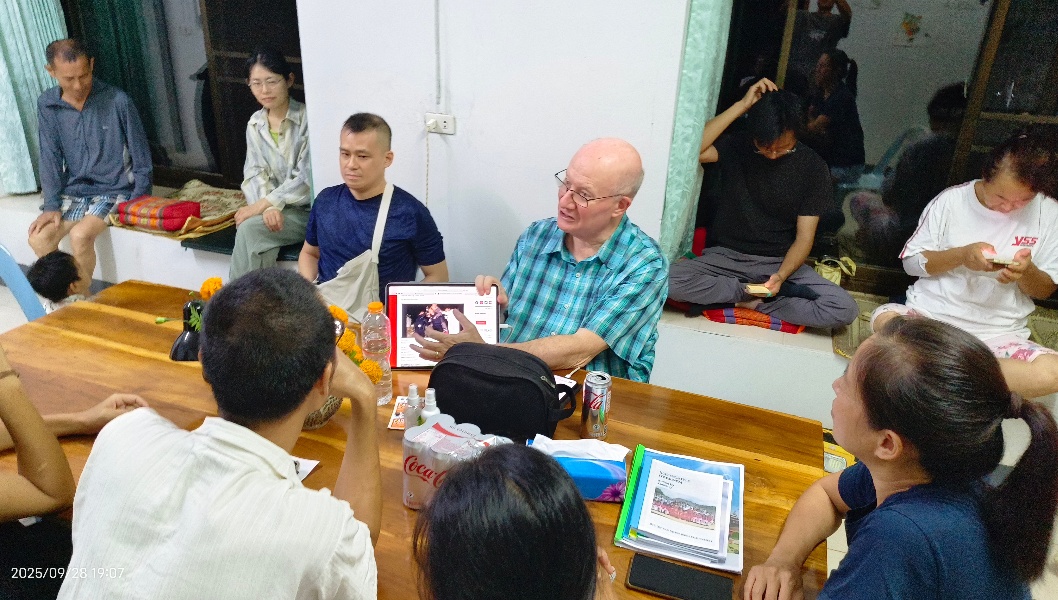
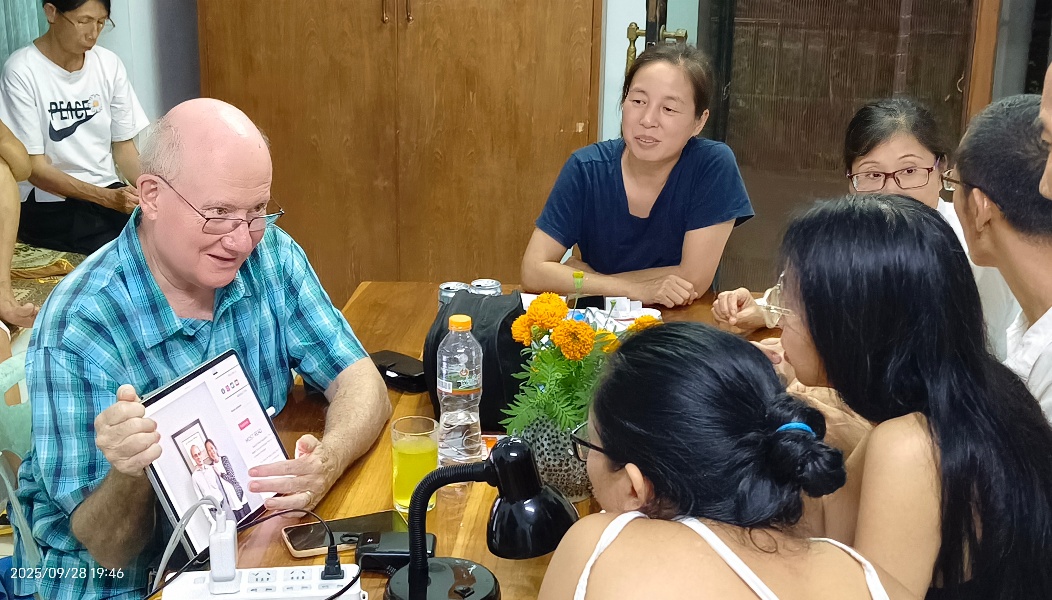
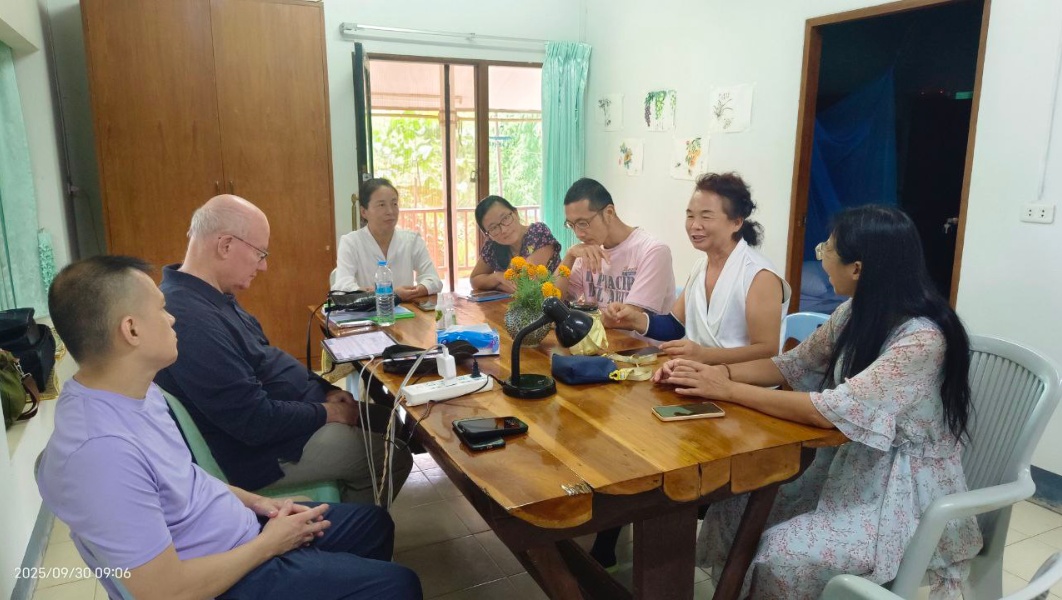
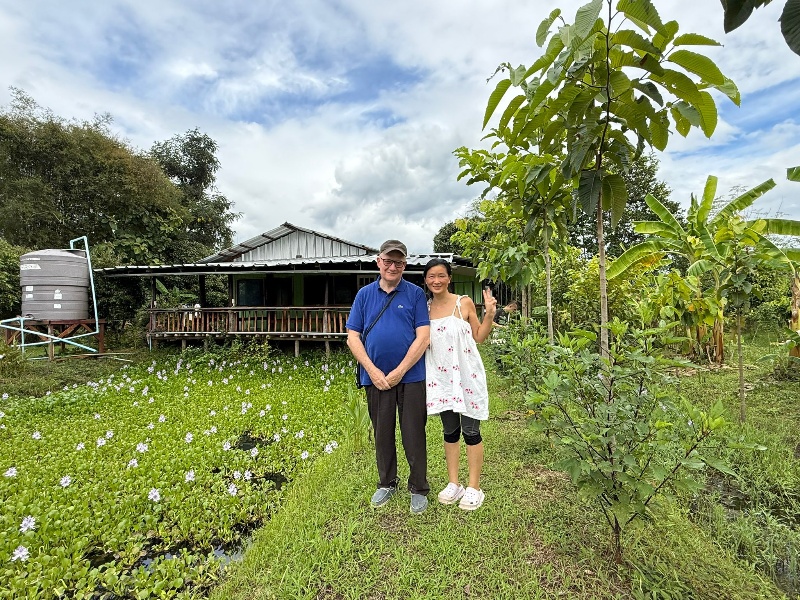
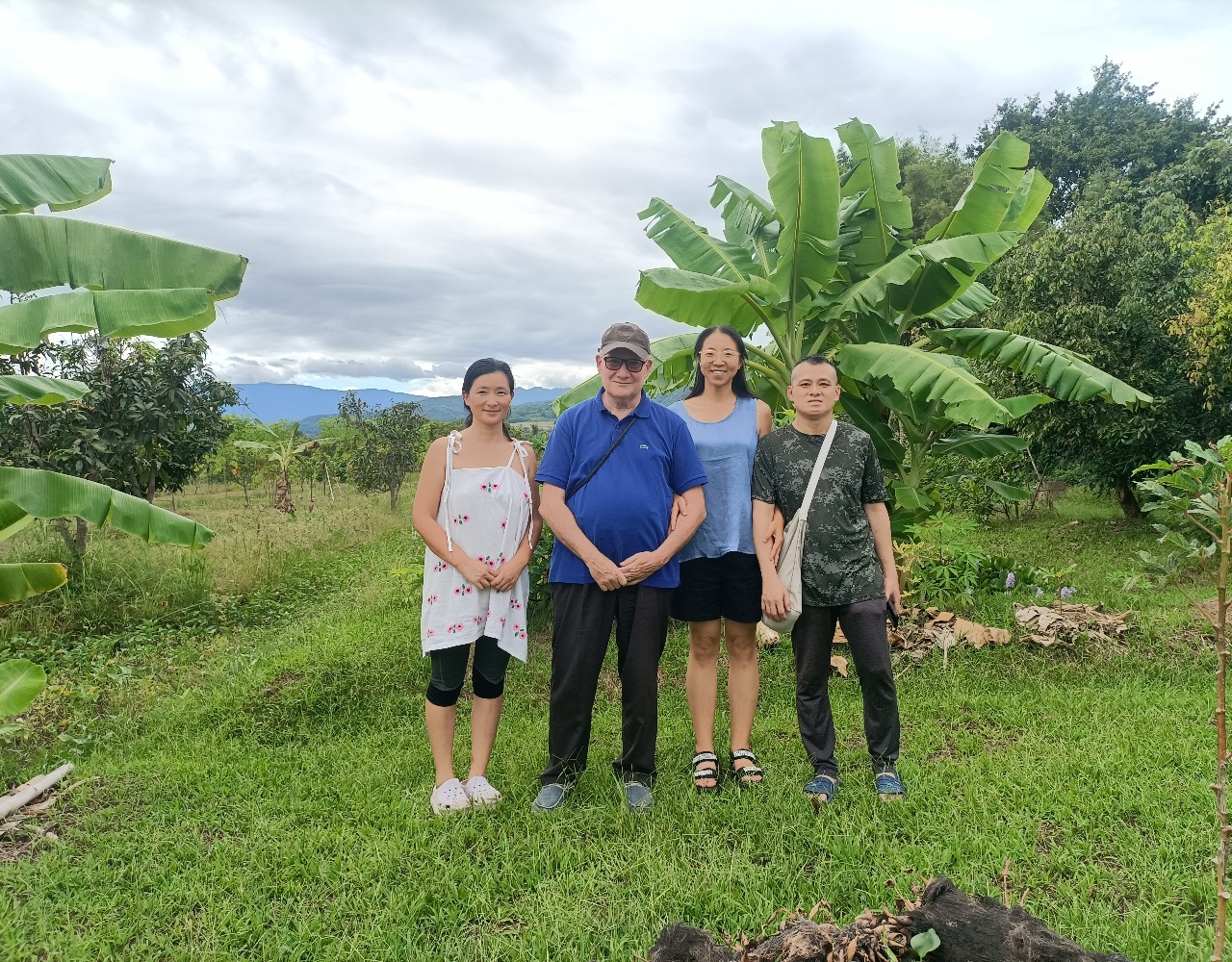
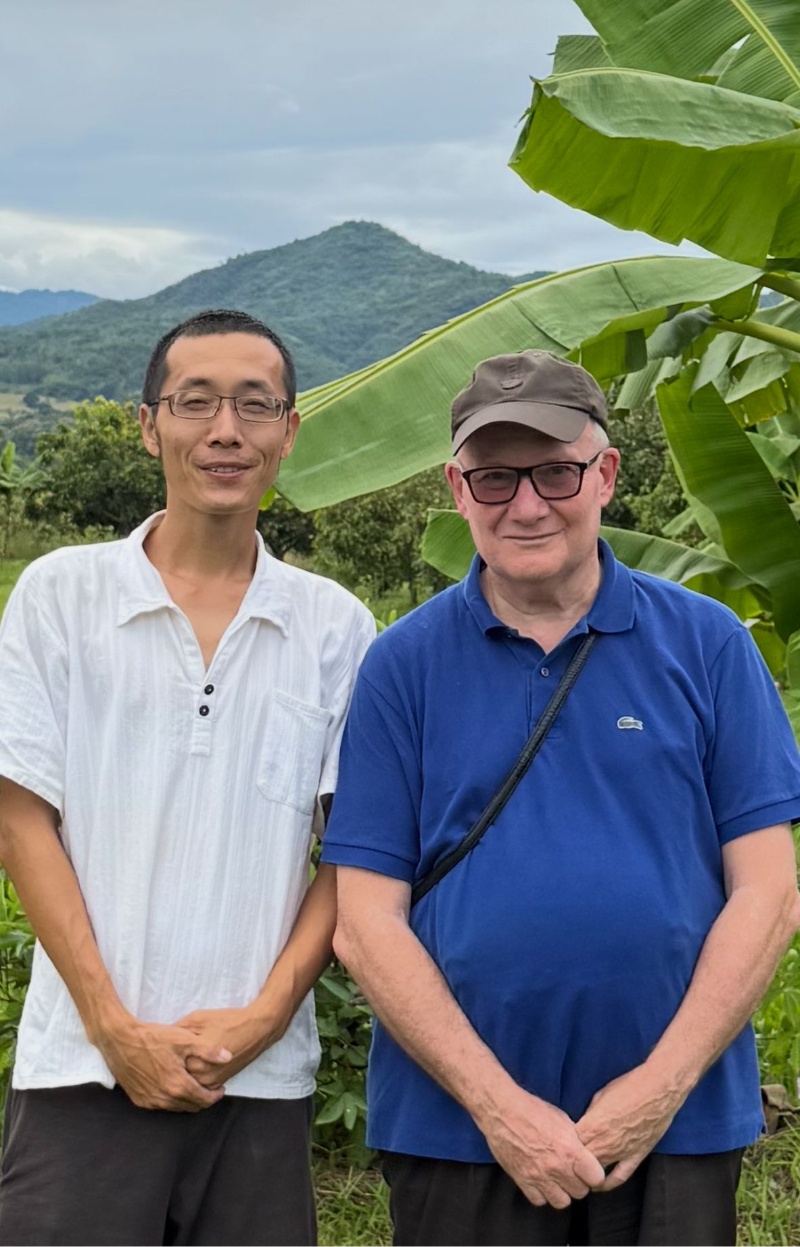
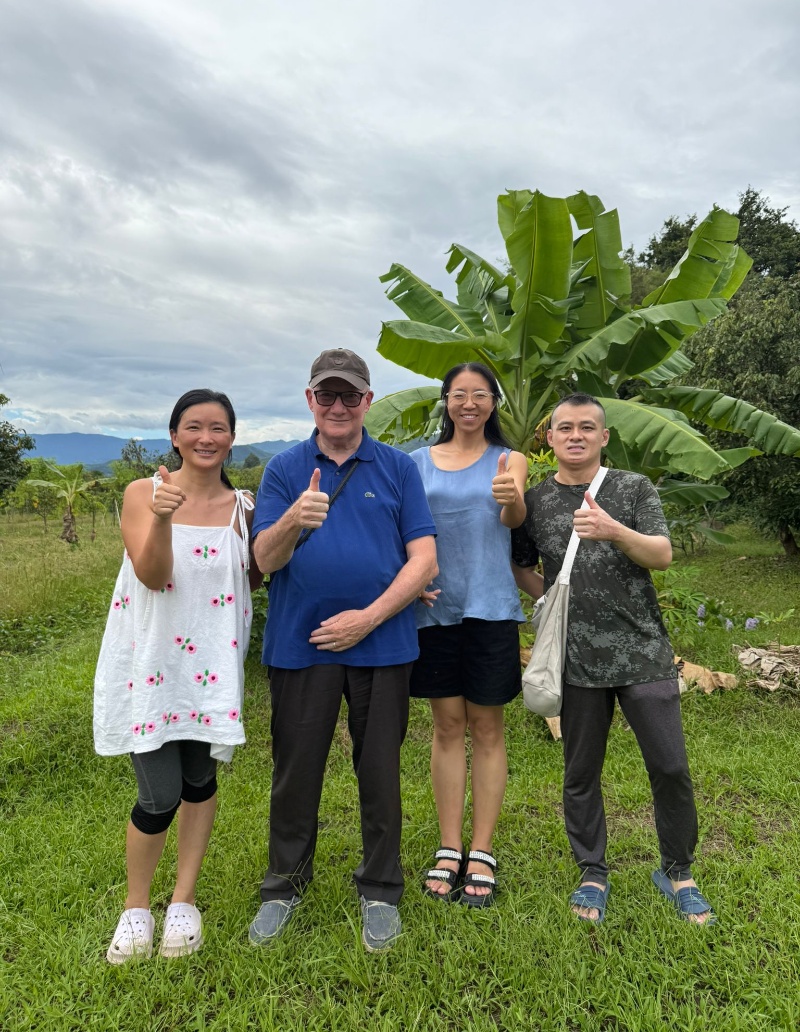
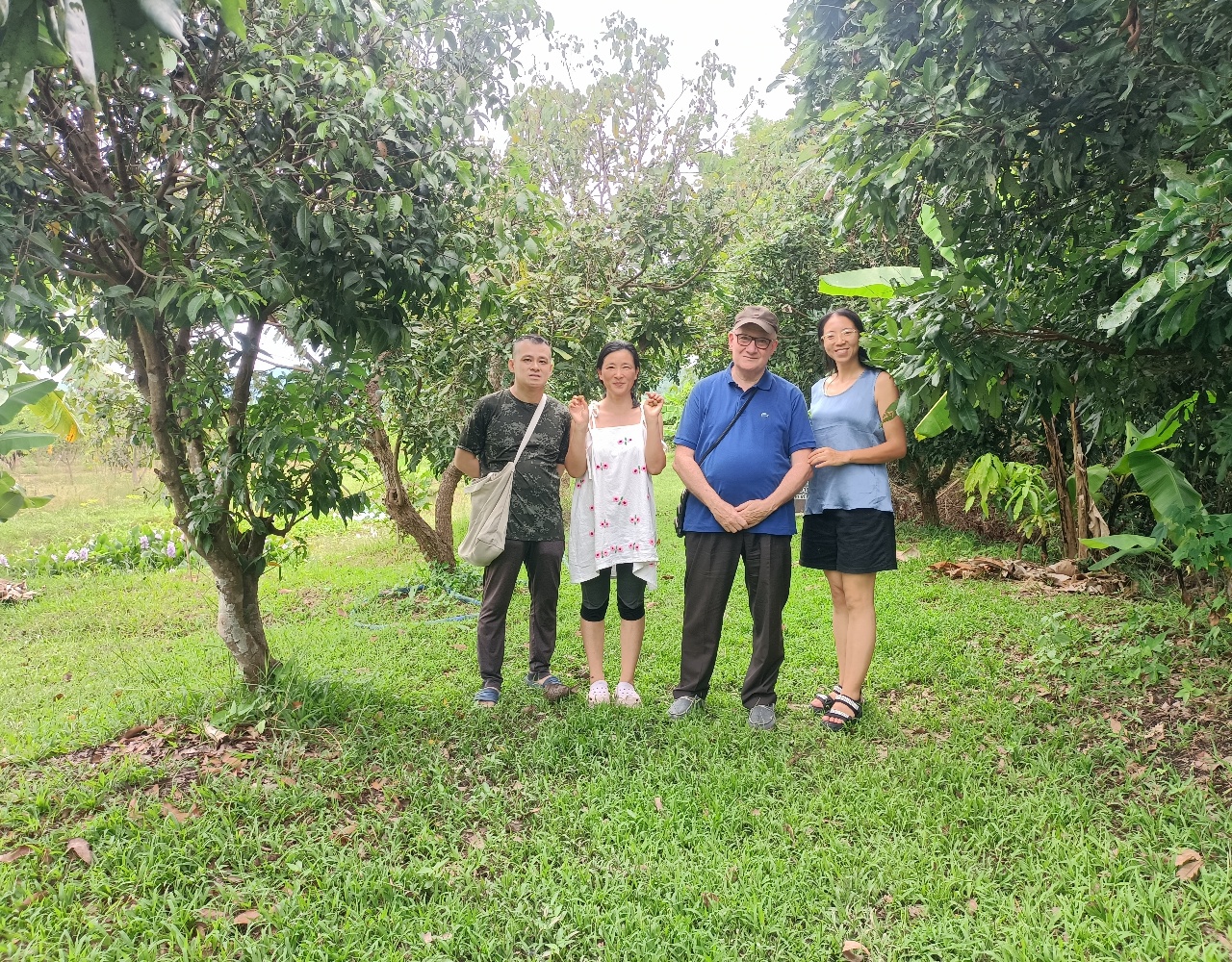
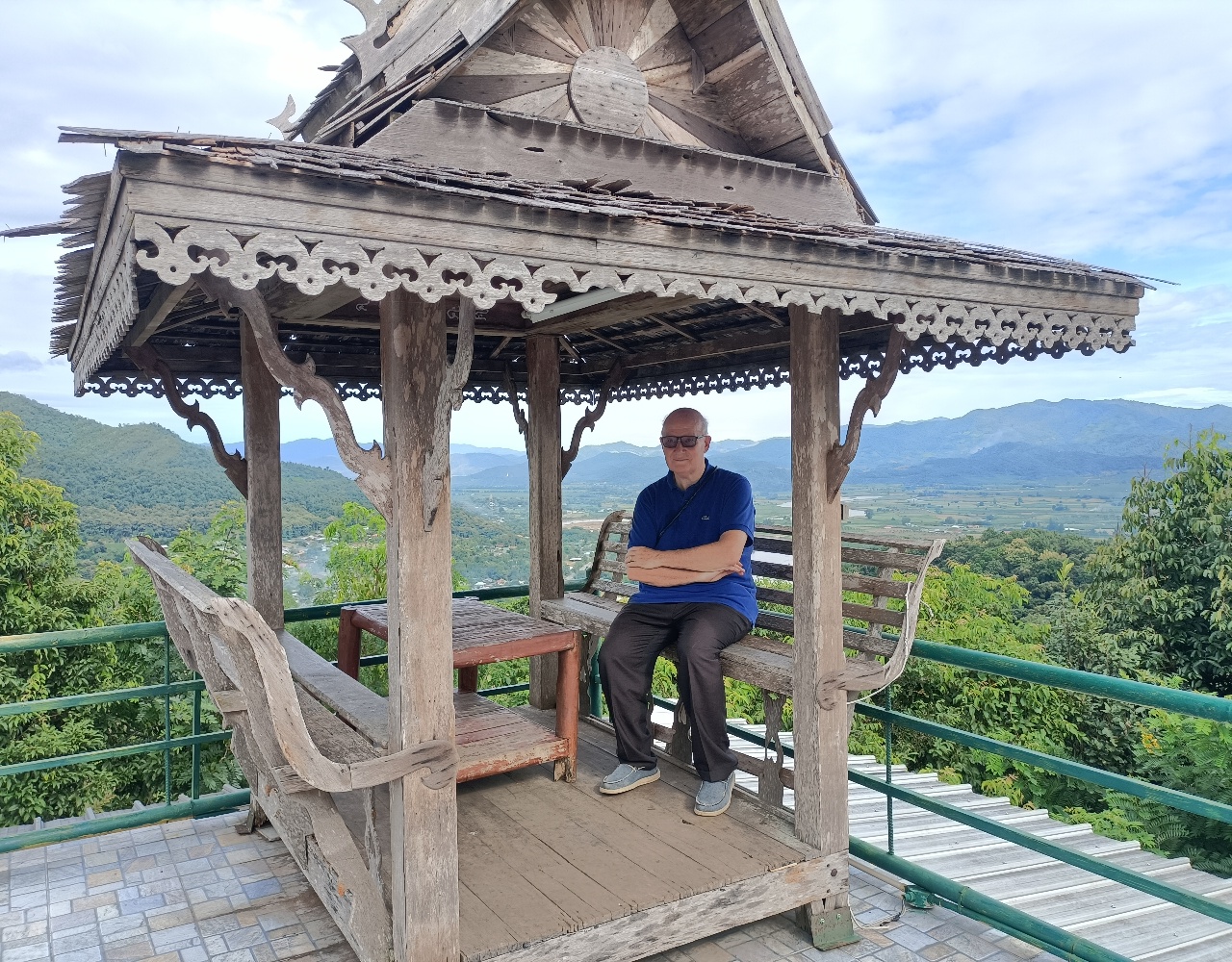
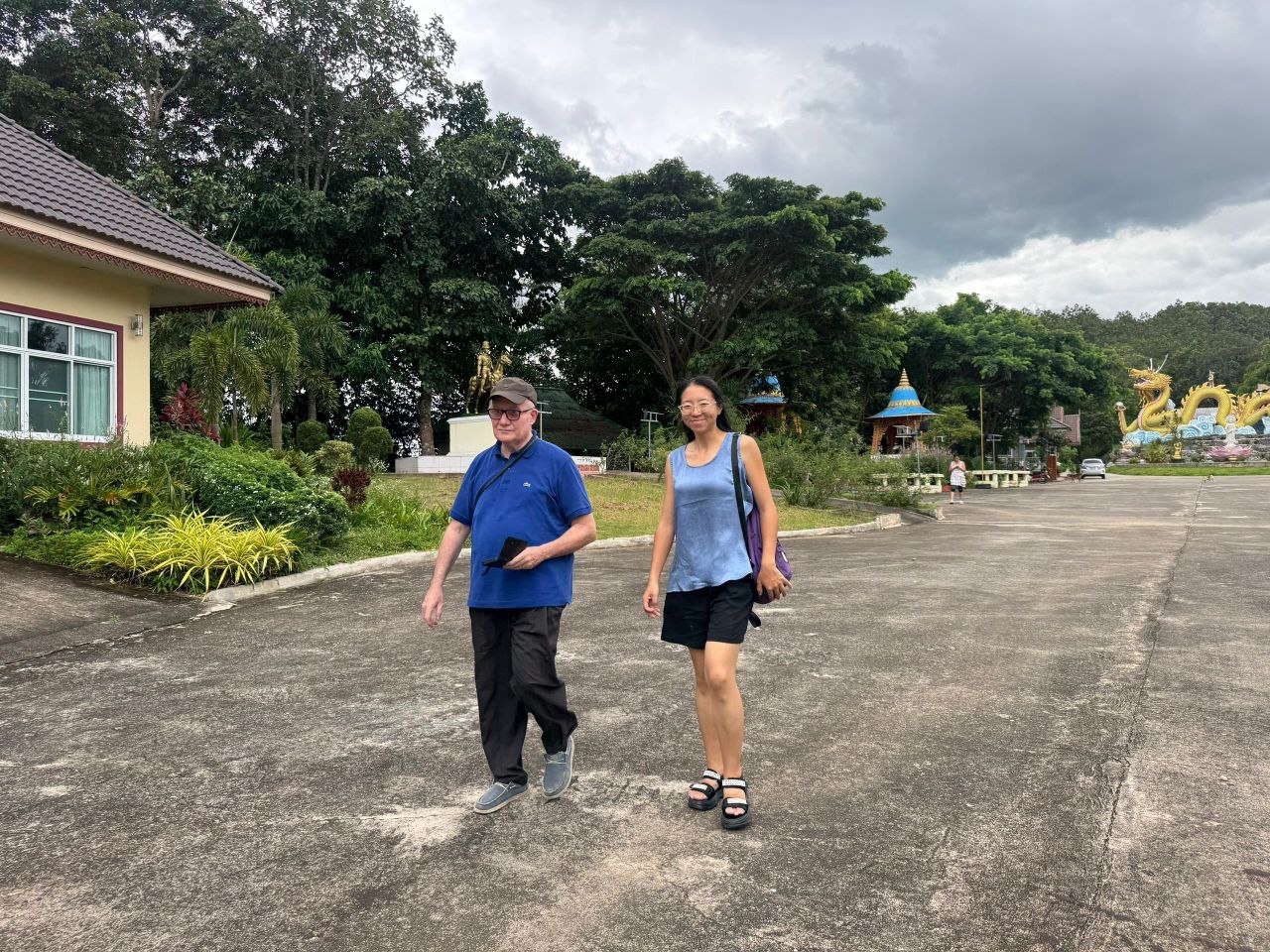
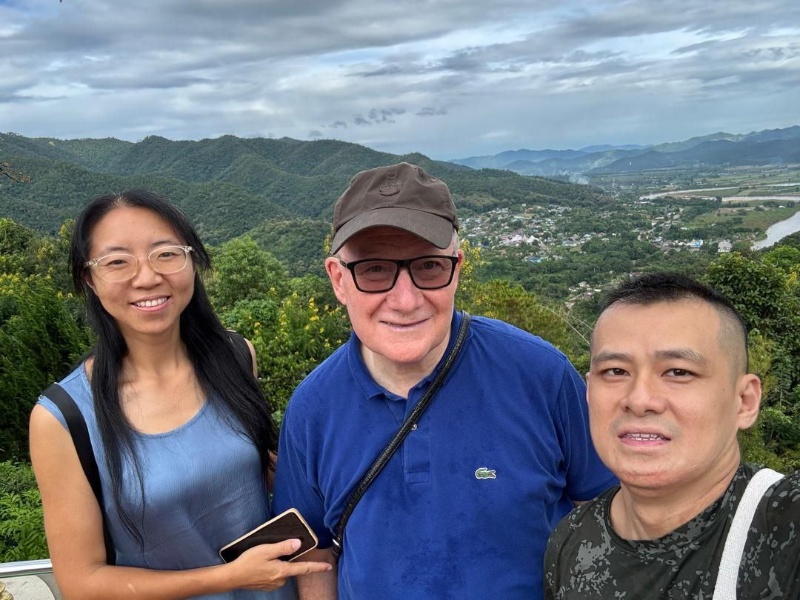
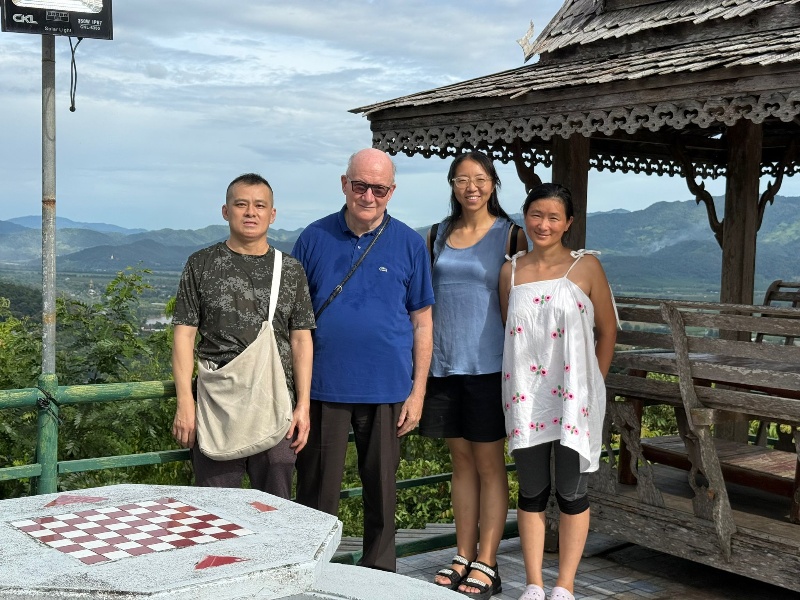
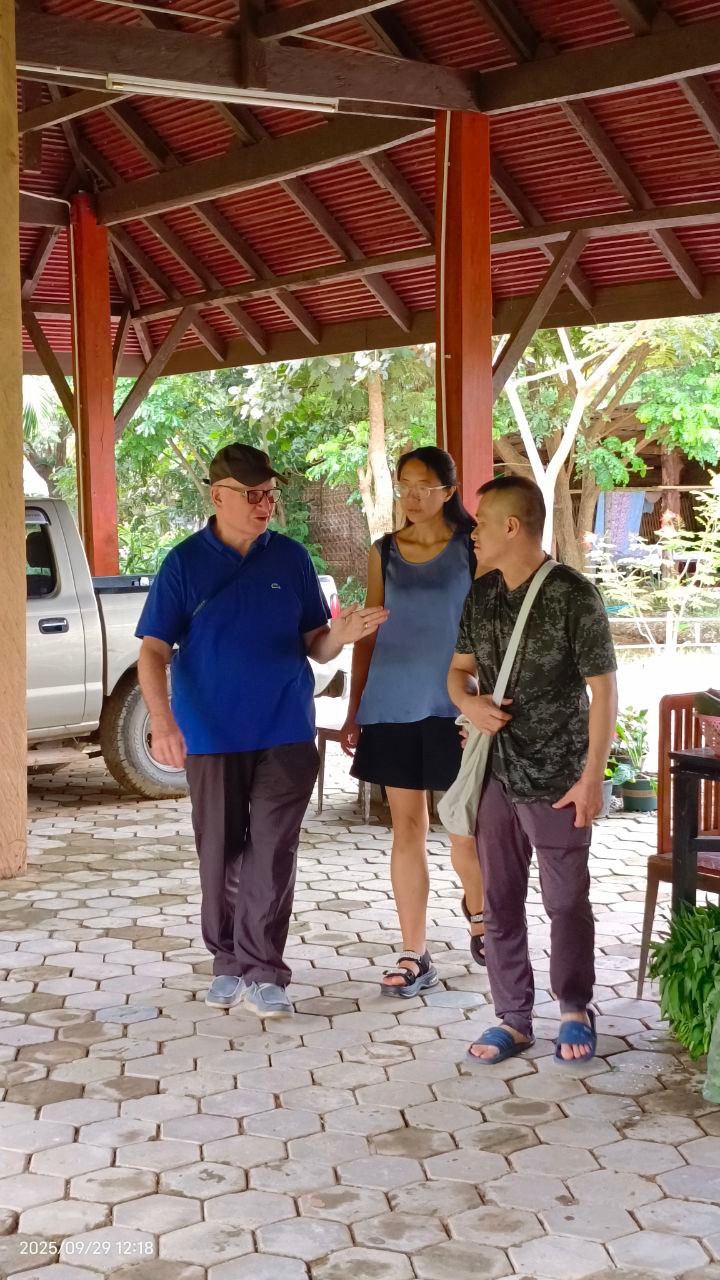
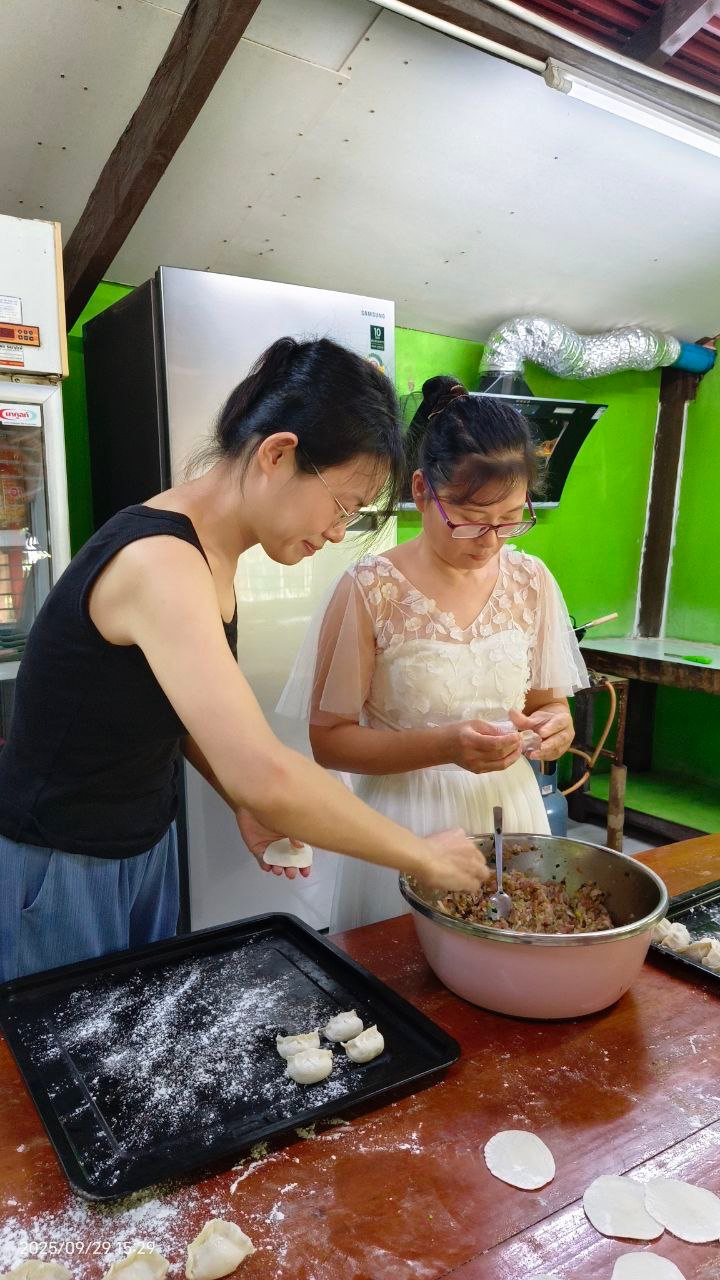
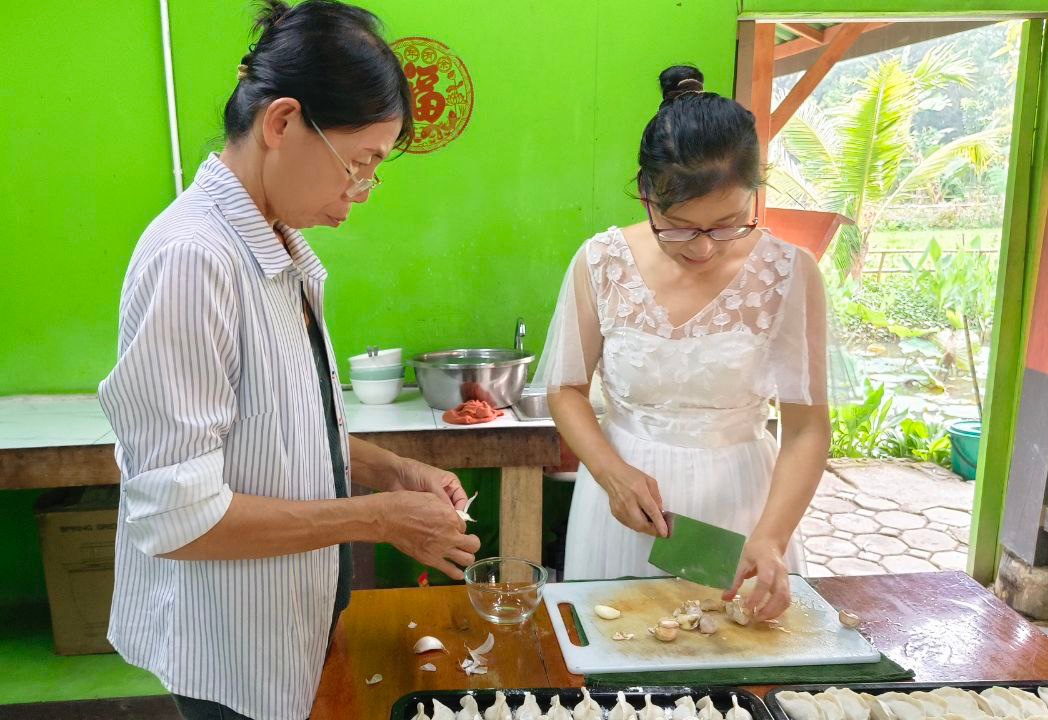
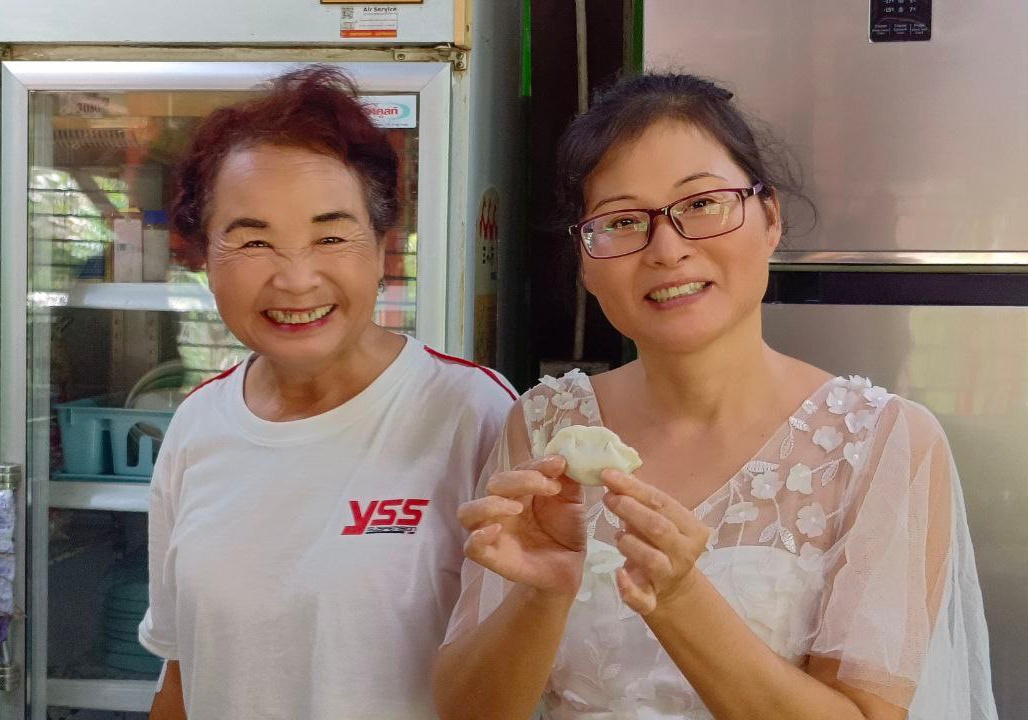
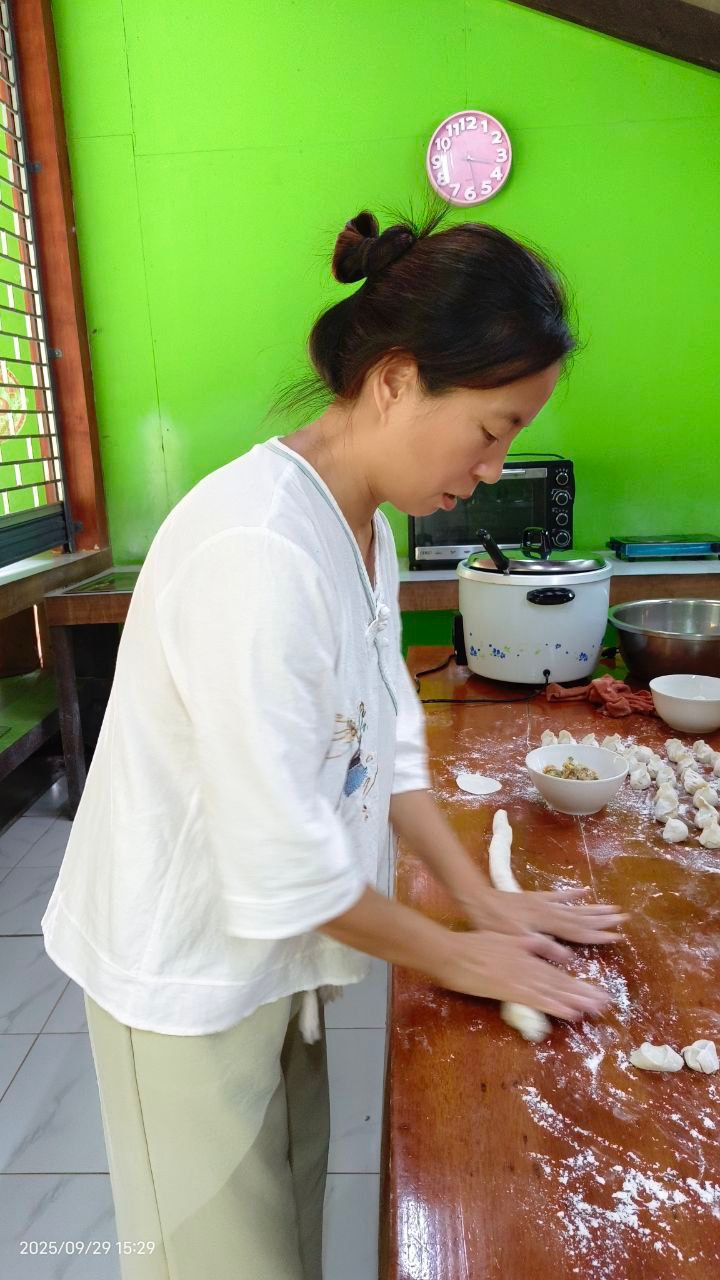
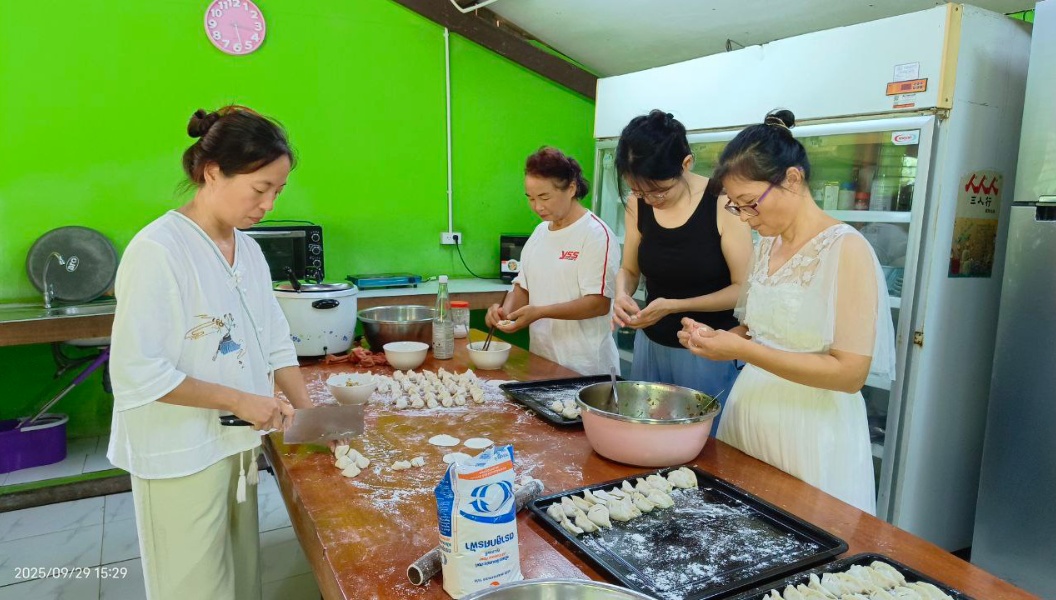
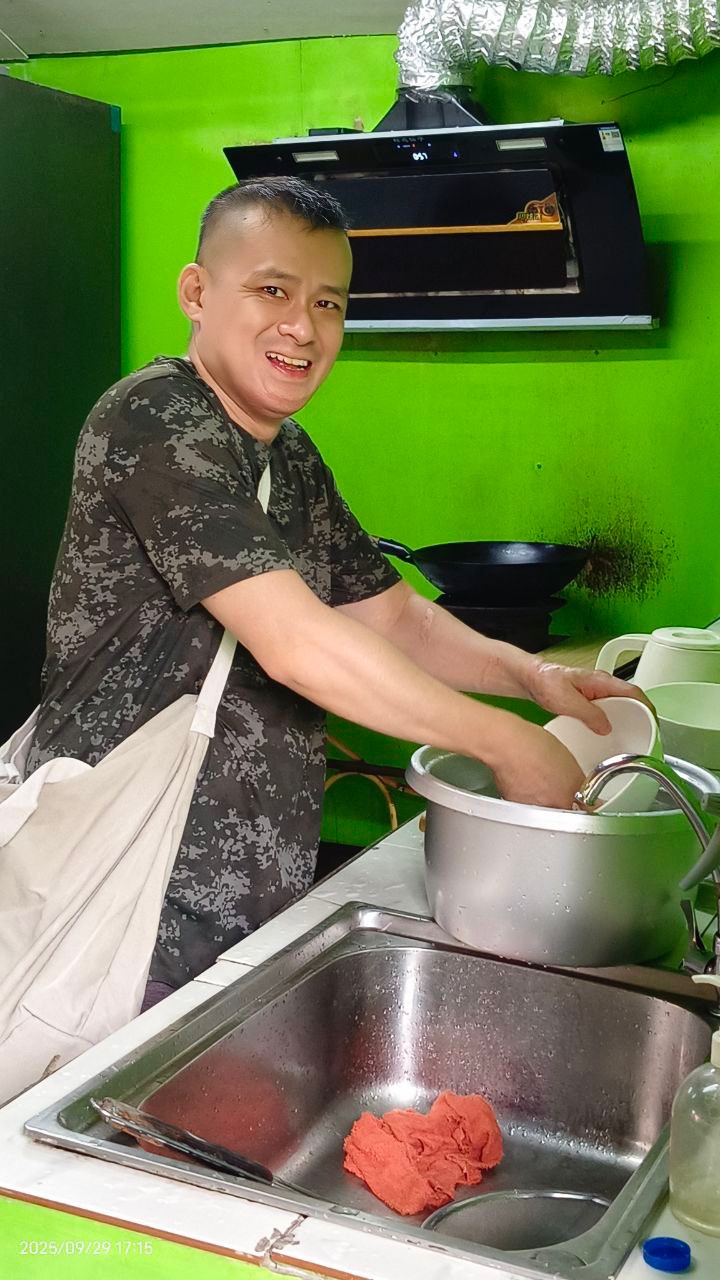
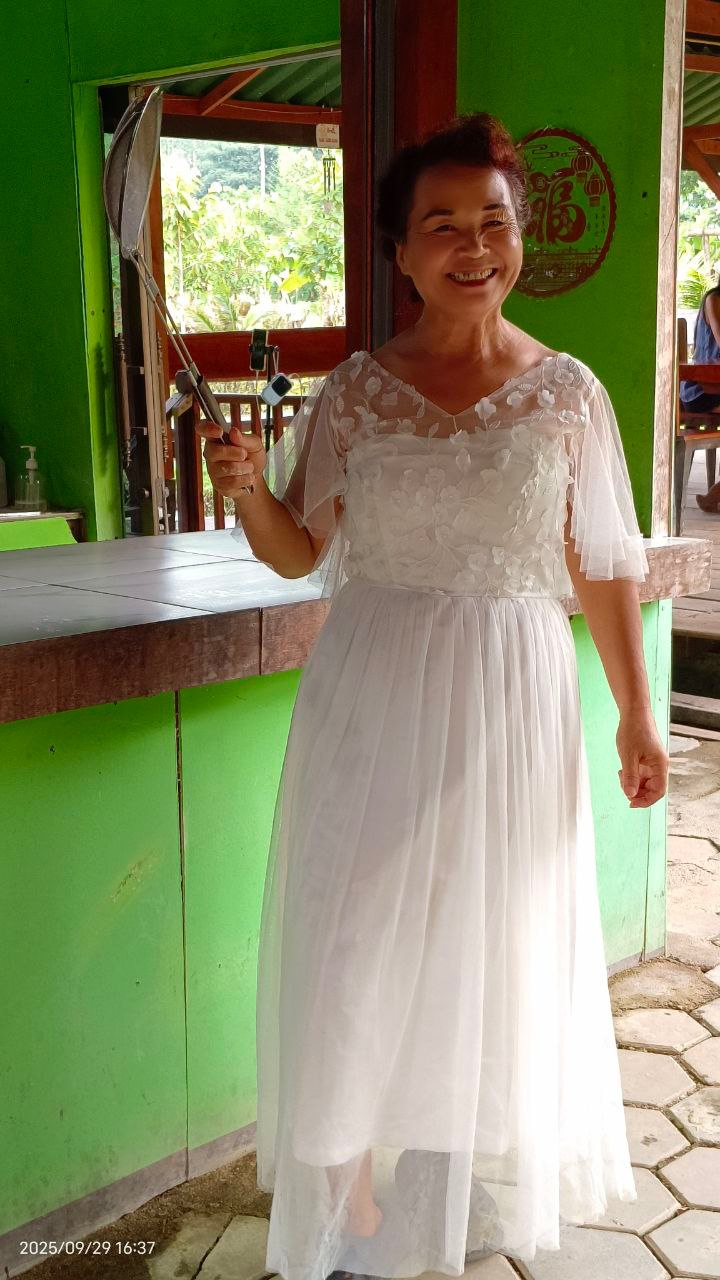
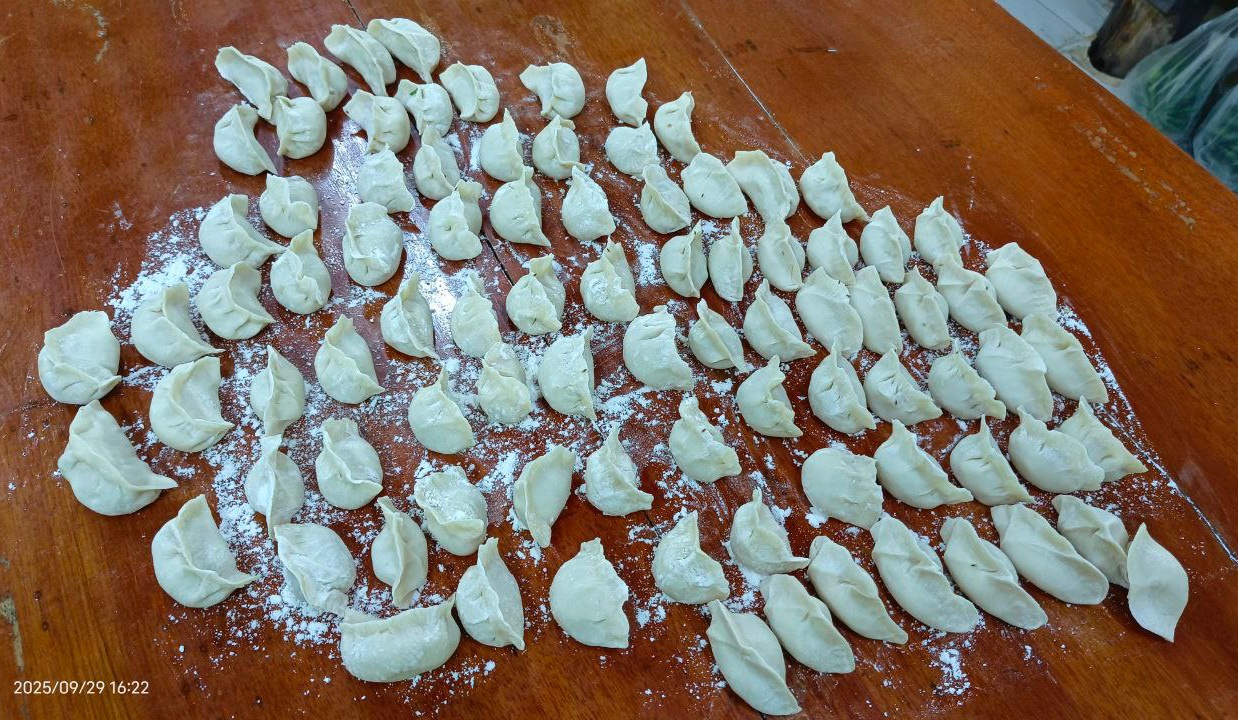
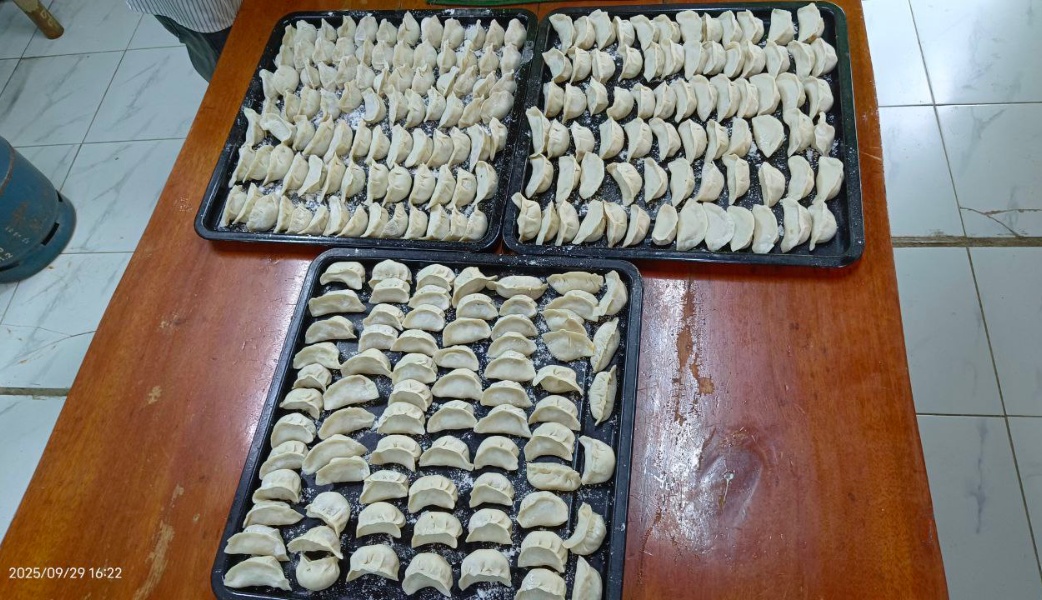
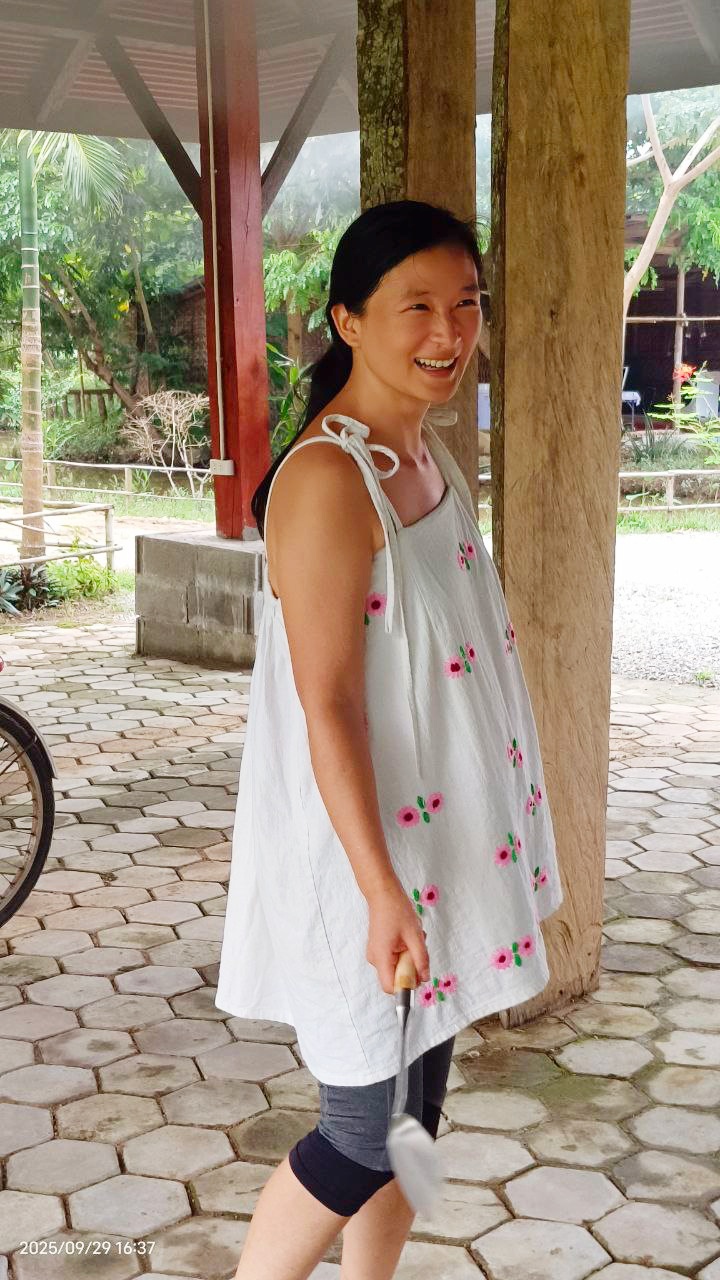
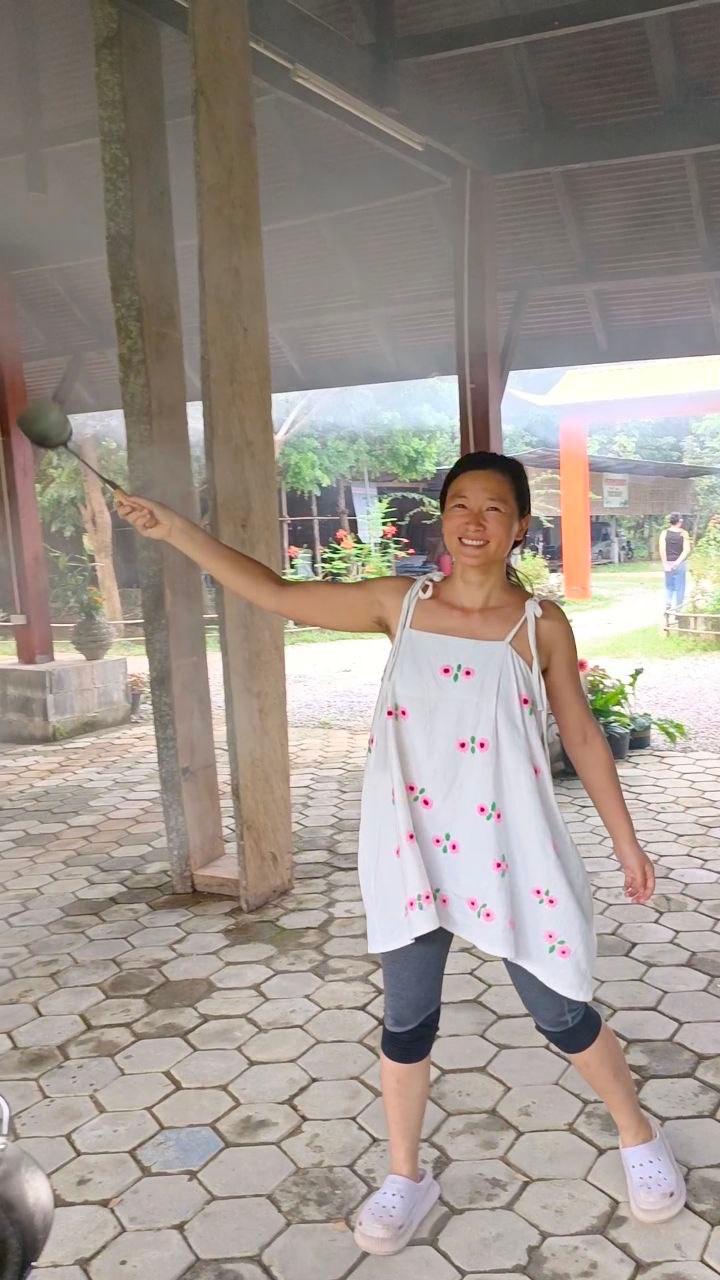
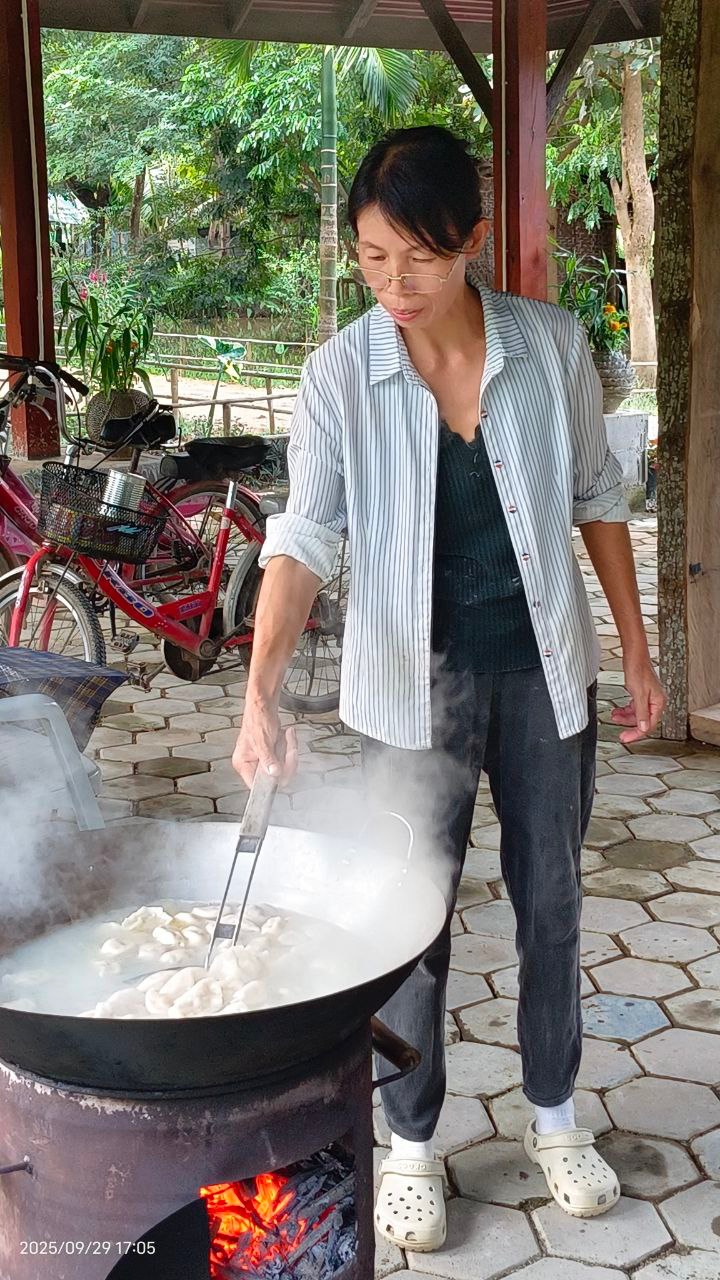
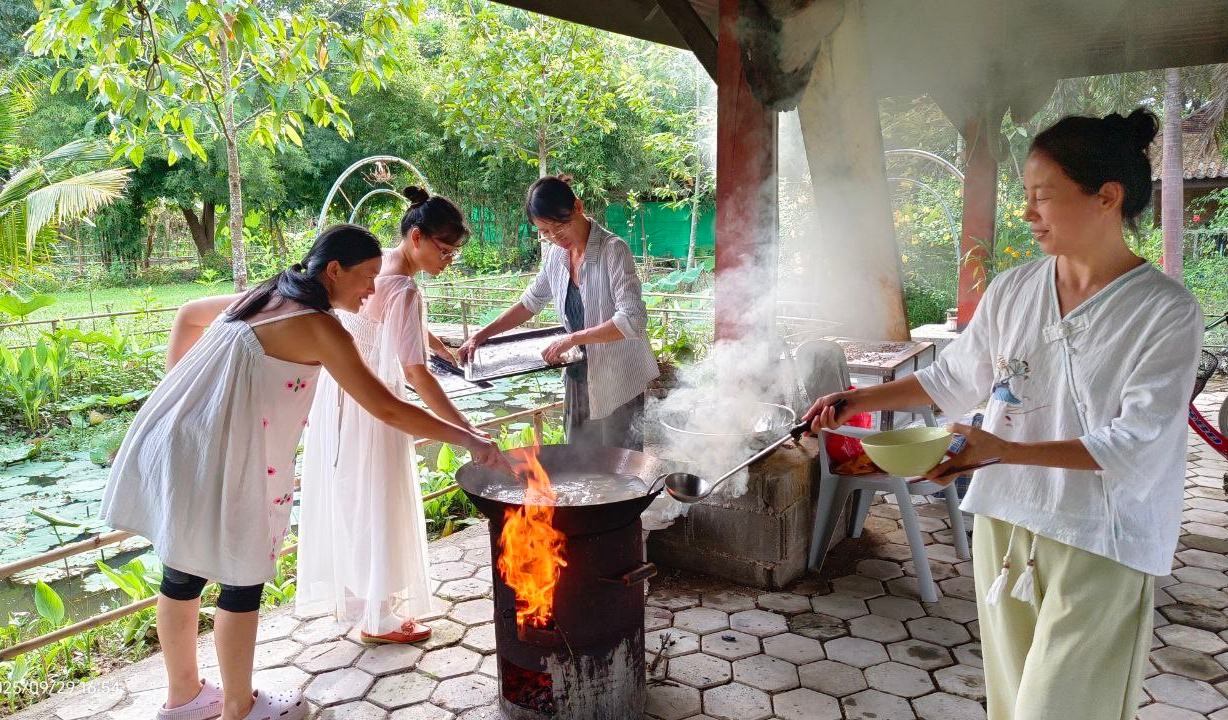
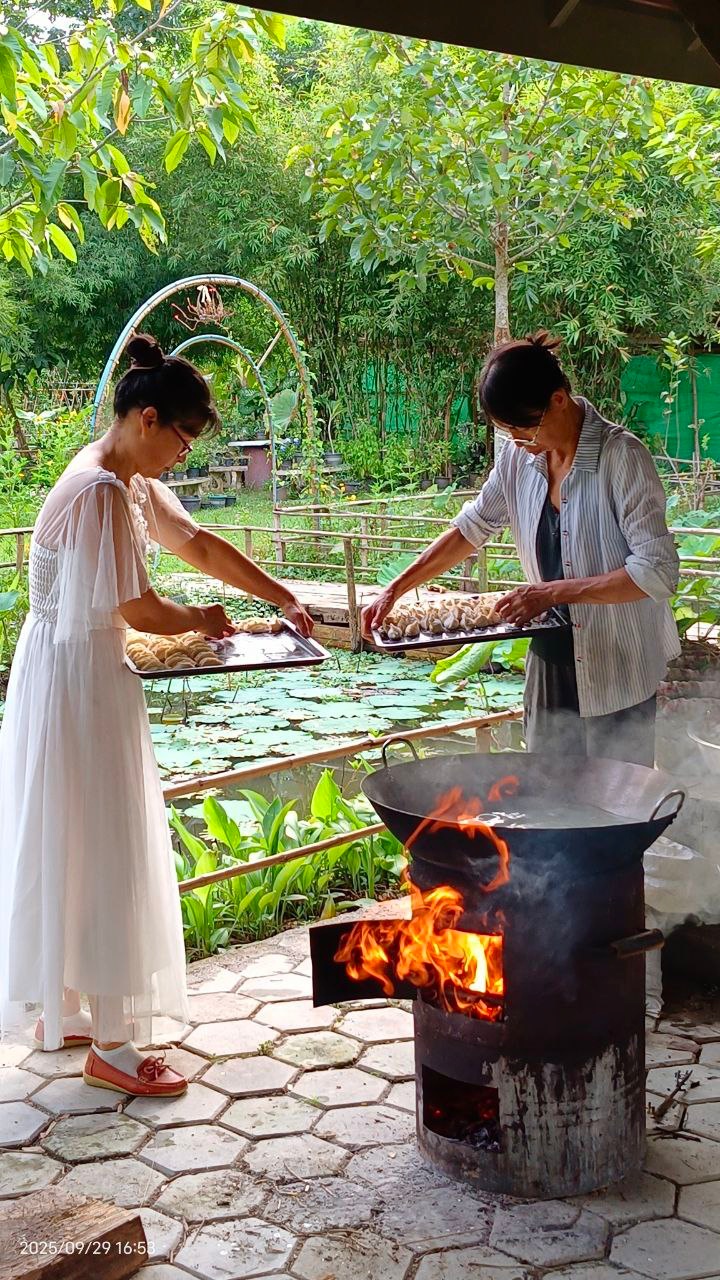
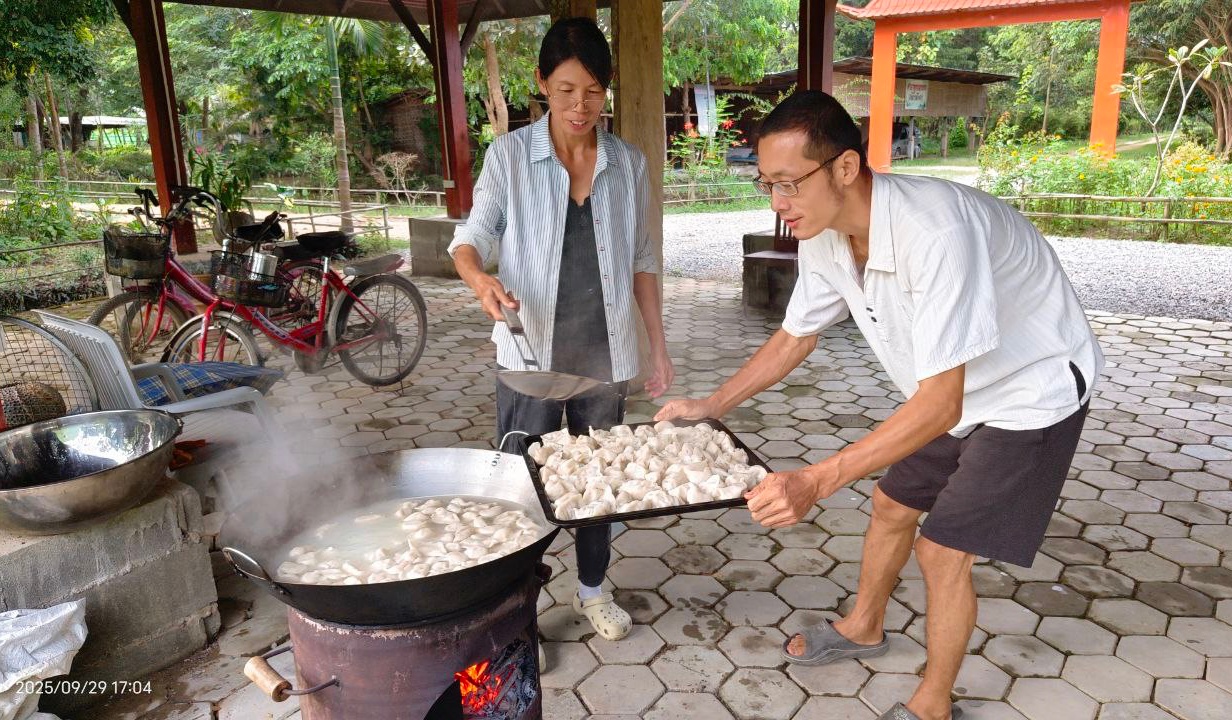
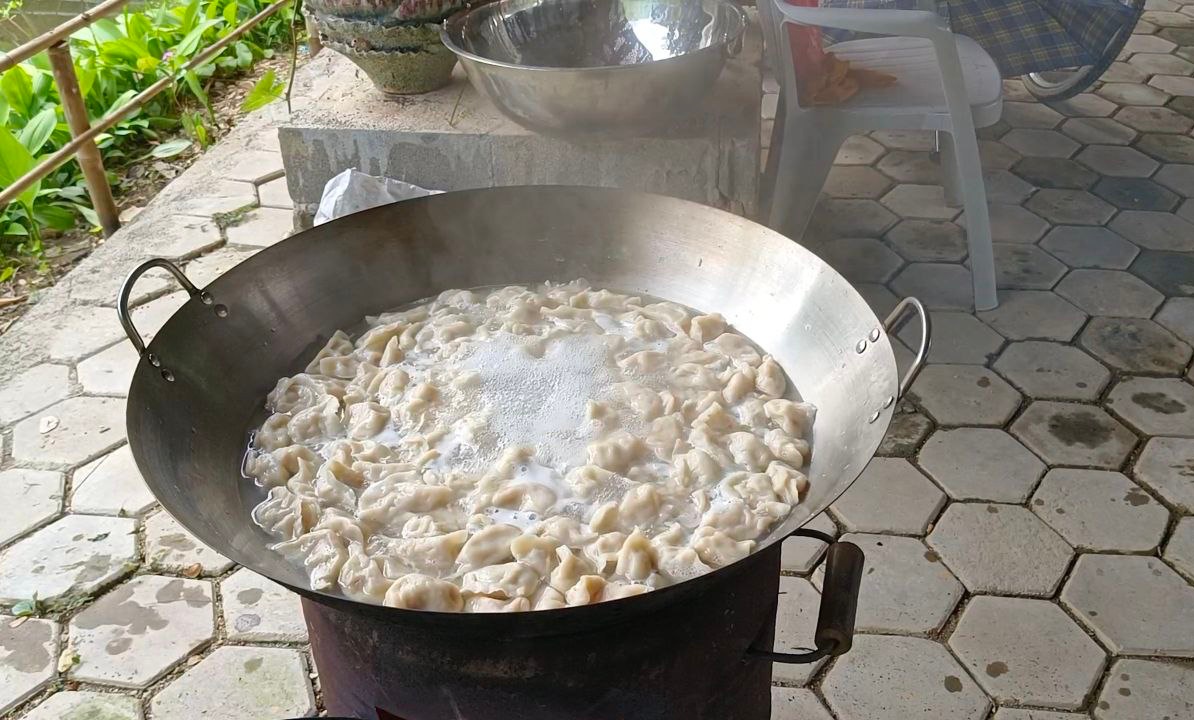
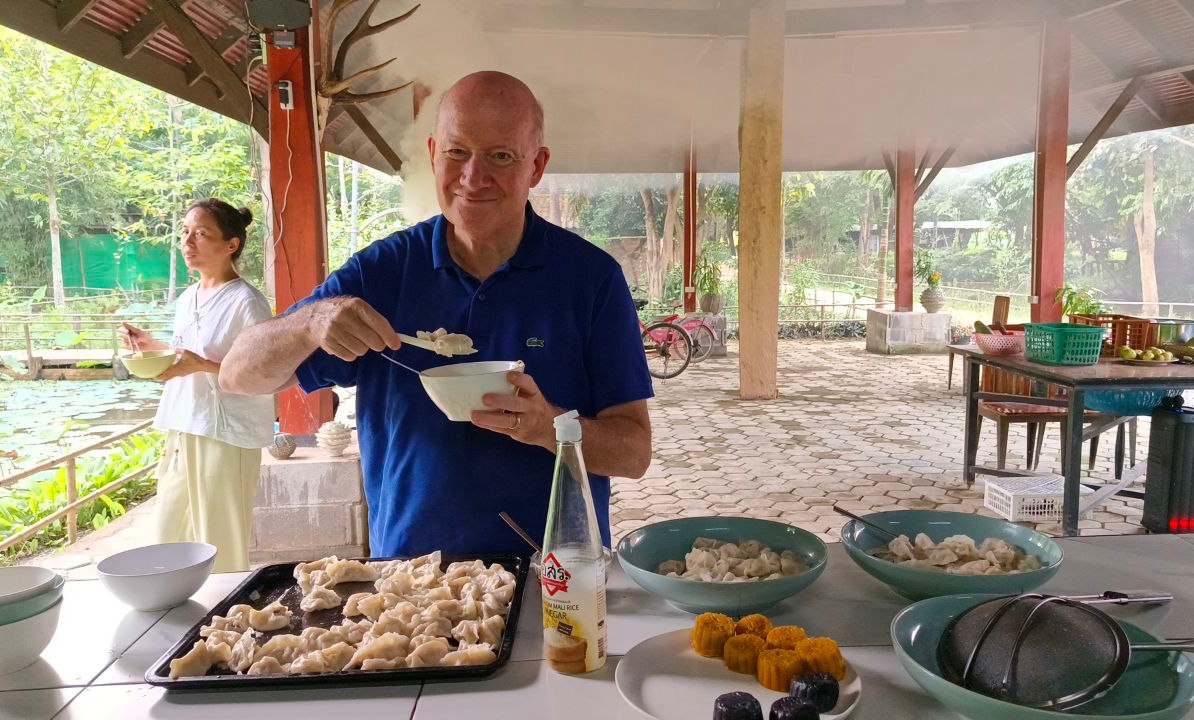
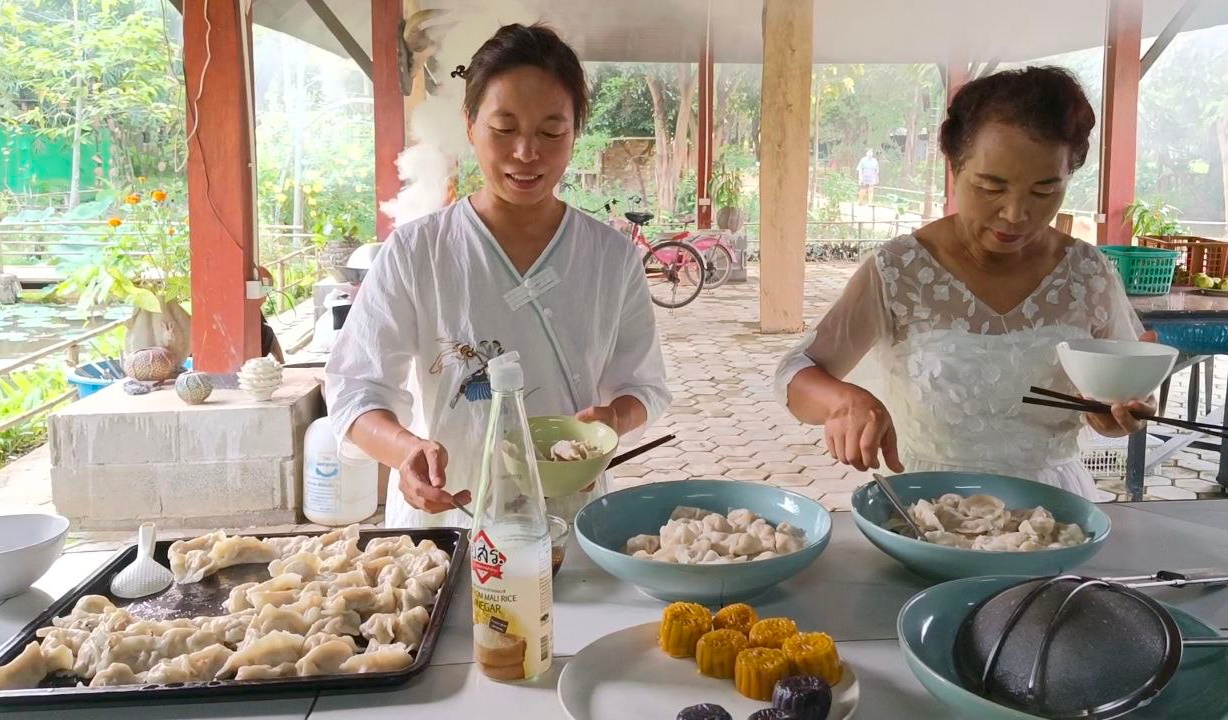
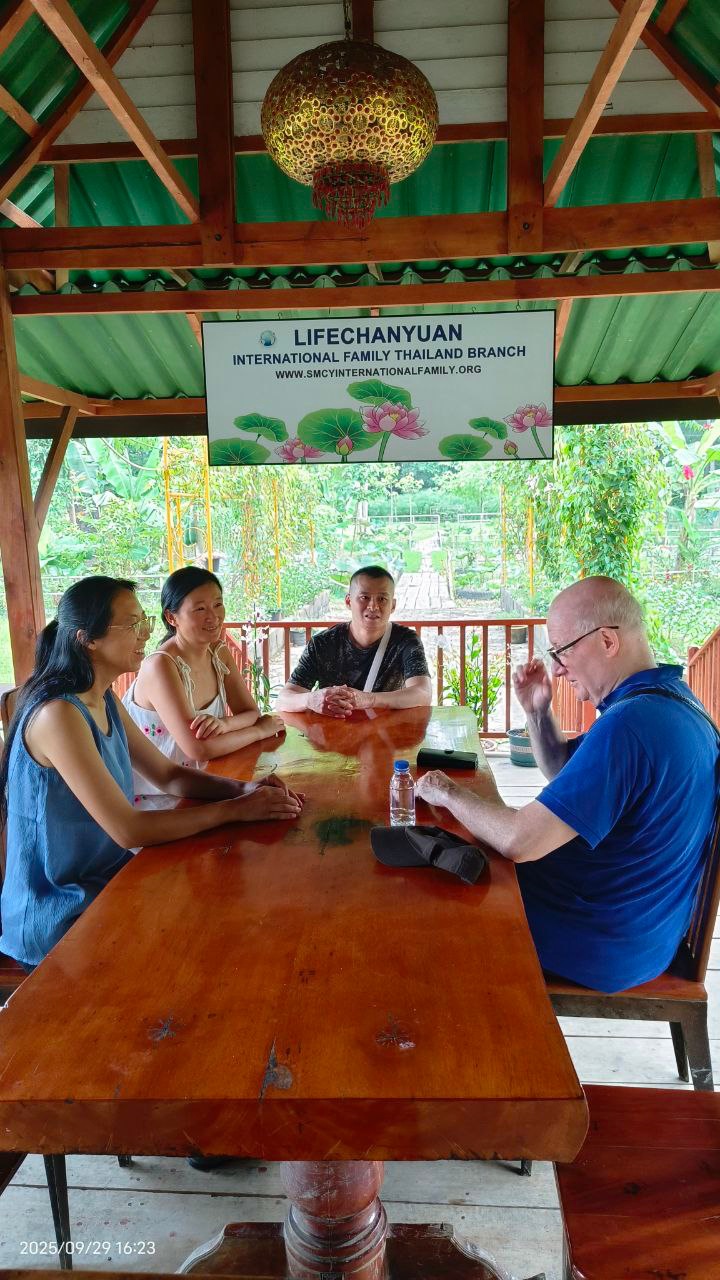
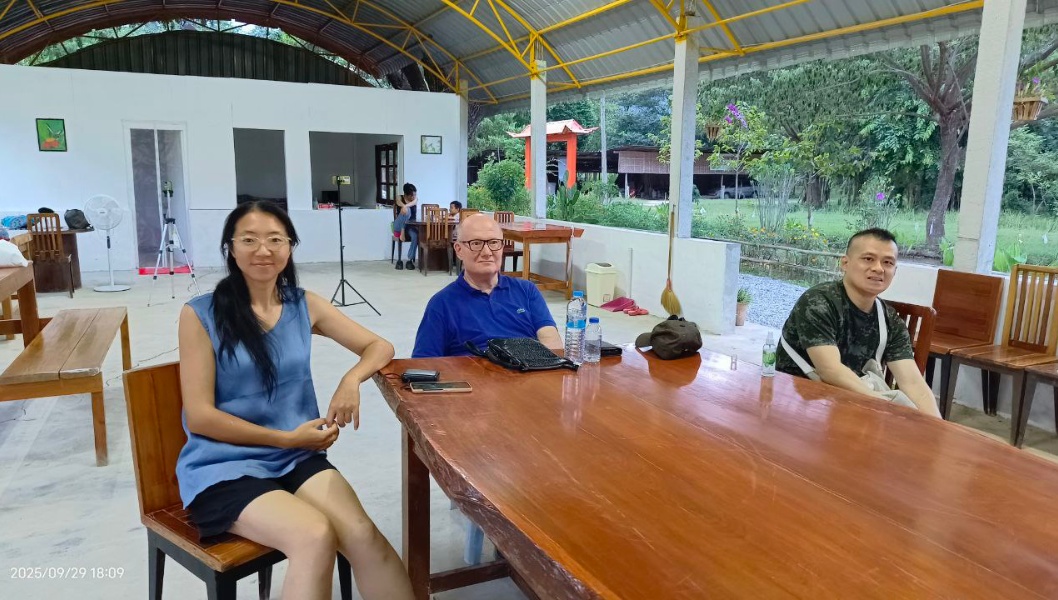
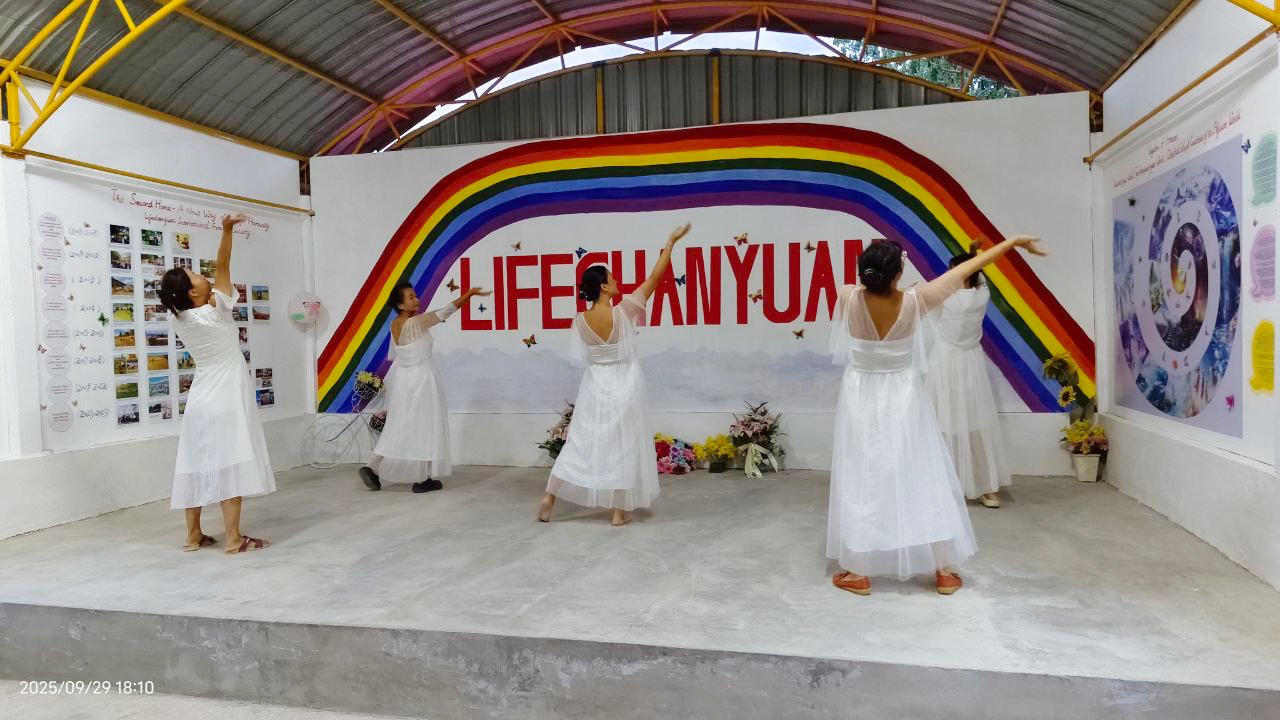
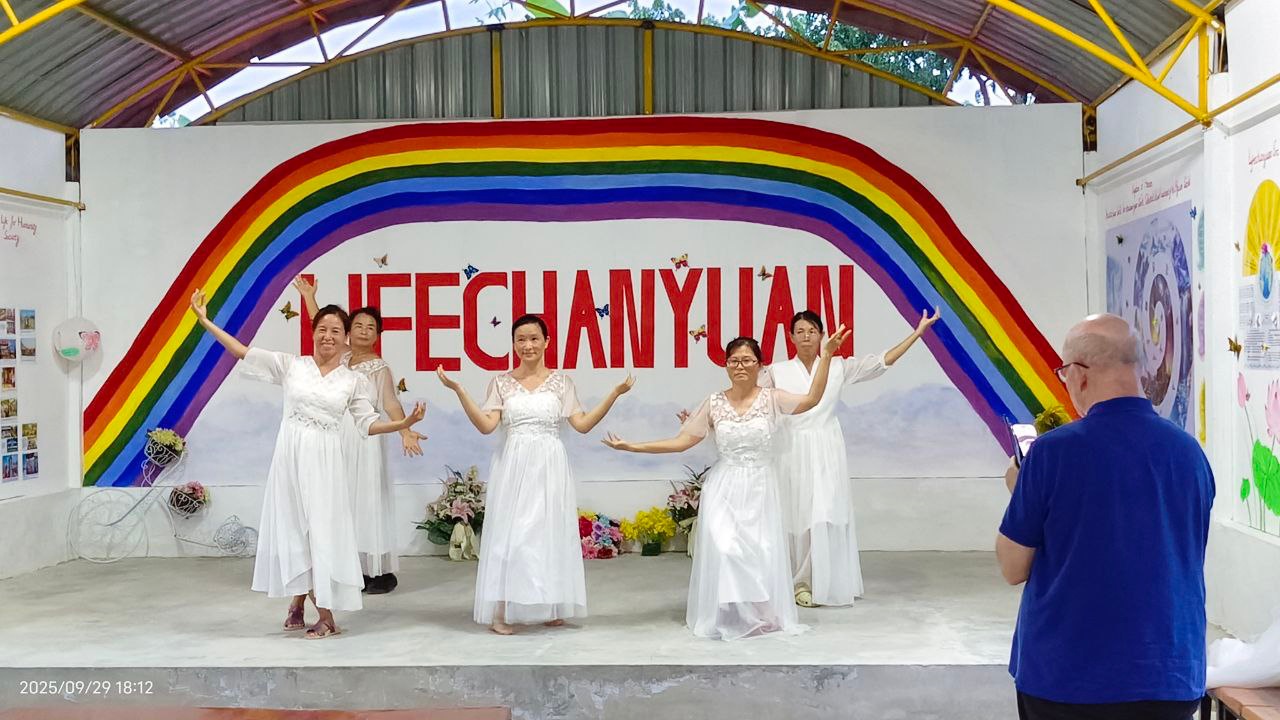
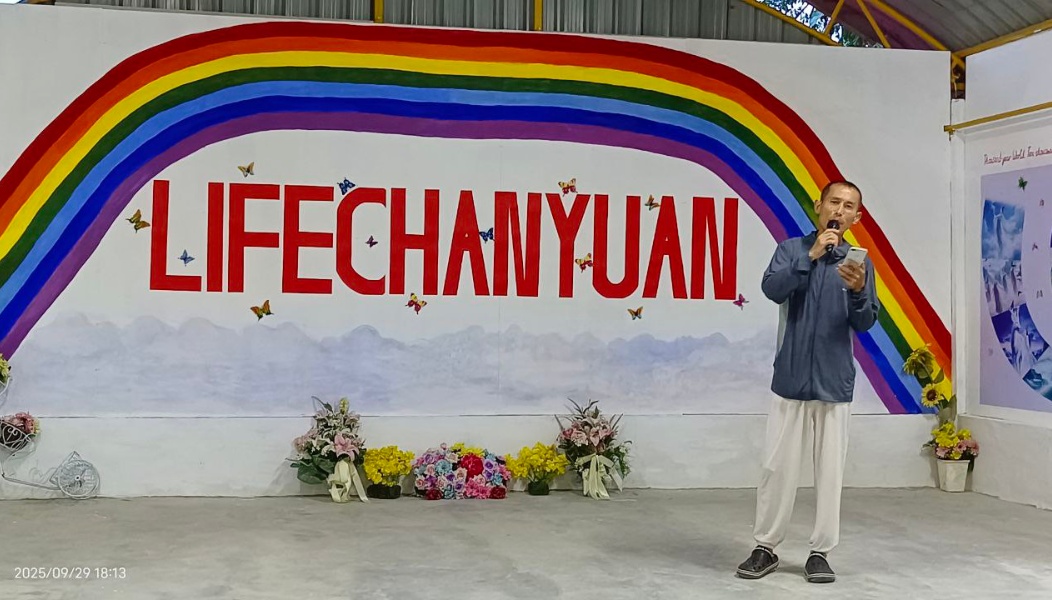
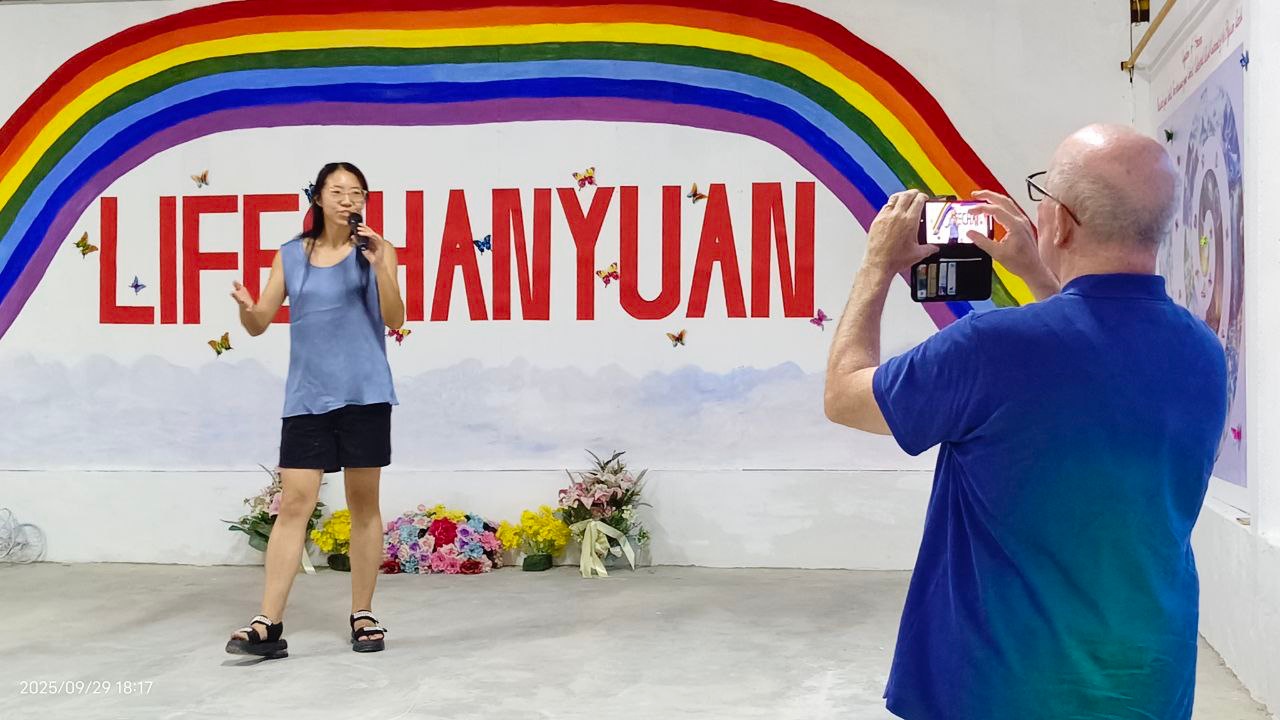
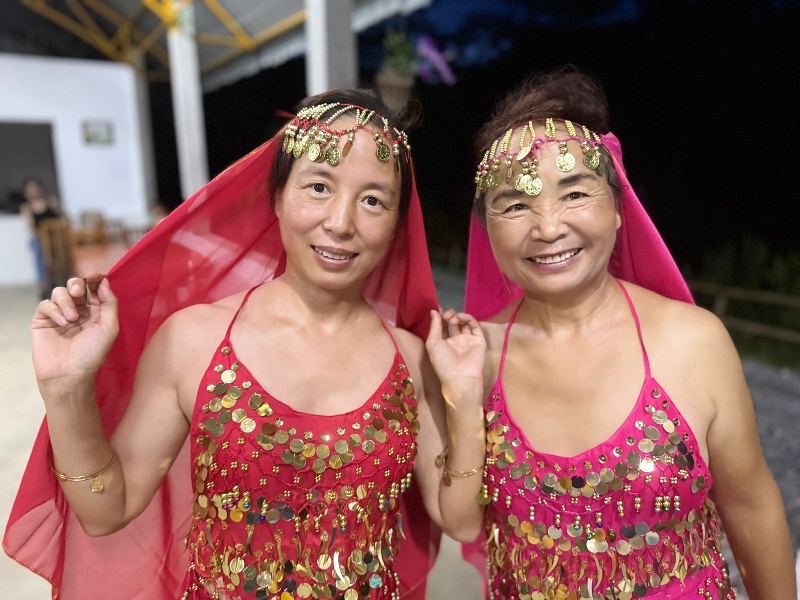

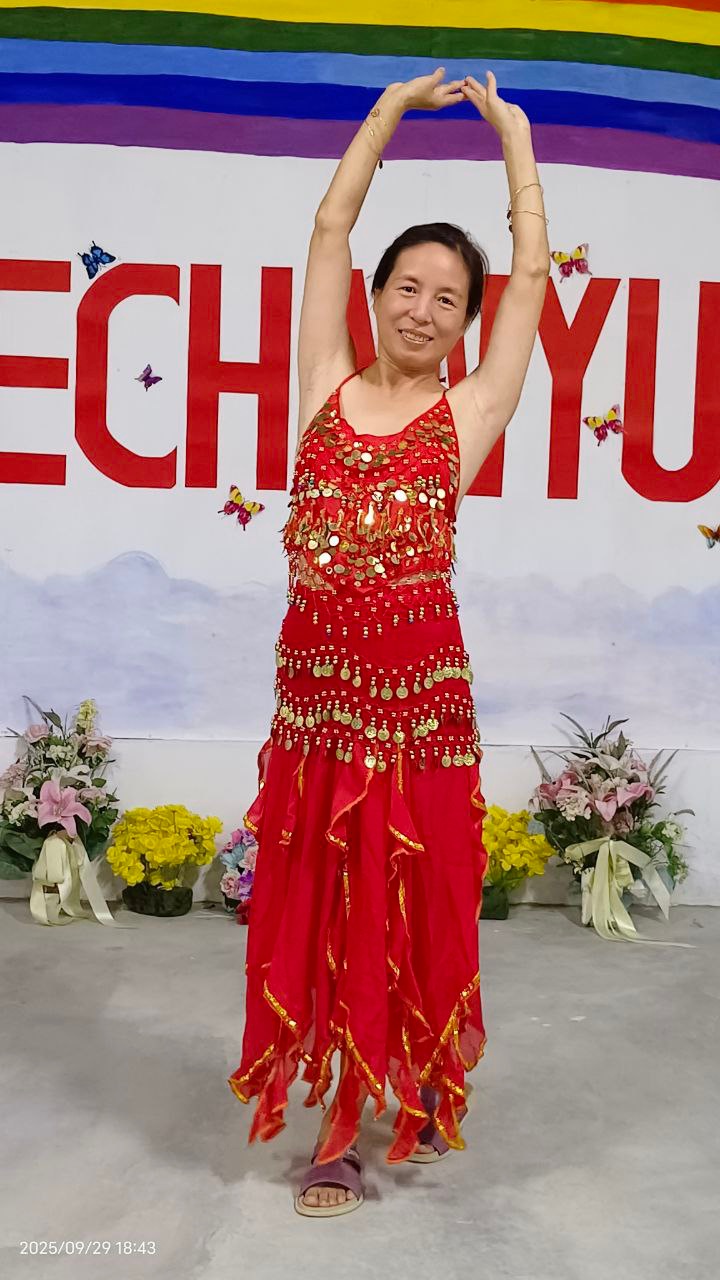
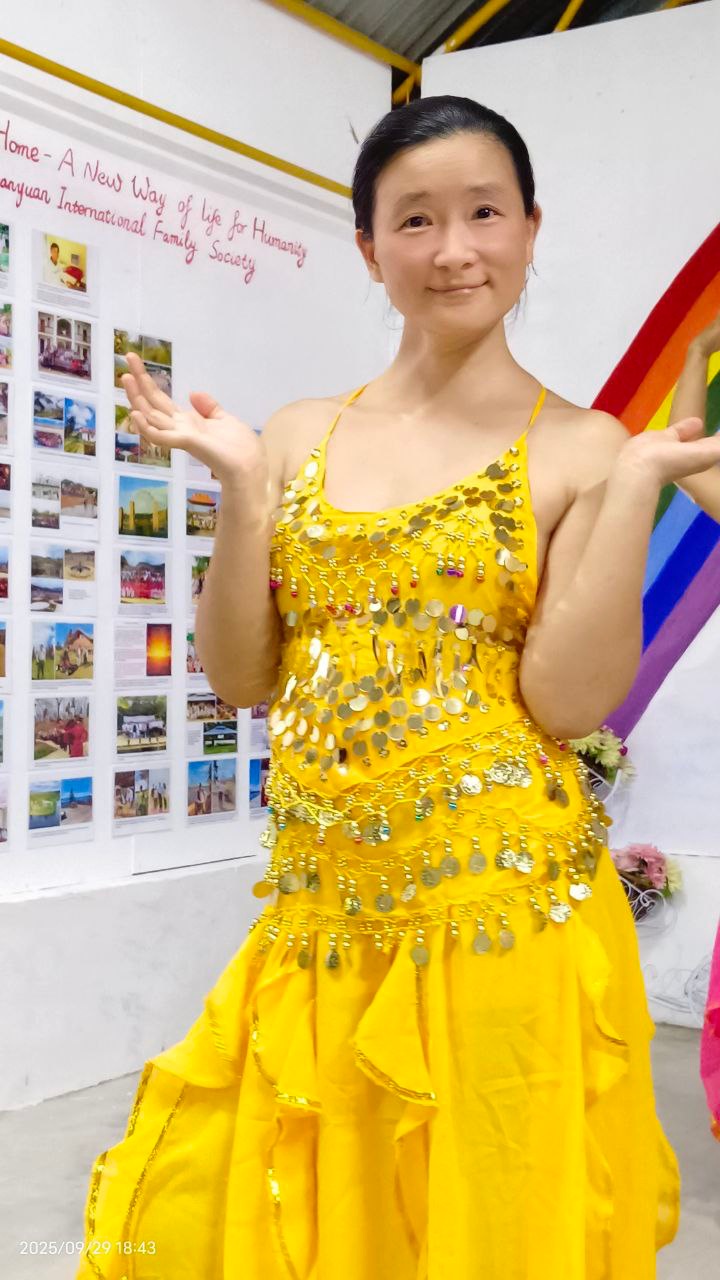
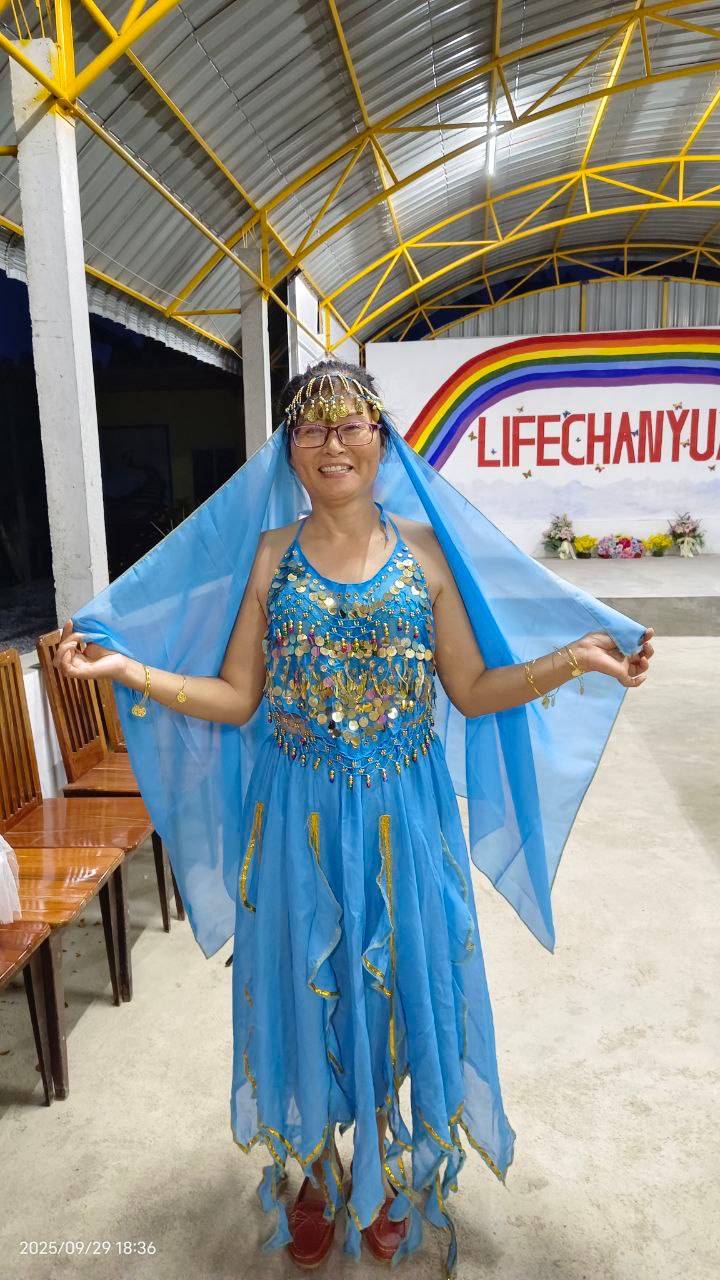
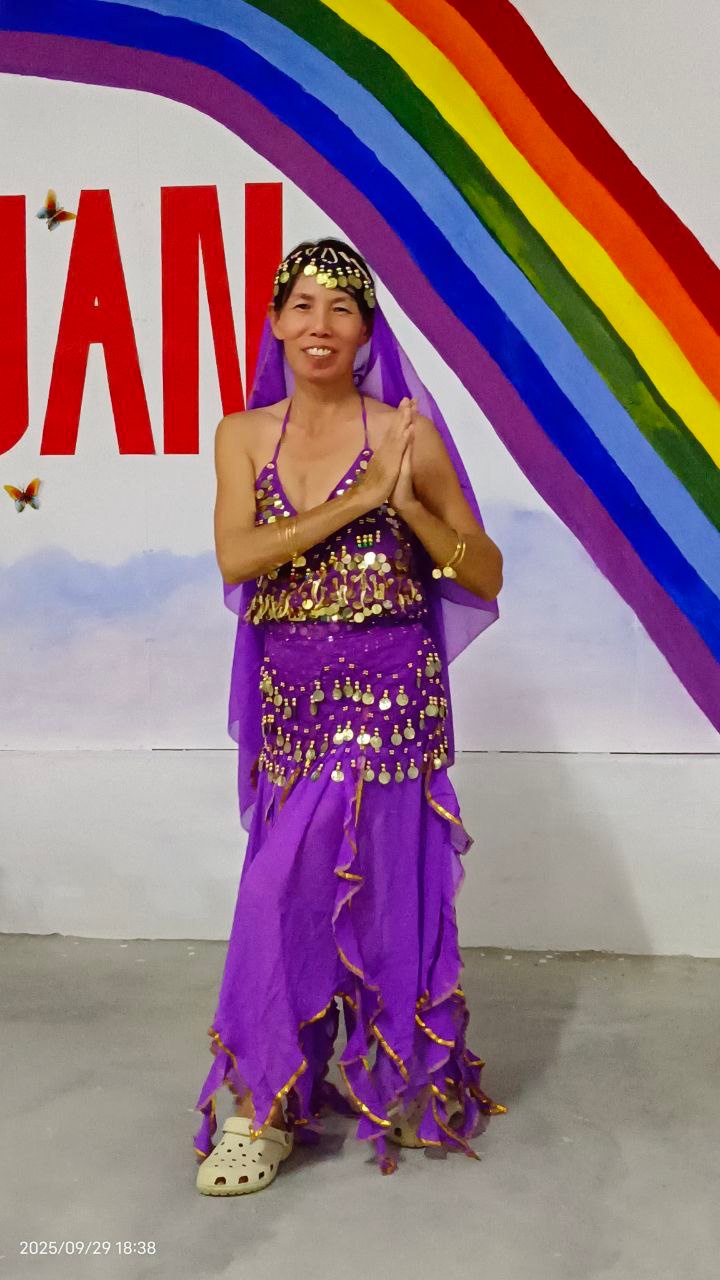
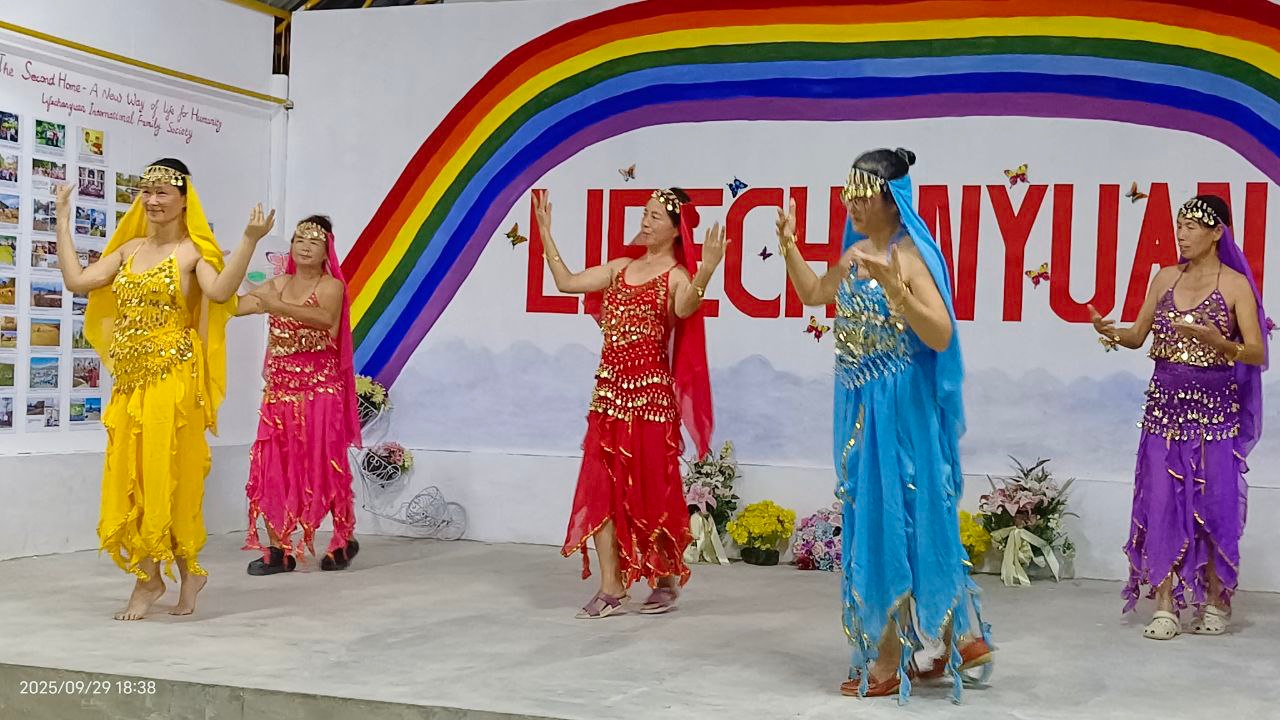
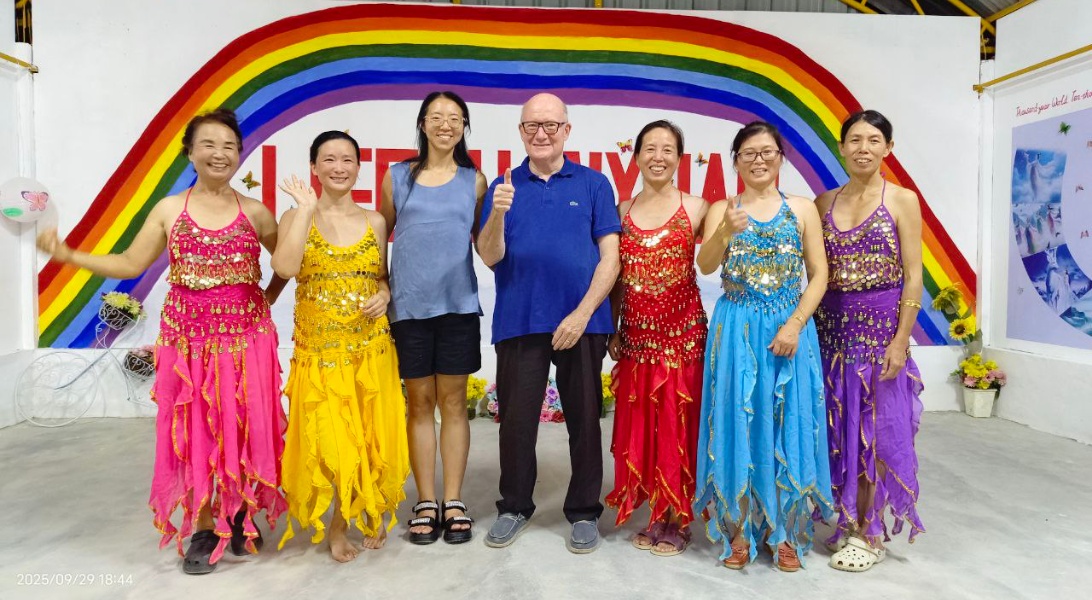
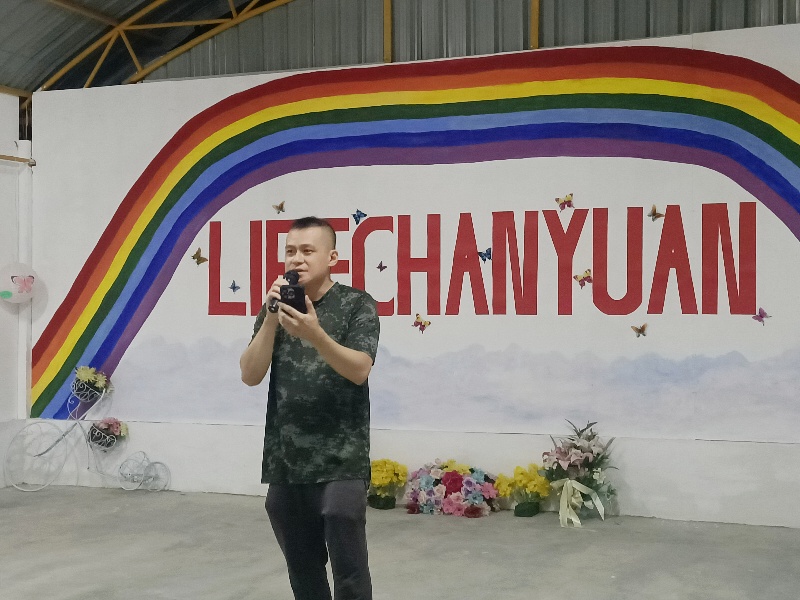
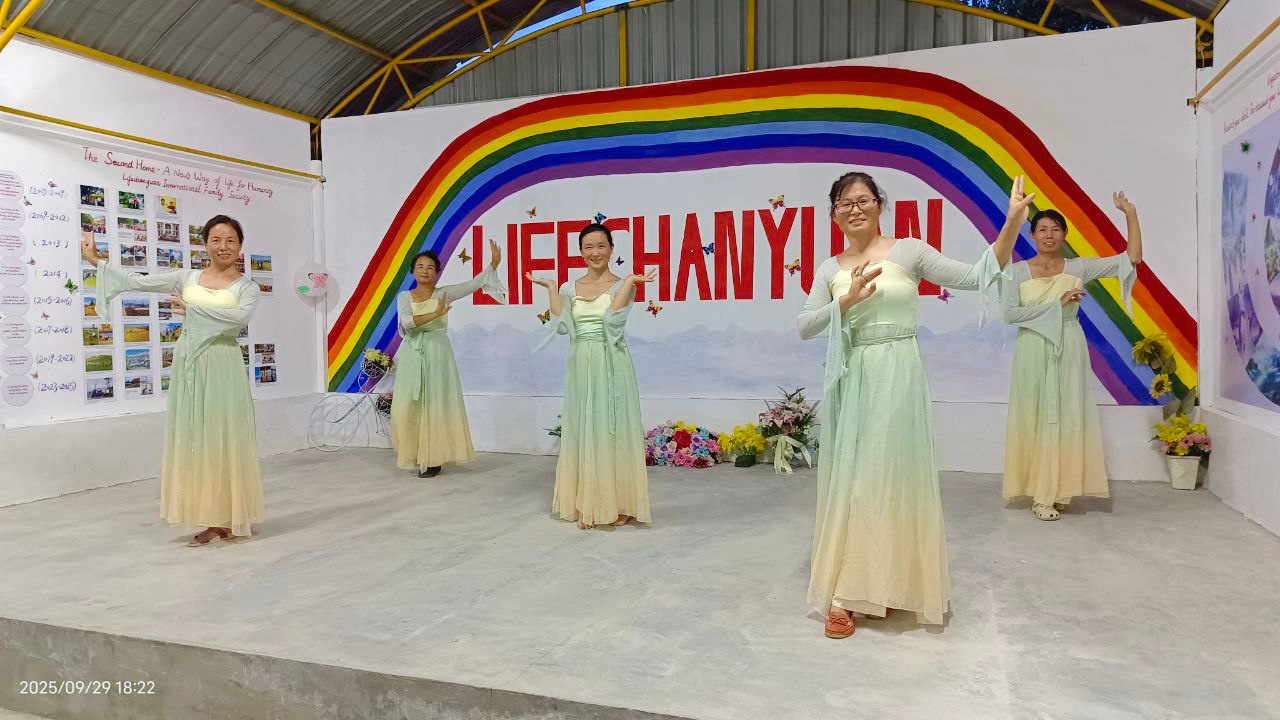
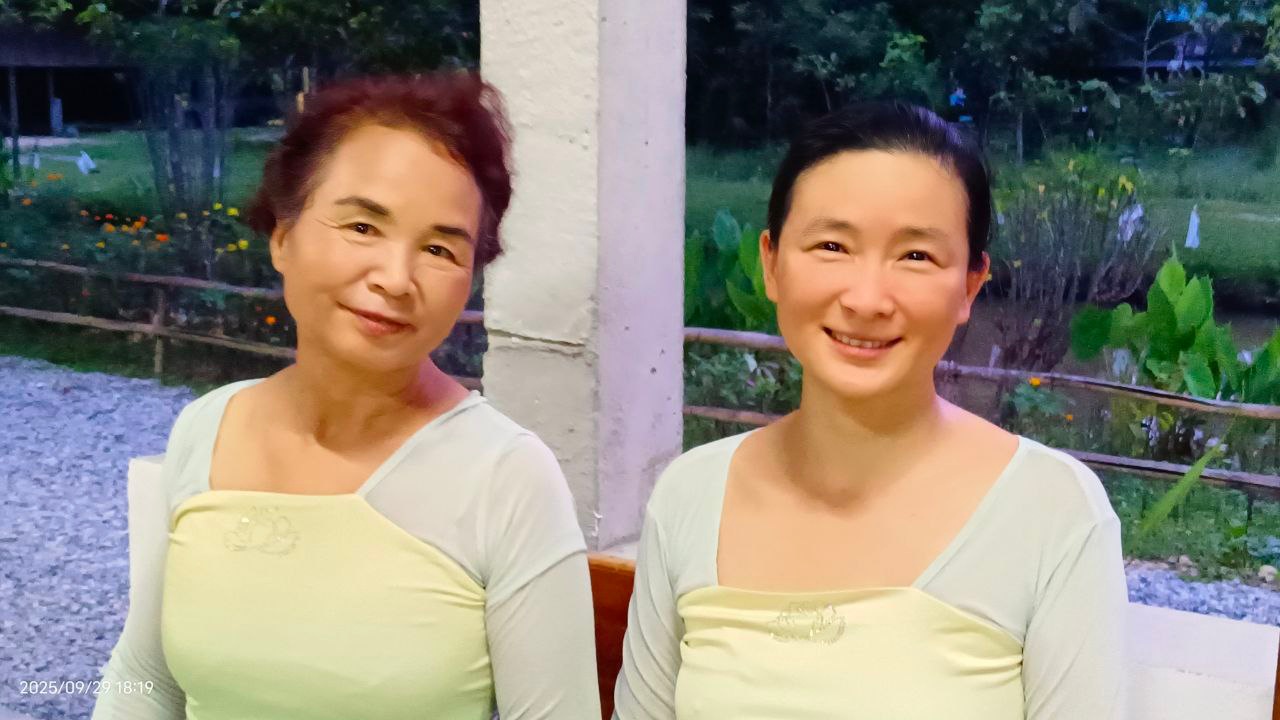
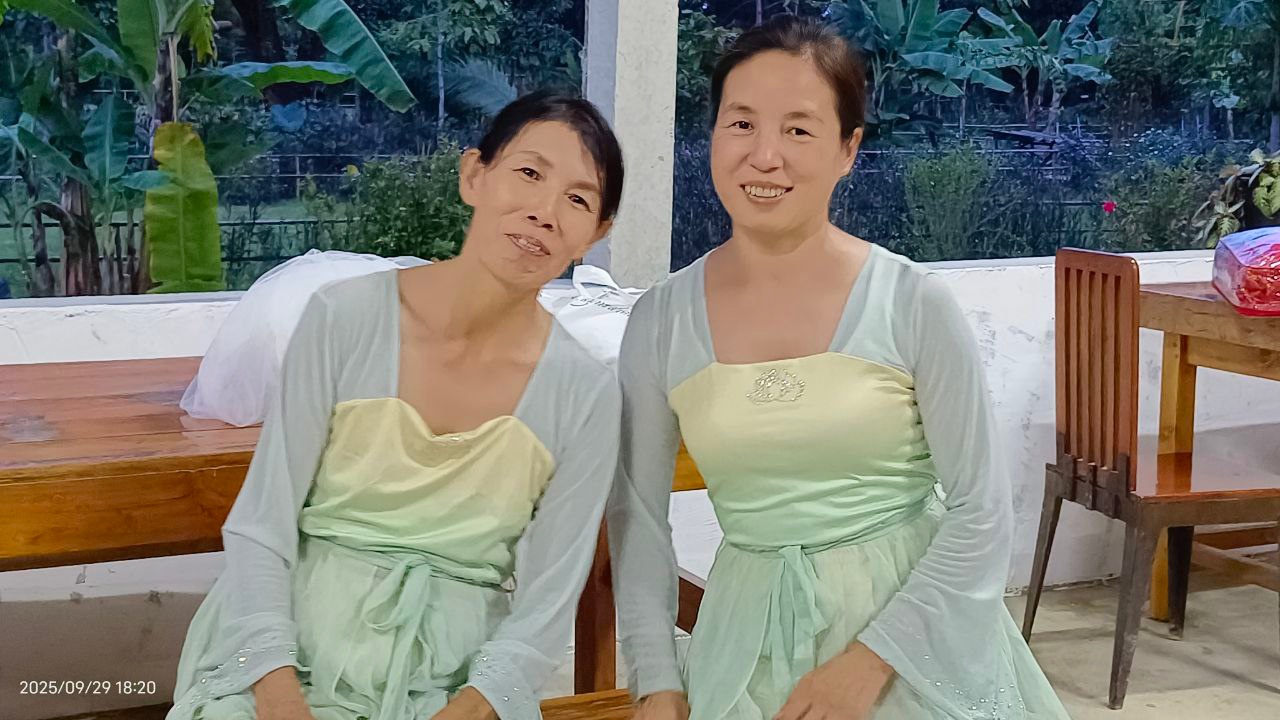
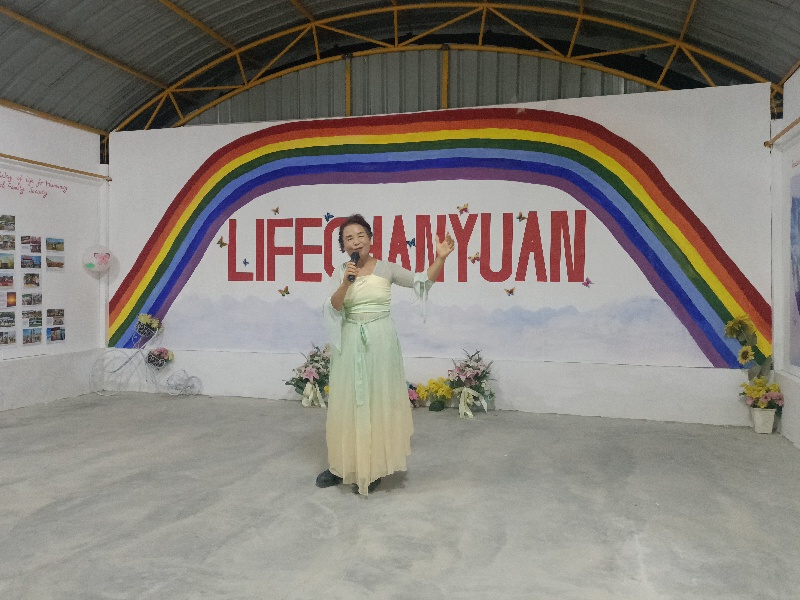
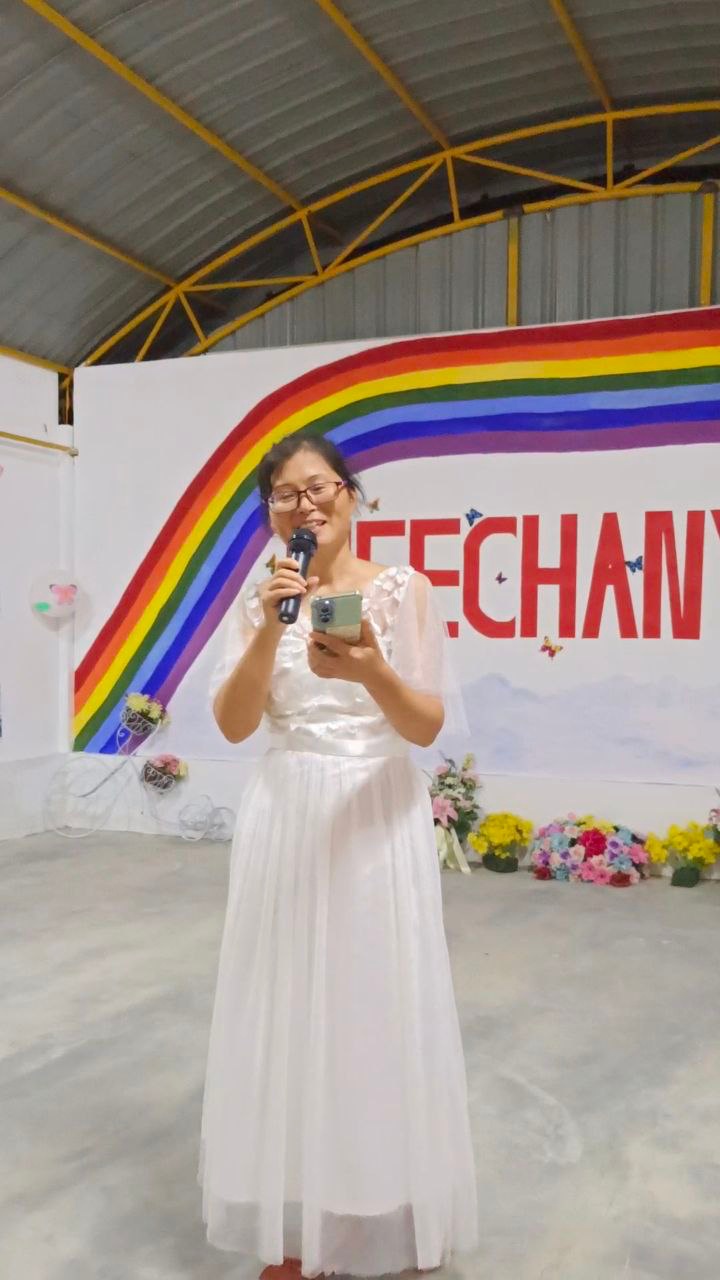
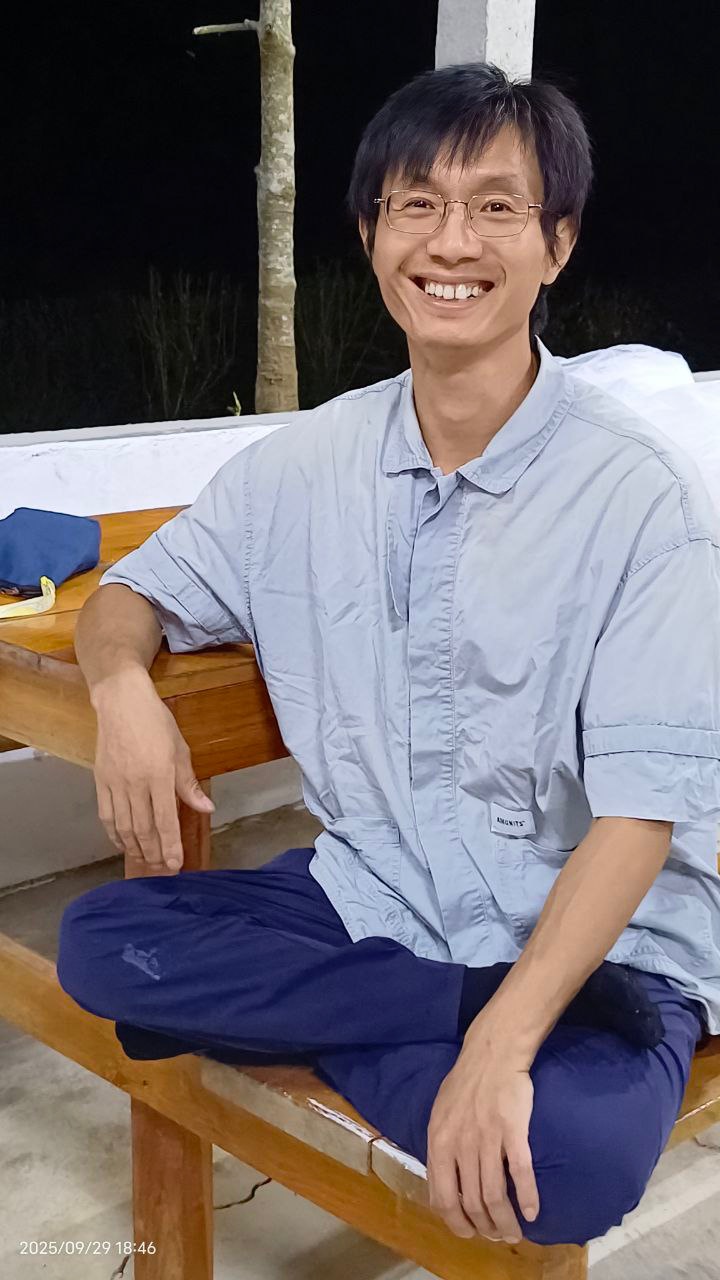
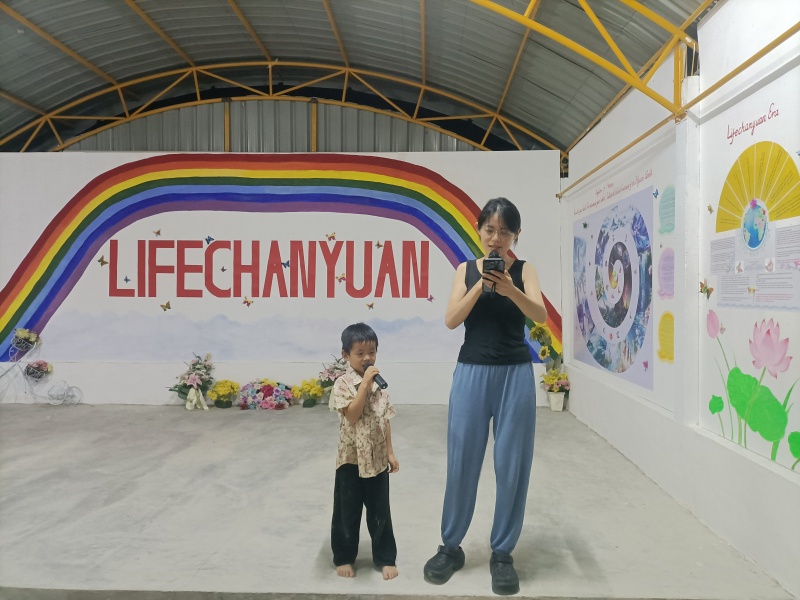
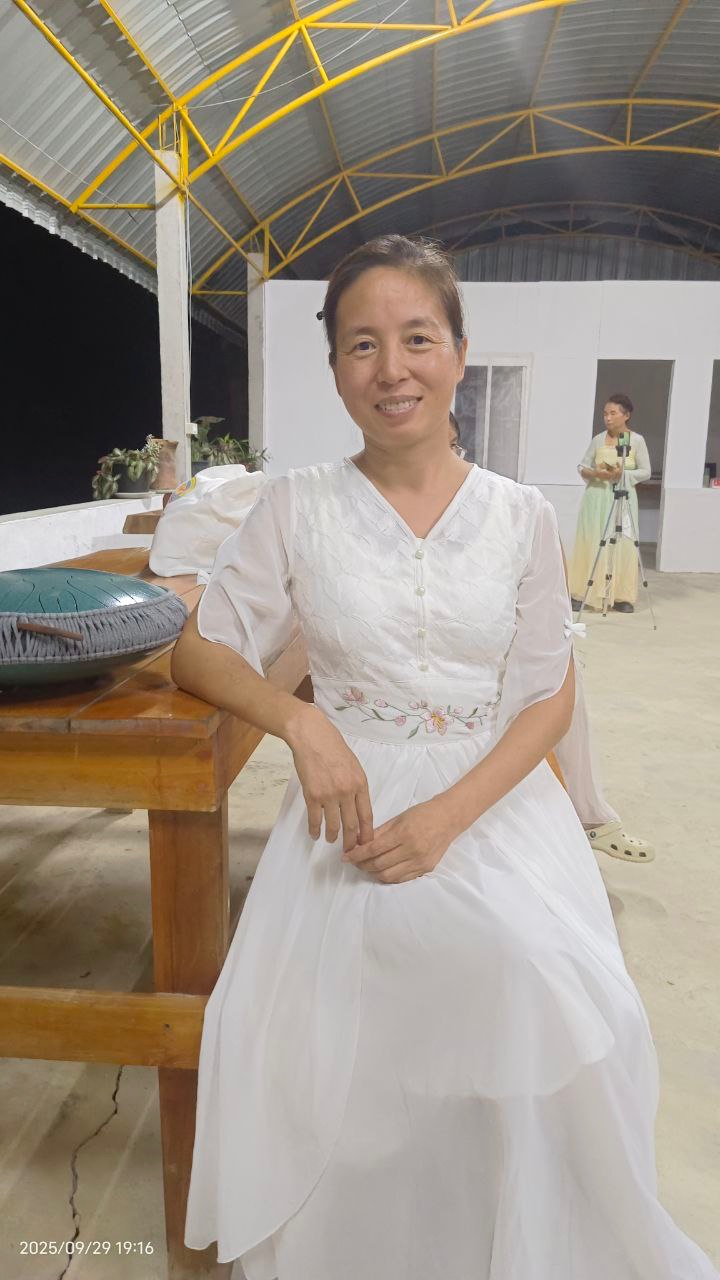
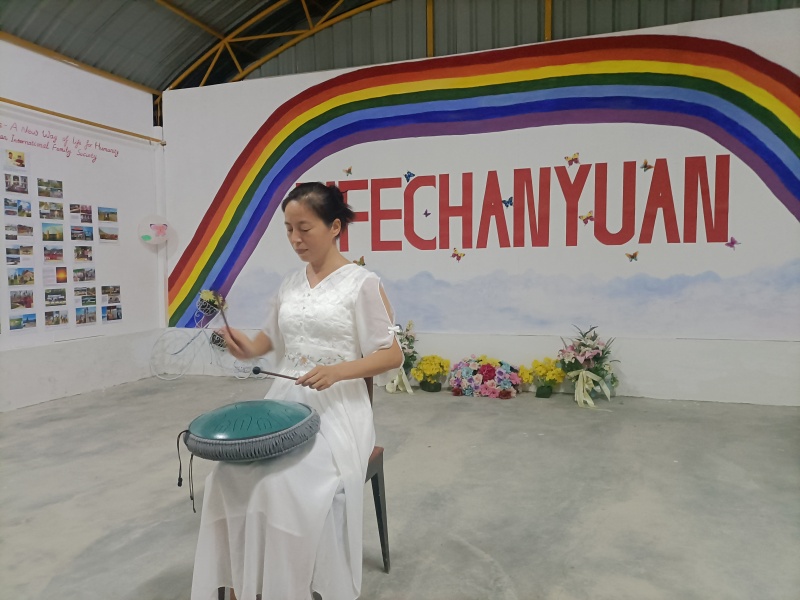
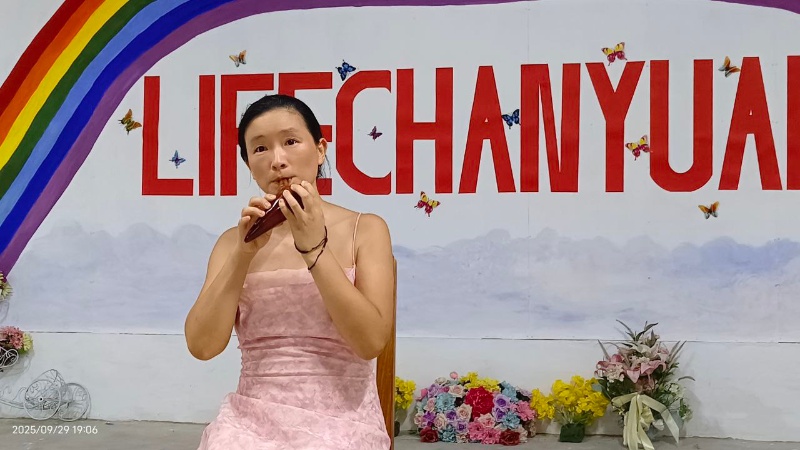
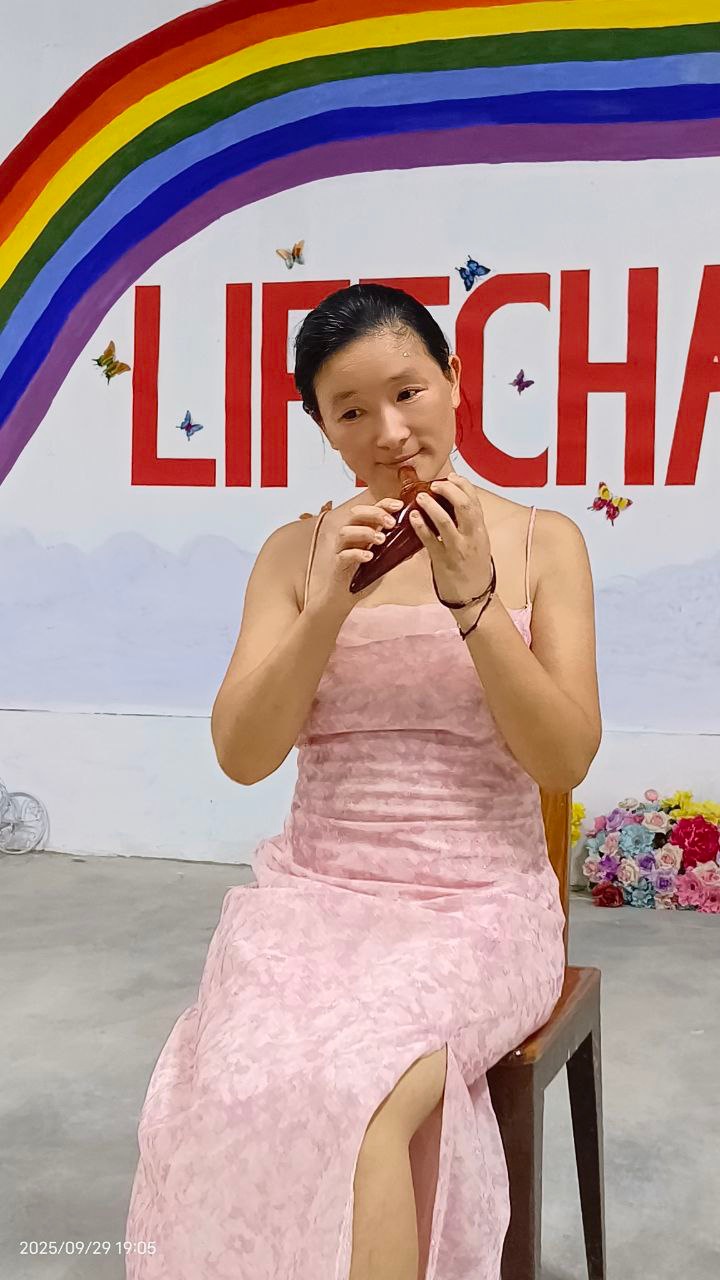
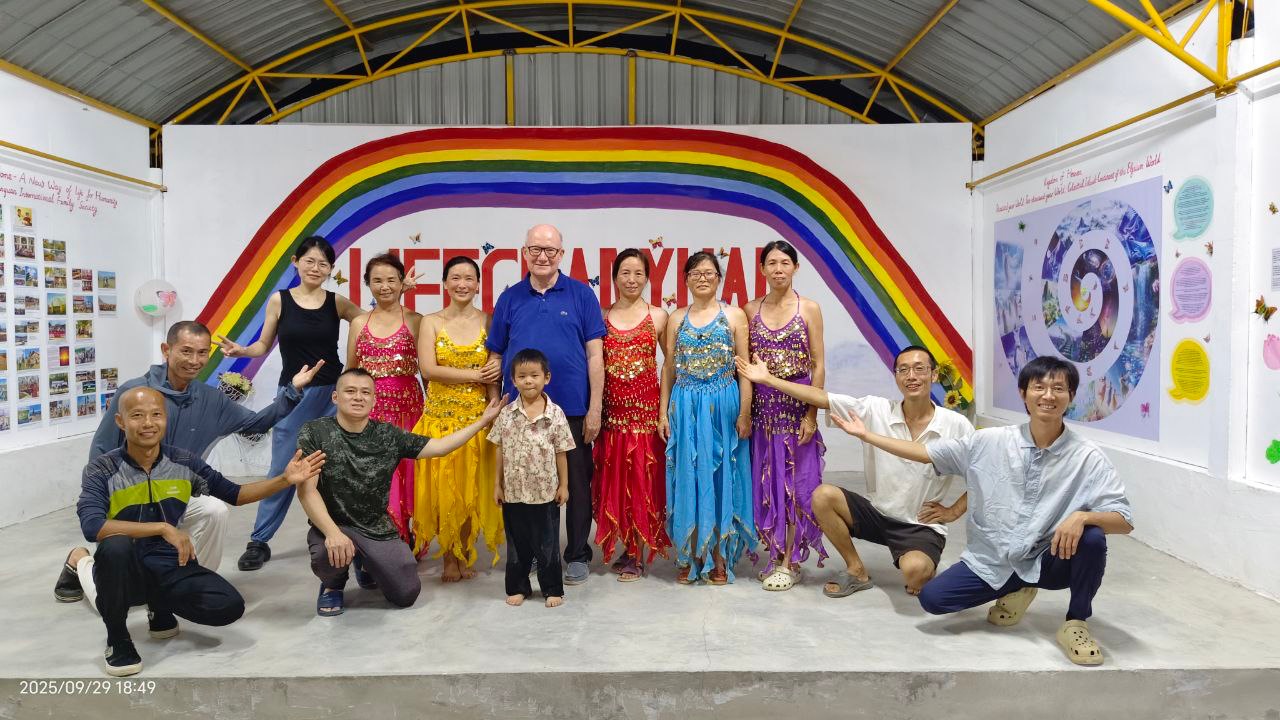
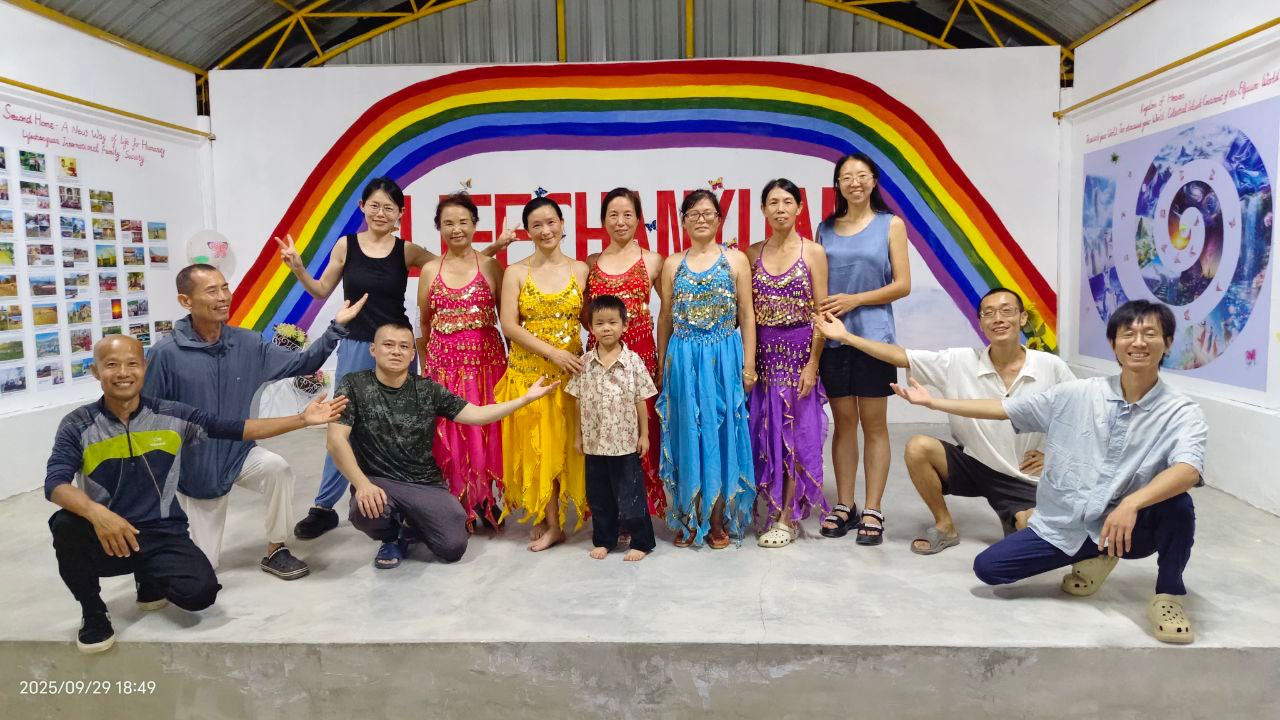
|